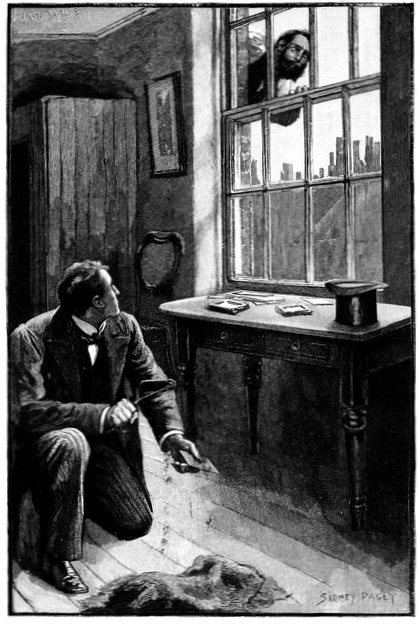
"MIRSKY WAS STARING STRAIGHT AT ME."
(See page 571.)
The cover image was created by the transcriber and is placed in the public domain.
EDITED BY GEORGE NEWNES
Vol VII., Issue 42.
June, 1894
Martin Hewitt, Investigator.
Illustrated Interviews.
The Queen's Yacht.
Light.
Zig-zags at the Zoo.
Stories from the Diary of a Doctor.
Portraits of Celebrities at Different Times of their Lives.
Crimes and Criminals.
Beauties.
Count Ferdinand de Lesseps.
Some Interesting Pictures.
From Behind the Speaker's Chair.
The Iron Casket.
The Queer Side of Things.
Pal's Puzzle Page.
Index.
Transcriber's Notes.

"MIRSKY WAS STARING STRAIGHT AT ME."
(See page 571.)
By Arthur Morrison.
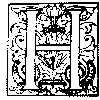
Hewitt was very apt, in conversation, to dwell upon the many curious chances and coincidences that he had observed, not only in connection with his own cases, but also in matters dealt with by the official police, with whom he was on terms of pretty regular and, indeed, friendly acquaintanceship. He has told me many an anecdote of singular happenings to Scotland Yard officials with whom he has exchanged experiences. Of Inspector Nettings, for instance, who spent many weary months in a search for a man wanted by the American Government, and in the end found, by the merest accident (a misdirected call), that the man had been lodging next door to himself the whole of the time; just as ignorant, of course, as was the inspector himself as to the enemy at the other side of the party-wall. Also of another inspector, whose name I cannot recall, who, having been given rather meagre and insufficient details of a man whom he anticipated having great difficulty in finding, went straight down the stairs of the office where he had received instructions, and actually fell over the man near the door, where he had stooped down to tie his shoe-lace! There were cases, too, in which, when a great and notorious crime had been committed and various persons had been arrested on suspicion, some were found among them who had long been badly wanted for some other crime altogether. Many criminals had met their deserts by venturing out of their own particular line of crime into another: often a man who got into trouble over something comparatively small, found himself in for a startlingly larger trouble, the result of some previous misdeed that otherwise would have gone unpunished. The rouble note-forger, Mirsky, might never have been handed over to the Russian authorities had he confined his genius to forgery alone. It was generally supposed at the time of his extradition that he had communicated with the Russian Embassy, with a view to giving himself up—a foolish proceeding on his part, it would seem, since his whereabouts, indeed, even his identity as the forger, had not been suspected. He had communicated with the Russian Embassy, it is true, but for quite a different purpose, as Martin Hewitt well understood at the time. What that purpose was is now for the first time published.
The time was half-past one in the afternoon, and Hewitt sat in his inner office examining and comparing the handwriting of two letters by the aid of a large lens. He put down the lens and glanced at the clock on the mantelpiece with a premonition of lunch; and as he did so his clerk quietly entered the room with one of those printed slips which were kept for the announcement of unknown visitors. It was filled up in a hasty and almost illegible hand thus:—
Name of visitor: F. Graham Dixon.
Address: Chancery Lane.
Business: Private and urgent.
"Show Mr. Dixon in," said Martin Hewitt.
Mr. Dixon was a gaunt, worn-looking man of fifty or so, well although rather carelessly dressed, and carrying in his strong though drawn face and dullish eyes the look that characterizes the life-long strenuous brain-worker. He leaned forward anxiously in the chair which Hewitt offered him, and told his story with a great deal of very natural agitation.
"You may possibly have heard, Mr. Hewitt—I know there are rumours—of the new locomotive torpedo which the Government is about adopting; it is, in fact, the Dixon torpedo, my own invention; and in every respect—not merely in my own opinion, but in that of the Government experts—by far the most efficient and certain yet produced. It will travel at least four hundred yards farther than any torpedo now made, with perfect accuracy of aim (a very great desideratum, let me tell you), and will carry an unprecedentedly heavy charge. There are other advantages, speed, simple discharge, and so forth, that I needn't bother you about. The machine is the result of many years of work and disappointment, and its design has only been arrived at by a careful balancing of principles and means, which are expressed on the only four existing sets of drawings. The whole thing, I need hardly tell you, is a profound secret, and you may judge of my present state of mind when I tell you that one set of drawings has been stolen."
"From your house?"
"From my office, in Chancery Lane, this morning. The four sets of drawings were distributed thus: Two were at the Admiralty Office, one being a finished set on thick paper, and the other a set of tracings therefrom; and the other two were at my own office, one being a pencilled set, uncoloured—a sort of finished draft, you understand—and the other a set of tracings similar to those at the Admiralty. It is this last set that has gone. The two sets were kept together in one drawer in my room. Both were there at ten this morning, of that I am sure, for I had to go to that very drawer for something else, when I first arrived. But at twelve the tracings had vanished."
"You suspect somebody, probably?"
"I cannot. It is a most extraordinary thing. Nobody has left the office (except myself, and then only to come to you) since ten this morning, and there has been no visitor. And yet the drawings are gone!"
"But have you searched the place?"
"Of course I have. It was twelve o'clock when I first discovered my loss, and I have been turning the place upside down ever since—I and my assistants. Every drawer has been emptied, every desk and table turned over, the very carpet and linoleum have been taken up, but there is not a sign of the drawings. My men even insisted on turning all their pockets inside out, although I never for a moment suspected either of them, and it would take a pretty big pocket to hold the drawings, doubled up as small as they might be."
"You say your men—there are two, I understand—had neither left the office?"
"Neither; and they are both staying in now. Worsfold suggested that it would be more satisfactory if they did not leave till something was done towards clearing the mystery up, and although, as I have said, I don't suspect either in the least, I acquiesced."
"Just so. Now—I am assuming that you wish me to undertake the recovery of these drawings?"
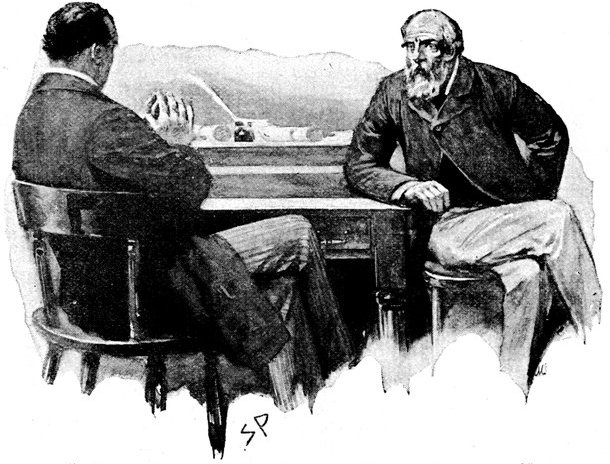
"YOU WISH ME TO UNDERTAKE THE RECOVERY OF THESE DRAWINGS?"
The engineer nodded hastily.
"Very good; I will go round to your office. But first perhaps you can tell me something about your assistants; something it might be awkward to tell me in their presence, you know. Mr. Worsfold, for instance?"
"He is my draughtsman—a very excellent and intelligent man, a very smart man, indeed, and, I feel sure, quite beyond suspicion. He has prepared many important drawings for me (he has been with me nearly ten years now), and I have always found him trustworthy. But, of course, the temptation in this case would be enormous. Still, I cannot suspect Worsfold. Indeed, how can I suspect anybody in the circumstances?"
"The other, now?"
"His name's Ritter. He is merely a tracer, not a fully skilled draughtsman. He is quite a decent young fellow, and I have had him two years. I don't consider him particularly smart, or he would have learned a little more of his business by this time. But I don't see the least reason to suspect him. As I said before, I can't reasonably suspect anybody."
"Very well; we will get to Chancery Lane now, if you please, and you can tell me more as we go."
"I have a cab waiting. What else can I tell you?"
"I understand the position to be succinctly this: the drawings were in the office when you arrived. Nobody came out, and nobody went in; and yet they vanished. Is that so?"
"That is so. When I say that absolutely[Pg 565] nobody came in, of course I except the postman. He brought a couple of letters during the morning. I mean that absolutely nobody came past the barrier in the outer office—the usual thing, you know, like a counter, with a frame of ground glass over it."
"I quite understand that. But I think you said that the drawings were in a drawer in your own room—not the outer office, where the draughtsmen are, I presume?"
"That is the case. It is an inner room, or, rather, a room parallel with the other, and communicating with it; just as your own room is, which we have just left."
"But then, you say you never left your office, and yet the drawings vanished—apparently by some unseen agency—while you were there, in the room?"
"Let me explain more clearly." The cab was bowling smoothly along the Strand, and the engineer took out a pocket-book and pencil. "I fear," he proceeded, "that I am a little confused in my explanation—I am naturally rather agitated. As you will see presently, my offices consist of three rooms, two at one side of a corridor, and the other opposite: thus." He made a rapid pencil sketch.

"In the outer office my men usually work. In the inner office I work myself. These rooms communicate, as you see, by a door. Our ordinary way in and out of the place is by the door of the outer office leading into the corridor, and we first pass through the usual lifting flap in the barrier. The door leading from the inner office to the corridor is always kept locked on the inside, and I don't suppose I unlock it once in three months. It has not been unlocked all the morning. The drawer in which the missing drawings were kept, and in which I saw them at ten o'clock this morning, is at the place marked D—it is a large chest of shallow drawers, in which the plans lie flat."
"I quite understand. Then there is the private room opposite. What of that?"
"That is a sort of private sitting-room that I rarely use, except for business interviews of a very private nature. When I said I never left my office I did not mean that I never stirred out of the inner office. I was about in one room and another, both the outer and the inner offices, and once I went into the private room for five minutes, but nobody came either in or out of any of the rooms at that time, for the door of the private room was wide open and I was standing at the book-case (I had gone to consult a book), just inside the door, with a full view of the doors opposite. Indeed, Worsfold was at the door of the outer office most of the short time. He came to ask me a question."
"Well," Hewitt replied, "it all comes to the simple first statement. You know that nobody left the place or arrived, except the postman, who couldn't get near the drawings, and yet the drawings went. Is this your office?"
The cab had stopped before a large stone building. Mr. Dixon alighted and led the way to the first floor. Hewitt took a casual glance round each of the three rooms. There was a sort of door in the frame of ground glass over the barrier, to admit of speech with visitors. This door Hewitt pushed wide open, and left so.
He and the engineer went into the inner office. "Would you like to ask Worsfold and Ritter any questions?" Mr. Dixon inquired.
"Presently. Those are their coats, I take it, hanging just to the right of the outer office door, over the umbrella stand?"
"Yes, those are all their things—coats, hats, stick, and umbrella."
"And those coats were searched, you say?"
"Yes."
"And this is the drawer—thoroughly searched, of course?"
"Oh, certainly, every drawer was taken out and turned over."
"Well, of course, I must assume you made no mistake in your hunt. Now tell me, did[Pg 566] anybody know where these plans were, beyond yourself and your two men?"

"I WAS STANDING AT THE BOOKCASE."
"As far as I can tell, not a soul."
"You don't keep an office-boy?"
"No. There would be nothing for him to do except to post a letter now and again, which Ritter does quite well for."
"As you are quite sure that the drawings were there at ten o'clock, perhaps the thing scarcely matters. But I may as well know if your men have keys of the office?"
"Neither. I have patent locks to each door and I keep all the keys myself. If Worsfold or Ritter arrive before me in the morning, they have to wait to be let in; and I am always present myself when the rooms are cleaned. I have not neglected precautions, you see."
"No. I suppose the object of the theft—assuming it is a theft—is pretty plain: the thief would offer the drawings for sale to some foreign Government?"
"Of course. They would probably command a great sum. I have been looking, as I need hardly tell you, to that invention to secure me a very large fortune, and I shall be ruined, indeed, if the design is taken abroad. I am under the strictest engagements to secrecy with the Admiralty, and not only should I lose all my labour, but I should lose all the confidence reposed in me at headquarters should, in fact, be subject to penalties for breach of contract, and my career stopped for ever. I cannot tell you what a serious business this is for me. If you cannot help me, the consequences will be terrible. Bad for the service of the country, too, of course."
"Of course. Now tell me this. It would, I take it, be necessary for the thief to exhibit these drawings to anybody anxious to buy the secret—I mean, he couldn't describe the invention by word of mouth?"
"Oh, no, that would be impossible. The drawings are of the most complicated description, and full of figures upon which the whole thing depends. Indeed, one would have to be a skilled expert properly to appreciate the design at all. Various principles of hydrostatics, chemistry, electricity, and pneumatics are most delicately manipulated and adjusted, and the smallest error or omission in any part would upset the whole. No, the drawings are necessary to the thing, and they are gone."
At this moment the door of the outer office was heard to open, and somebody entered. The door between the two offices was ajar, and Hewitt could see right through to the glass door left open over the barrier, and into the space beyond. A well-dressed, dark, bushy-bearded man stood there carrying a hand-bag, which he placed on the ledge before him. Hewitt raised his hand to enjoin silence. The man spoke in a rather high-pitched voice and with a slight accent. "Is Mr. Dixon now within?" he asked.
"He is engaged," answered one of the draughtsmen; "very particularly engaged. I'm afraid you won't be able to see him this afternoon. Can I give him any message?"
"This is two—the second time I have come to-day. Not two hours ago Mr. Dixon himself tells me to call again. I have a very important—very excellent steam-packing to show him that is very cheap and the best of the market." The man tapped his bag. "I have just taken orders from the largest railway companies. Cannot I see him, for one second only? I will not detain him."
"Really, I'm sure you can't this afternoon—he isn't seeing anybody. But if you'll leave your name——"
"My name is Hunter; but what the good of that? He ask me to call a little later and I come, and now he is engaged. It is a very great pity." And the man snatched up his bag and walking-stick and stalked off indignantly.
Hewitt stood still, gazing through the small aperture in the doorway.
"You'd scarcely expect a man with such a name as Hunter to talk with that accent, would you?" he observed, musingly. "It isn't a French accent, nor a German; but it seems foreign. You don't happen to know him, I suppose?"
"No, I don't. He called here about half-past twelve, just while we were in the middle of our search and I was frantic over the loss of the drawings. I was in the outer office myself, and told him to call later. I have lots of such agents here, anxious to sell all sorts of engineering appliances. But what will you do now? Shall you see my men?"
"I think," said Hewitt, rising, "I think I'll get you to question them yourself."
"Myself?"
"Yes, I have a reason. Will you trust me with the key of the private room opposite? I will go over there for a little, while you talk to your men in this room. Bring them in here and shut the door—I can look after the office from across the corridor, you know. Ask them each to detail his exact movements about the office this morning, and get them to recall each visitor who has been here from the beginning of the week. I'll let you know the reason of this later. Come across to me in a few minutes."
Hewitt took the key and passed through the outer office into the corridor.
Ten minutes later, Mr. Dixon, having questioned his draughtsmen, followed him. He found Hewitt standing before the table in the private room, on which lay several drawings on tracing-paper.
"See here, Mr. Dixon," said Hewitt, "I think these are the drawings you are anxious about?"
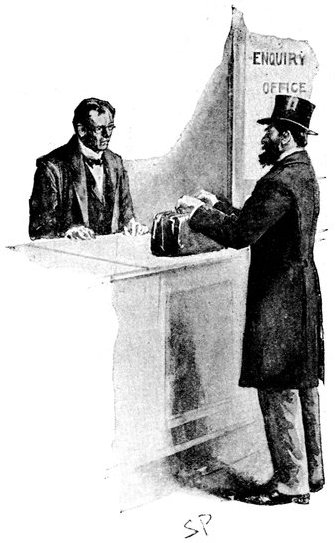
"MY NAME IS HUNTER."
The engineer sprang toward them with a cry of delight. "Why, yes, yes," he exclaimed, turning them over, "every one of them. But where—how—they must have been in the place after all, then? What a fool I have been!"
Hewitt shook his head. "I'm afraid you're not quite so lucky as you think, Mr. Dixon," he said. "These drawings have most certainly been out of the house for a little while. Never mind how—we'll talk of that after. There is no time to lose. Tell me, how long would it take a good draughtsman to copy them?"
"They couldn't possibly be traced over properly in less than two or two and a half long days of very hard work," Dixon replied, with eagerness.
"Ah! then, it is as I feared. These tracings have been photographed, Mr. Dixon, and our task is one of every possible difficulty. If they had been copied in the ordinary way, one might hope to get hold of the copy. But photography upsets everything. Copies can be multiplied with such amazing facility that, once the thief gets a decent start, it is almost hopeless to checkmate him. The only chance is to get at the negatives before copies are taken. I must act at once; and I fear, between ourselves, it may be necessary for me to step very distinctly over the line of the law in the matter. You see, to get at those negatives may involve something very like housebreaking. There must be no delay—no waiting for legal procedure—or the mischief is done. Indeed, I very much question whether you have any legal remedy, strictly speaking."
"Mr. Hewitt, I implore you, do what you can. I need not say that all I have is at your disposal. I will guarantee to hold you harmless for anything that may happen. But do, I entreat you, do everything possible. Think of what the consequences may be!"
"Well, yes, so I do," Hewitt remarked, with a smile. "The consequences to me, if I were charged with housebreaking, might be something that no amount of guarantee could mitigate. However, I will do what I can, if only from patriotic motives. Now, I must see your tracer, Ritter. He is the traitor in the camp."
"Ritter? But how?"
"Never mind that now. You are upset and agitated, and had better not know more than necessary for a little while, in case you say or do something unguarded. With Ritter I must take a deep course; what I don't know I must appear to know, and that will seem more likely to him if I disclaim acquaintance with what I do know. But first put these tracings safely away out of sight."
Dixon slipped them behind his book-case.
"Now," Hewitt pursued, "call Mr. Worsfold and give him something to do that will keep him in the inner office across the way, and tell him to send Ritter here."
Mr. Dixon called his chief draughtsman and requested him to put in order the drawings in the drawers of the inner room that had been disarranged by the search, and to send Ritter, as Hewitt had suggested.
Ritter walked into the private room, with an air of respectful attention. He was a puffy-faced, unhealthy-looking young man, with very small eyes and a loose, mobile mouth.

"SIT DOWN, MR. RITTER."
"Sit down, Mr. Ritter," Hewitt said, in a stern voice. "Your recent transactions with your friend, Mr. Hunter, are well known both to Mr. Dixon and myself."
Ritter, who had at first leaned easily back in his chair, started forward at this, and paled.
"You are surprised, I observe; but you should be more careful in your movements out of doors if you do not wish your acquaintances to be known. Mr. Hunter, I believe, has the drawings which Mr. Dixon has lost, and, if so, I am certain that you have given them to him. That, you know, is theft, for which the law provides a severe penalty."
Ritter broke down completely and turned appealingly to Mr. Dixon:—
"Oh, sir," he pleaded, "it isn't so bad, I assure you. I was tempted, I confess, and hid the drawings; but they are still in the office, and I can give them to you—really, I can."
"Indeed?" Hewitt went on. "Then, in that case, perhaps you'd better get them at once. Just go and fetch them in—we won't trouble to observe your hiding-place. I'll only keep this door open, to be sure you don't lose your way, you know—down the stairs, for instance."
The wretched Ritter, with hanging head, slunk into the office opposite. Presently he reappeared, looking, if possible, ghastlier than before. He looked irresolutely down the corridor, as if meditating a run for it, but Hewitt stepped toward him and motioned him back to the private room.
"You mustn't try any more of that sort of humbug," Hewitt said, with increased severity. "The drawings are gone, and you have stolen them—you know that well enough. Now attend to me. If you received your deserts, Mr. Dixon would send for a policeman this moment, and have you hauled off to the gaol that is your proper place. But, unfortunately, your accomplice, who calls himself Hunter—but who has other names beside that, as I happen to know—has the drawings, and it is absolutely[Pg 569] necessary that these should be recovered. I am afraid that it will be necessary, therefore, to come to some arrangement with this scoundrel—to square him, in fact. Now, just take that pen and paper, and write to your confederate as I dictate. You know the alternative if you cause any difficulty."
Ritter reached tremblingly for the pen.
"Address him in your usual way," Hewitt proceeded. "Say this: 'There has been an alteration in the plans.' Have you got that? 'There has been an alteration in the plans. I shall be alone here at six o'clock. Please come, without fail.' Have you got it? Very well, sign it, and address the envelope. He must come here, and then we may arrange matters. In the meantime, you will remain in the inner office opposite."
The note was written, and Martin Hewitt, without glancing at the address, thrust it into his pocket. When Ritter was safely in the inner office, however, he drew it out and read the address. "I see," he observed, "he uses the same name, Hunter; 27, Little Carton Street, Westminster, is the address, and there I shall go at once with the note. If the man comes here, I think you had better lock him in with Ritter, and send for a policeman—it may at least frighten him. My object is, of course, to get the man away, and then, if possible, to invade his house, in some way or another, and steal or smash his negatives if they are there and to be found. Stay here, in any case, till I return. And don't forget to lock up those tracings."
It was about six o'clock when Hewitt returned, alone, but with a smiling face that told of good fortune at first sight.
"First, Mr. Dixon," he said, as he dropped into an easy chair in the private room, "let me ease your mind by the information that I have been most extraordinarily lucky—in fact, I think you have no further cause for anxiety. Here are the negatives. They were not all quite dry when I—well, what?—stole them, I suppose I must say; so that they have stuck together a bit, and probably the films are damaged. But you don't mind that, I suppose?"
He laid a small parcel, wrapped in newspaper, on the table. The engineer hastily tore away the paper and took up five or six glass photographic negatives, of the half-plate size, which were damp, and stuck together by the gelatine films, in couples. He held them, one after another, up to the light of the window, and glanced through them. Then, with a great sigh of relief, he placed them on the hearth and pounded them to dust and fragments with the poker.
For a few seconds neither spoke. Then Dixon, flinging himself into a chair, said:—
"Mr. Hewitt, I can't express my obligation to you. What would have happened if you had failed I prefer not to think of. But what shall we do with Ritter now? The other man hasn't been here yet, by-the-bye."
"No—the fact is, I didn't deliver the letter. The worthy gentleman saved me a world of trouble by taking himself out of the way." Hewitt laughed. "I'm afraid he has rather got himself into a mess by trying two kinds of theft at once, and you may not be sorry to hear that his attempt on your torpedo plans is likely to bring him a dose of penal servitude for something else. I'll tell you what has happened.
"Little Carton Street, Westminster, I found to be a seedy sort of place—one of those old streets that have seen much better days. A good many people seem to live in each house—they are fairly large houses, by the way—and there is quite a company of bell-handles on each doorpost—all down the side, like organ-stops. A barber had possession of the ground-floor front of No. 27 for trade purposes, so to him I went. 'Can you tell me,' I said, 'where in this house I can find Mr. Hunter?' He looked doubtful, so I went on: 'His friend will do, you know—I can't think of his name; foreign gentleman, dark, with a bushy beard.'
"The barber understood at once. 'Oh, that's Mirsky, I expect,' he said. 'Now I come to think of it, he has had letters addressed to Hunter once or twice—I've took 'em in. Top floor back.'
"This was good, so far. I had got at 'Mr. Hunter's' other alias. So, by way of possessing him with the idea that I knew all about him, I determined to ask for him as Mirsky, before handing over the letter addressed to him as Hunter. A little bluff of that sort is invaluable at the right time. At the top floor back I stopped at the door and tried to open it at once, but it was locked. I could hear somebody scuttling about within, as though carrying things about, and I knocked again. In a little while the door opened about a foot, and there stood Mr. Hunter—or Mirsky, as you like—the man who, in the character of a traveller in steam-packing, came here twice to-day. He was in his shirt sleeves and cuddled something under his arm, hastily covered with a spotted pocket-handkerchief.
"'I have called to see M. Mirsky,' I said, 'with a confidential letter ——.'
"'Oh, yas, yas,' he answered, hastily; 'I know—I know. Excuse me one minute.' And he rushed off downstairs with his parcel.
"Here was a noble chance. For a moment I thought of following him, in case there might be anything interesting in the parcel. But I had to decide in a moment, and I decided on trying the room. I slipped inside the door, and, finding the key on the inside, locked it. It was a confused sort of room, with a little iron bedstead in one corner and a sort of rough boarded inclosure in another. This I rightly conjectured to be the photographic darkroom, and made for it at once.
"There was plenty of light within when the door was left open, and I made at once for the drying-rack that was fastened over the sink. There were a number of negatives in it, and I began hastily examining them one after another. In the middle of this, our friend Mirsky returned and tried the door. He rattled violently at the handle and pushed. Then he called.
"At this moment I had come upon the first of the negatives you have just smashed. The fixing and washing had evidently only lately been completed, and the negative was drying on the rack. I seized it, of course, and the others which stood by it.
"'Who are you, there, inside?' Mirsky shouted indignantly from the landing. 'Why for you go in my room like that? Open this door at once, or I call the police!'
"I took no notice. I had got the full number of negatives, one for each drawing, but I was not by any means sure that he had not taken an extra set; so I went on hunting down the rack. There were no more, so I set to work to turn out all the undeveloped plates. It was quite possible, you see, that the other set, if it existed, had not yet been developed.
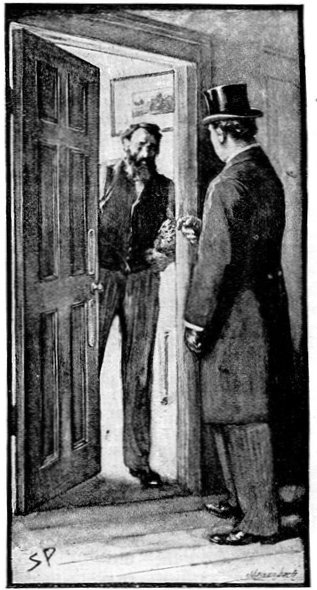
"I HAVE CALLED TO SEE M. MIRSKY."
"Mirsky changed his tune. After a little more banging and shouting, I could hear him kneel down and try the keyhole. I had left the key there, so that he could see nothing. But he began talking softly and rapidly through the hole in a foreign language. I did not know it in the least, but I believe it was Russian. What had led him to believe I understood Russian I could not at the time imagine, though I have a notion now. I went on ruining his stock of plates. I found several boxes, apparently of new plates, but, as there was no means of telling whether they were really unused or were merely undeveloped, but with the chemical impress of your drawings on them, I dragged every one ruthlessly from its hiding-place and laid it out in the full glare of the sunlight—destroying it thereby, of course, whether it was unused or not.
"Mirsky left off talking, and I heard him quietly sneaking off. Perhaps his conscience was not sufficiently clear to warrant an appeal to the police, but it seemed to me rather probable at the time that that was what he was going for. So I hurried on with my work. I found three dark slides—the parts that carry the plates in the back of the camera, you know—one of them fixed in the camera itself. These I opened, and exposed the plates to ruination as before. I suppose nobody ever did so much devastation in a photographic studio in ten minutes as I managed.
"I had spoilt every plate I could find and had the developed negatives safely in my pocket, when I happened to glance at a porcelain washing-well under the sink. There was one negative in that, and I took it up. It was not a negative of a drawing[Pg 571] of yours, but of a Russian twenty-rouble note!

"HE BEGAN TALKING SOFTLY AND RAPIDLY."
"This was a discovery. The only possible reason any man could have for photographing a bank-note was the manufacture of an etched plate for the production of forged copies. I was almost as pleased as I had been at the discovery of your negatives. He might bring the police now as soon as he liked; I could turn the tables on him completely. I began to hunt about for anything else relating to this negative.
"I found an inking-roller, some old pieces of blanket (used in printing from plates), and in a corner on the floor, heaped over with newspapers and rubbish, a small copying-press. There was also a dish of acid, but not an etched plate or a printed note to be seen. I was looking at the press, with the negative in one hand and the inking-roller in the other, when I became conscious of a shadow across the window. I looked up quickly, and there was Mirsky, hanging over from some ledge or projection to the side of the window, and staring straight at me, with a look of unmistakable terror and apprehension.
"The face vanished immediately. I had to move a table to get at the window, and by the time I had opened it, there was no sign or sound of the rightful tenant of the room. I had no doubt now of his reason for carrying a parcel downstairs. He probably mistook me for another visitor he was expecting, and, knowing he must take this visitor into his room, threw the papers and rubbish over the press, and put up his plates and papers in a bundle and secreted them somewhere downstairs, lest his occupation should be observed.
"Plainly, my duty now was to communicate with the police. So, by the help of my friend the barber downstairs, a messenger was found and a note sent over to Scotland Yard. I awaited, of course, for the arrival of the police, and occupied the interval in another look round—finding nothing important, however. When the official detective arrived he recognised at once the importance of the case. A large number of forged Russian notes have been put into circulation on the Continent lately, it seems, and it was suspected that they came from London. The Russian Government have been sending urgent messages to the police here on the subject.
"Of course I said nothing about your business; but while I was talking with the Scotland Yard man a letter was left by a messenger, addressed to Mirsky. The letter will be examined, of course, by the proper authorities, but I was not a little interested to perceive that the envelope bore the Russian Imperial arms above the words, 'Russian Embassy.' Now, why should Mirsky communicate with the Russian Embassy? Certainly not to let the officials know that he was carrying on a very extensive and lucrative business in the manufacture of spurious Russian notes. I think it is rather more than possible that he wrote—probably before he actually got your drawings—to say that he could sell information of the highest importance, and that this letter was a reply. Further, I think it quite possible that, when I asked for him by his Russian name and spoke of 'a confidential letter,' he at once concluded that I had come from the Embassy in answer to his letter. That would account for his addressing me in Russian through the keyhole; and, of course, an official from the Russian Embassy would be the very last person[Pg 572] in the world whom he would like to observe any indications of his little etching experiments. But anyhow, be that as it may," Hewitt concluded, "your drawings are safe now, and if once Mirsky is caught—and I think it likely, for a man in his shirt-sleeves, with scarcely any start and, perhaps, no money about him, hasn't a great chance to get away—if he is caught, I say, he will probably get something handsome at St. Petersburg in the way of imprisonment, or Siberia, or what-not; so that you will be amply avenged."
"Yes, but I don't at all understand this business of the drawings even now. How in the world were they taken out of the place, and how in the world did you find it out?"
"Nothing could be simpler; and yet the plan was rather ingenious. I'll tell you exactly how the thing revealed itself to me. From your original description of the case, many people would consider that an impossibility had been performed. Nobody had gone out and nobody had come in, and yet the drawings had been taken away. But an impossibility is an impossibility after all, and as drawings don't run away of themselves, plainly somebody had taken them, unaccountable as it might seem. Now, as they were in your inner office, the only people who could have got at them beside yourself were your assistants, so that it was pretty clear that one of them, at least, had something to do with the business. You told me that Worsfold was an excellent and intelligent draughtsman. Well, if such a man as that meditated treachery, he would probably be able to carry away the design in his head—at any rate, a little at a time—and would be under no necessity to run the risk of stealing a set of the drawings. But Ritter, you remarked, was an inferior sort of man, 'not particularly smart,' I think, were your words—only a mechanical sort of tracer. He would be unlikely to be able to carry in his head the complicated details of such designs as yours, and, being in a subordinate position, and continually overlooked, he would find it impossible to make copies of the plans in the office. So that, to begin with, I thought I saw the most probable path to start on.
"When I looked round the rooms I pushed open the glass door of the barrier and left the door to the inner office ajar, in order to be able to see anything that might happen in any part of the place, without actually expecting any definite development. While we were talking, as it happened, our friend Mirsky (or Hunter—as you please) came into the outer office, and my attention was instantly called to him by the first thing he did. Did you notice anything peculiar yourself?"
"No, really I can't say I did. He seemed to behave much as any traveller or agent might."
"Well, what I noticed was the fact that as soon as he entered the place he put his walking-stick into the umbrella stand, over there by the door, close by where he stood; a most unusual thing for a casual caller to do, before even knowing whether you were in. This made me watch him closely. I perceived, with increased interest, that the stick was exactly of the same kind and pattern as one already standing there; also a curious thing. I kept my eyes carefully on those sticks, and was all the more interested and edified to see, when he left, that he took the other stick—not the one he came with—from the stand, and carried it away, leaving his own behind. I might have followed him, but I decided that more could be learnt by staying—as, in fact, proved to be the case. This, by-the-bye, is the stick he carried away with him. I took the liberty of fetching it back from Westminster, because I conceive it to be Ritter's property."
Hewitt produced the stick. It was an ordinary, thick Malacca cane, with a buckhorn handle and a silver band. Hewitt bent it across his knee, and laid it on the table.
"Yes," Dixon answered, "that is Ritter's stick. I think I have often seen it in the stand. But what in the world——"
"One moment; I'll just fetch the stick Mirsky left behind." And Hewitt stepped across the corridor.
He returned with another stick, apparently an exact facsimile of the other, and placed it by the side of the other.
"When your assistants went into the inner room, I carried this stick off for a minute or two. I knew it was not Worsfold's, because there was an umbrella there with his initial on the handle. Look at this."
Martin Hewitt gave the handle a twist, and rapidly unscrewed it from the top. Then it was seen that the stick was a mere tube of very thin metal, painted to appear like a Malacca cane.
"It was plain at once that this was no Malacca cane—it wouldn't bend. Inside it I found your tracings, rolled up tightly. You can get a marvellous quantity of thin tracing-paper into a small compass by tight rolling."
"And this—this was the way they were[Pg 573] brought back!" the engineer exclaimed. "I see that, clearly. But how did they get away? That's as mysterious as ever."
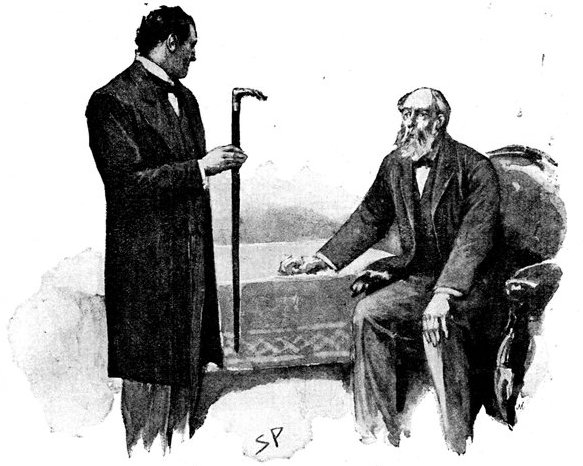
"HEWITT PRODUCED THE STICK."
"Not a bit of it. See here. Mirsky gets hold of Ritter, and they agree to get your drawings and photograph them. Ritter is to let his confederate have the drawings, and Mirsky is to bring them back as soon as possible, so that they shan't be missed for a moment. Ritter habitually carries this Malacca cane, and the cunning of Mirsky at once suggests that this tube should be made in outward facsimile. This morning, Mirsky keeps the actual stick and Ritter comes to the office with the tube. He seizes the first opportunity—probably when you were in this private room, and Worsfold was talking to you from the corridor—to get at the tracings, roll them up tightly, and put them in the tube, putting the tube back into the umbrella stand. At half-past twelve, or whenever it was, Mirsky turns up for the first time with the actual stick and exchanges them, just as he afterwards did when he brought the drawings back."
"Yes, but Mirsky came half an hour after they were—oh, yes, I see. What a fool I was! I was forgetting. Of course, when I first missed the tracings they were in this walking-stick, safe enough, and I was tearing my hair out within arm's reach of them!"
"Precisely. And Mirsky took them away before your very eyes. I expect Ritter was in a rare funk when he found that the drawings were missed. He calculated, no doubt, on your not wanting them for the hour or two they would be out of the office."
"How lucky that it struck me to jot a pencil-note on one of them! I might easily have made my note somewhere else, and then I should never have known that they had been away."
"Yes, they didn't give you any too much time to miss them. Well, I think the rest's pretty clear. I brought the tracings in here, screwed up the sham stick and put it back. You identified the tracings and found none missing, and then my course was pretty clear, though it looked difficult. I knew you would be very naturally indignant with Ritter, so, as I wanted to manage him myself, I told you nothing of what he had actually done, for fear that, in your agitated state, you might burst out with something that would spoil my game. To Ritter I pretended to know nothing of the return of the drawings or how they had been stolen—the only things I did know with certainty. But I did pretend to know all about Mirsky—or Hunter—when, as a matter of fact, I knew nothing at all, except that he probably went under more than one name. That put Ritter into my[Pg 574] hands completely. When he found the game was up he began with a lying confession. Believing that the tracings were still in the stick and that we knew nothing of their return, he said that they had not been away, and that he would fetch them—as I had expected he would. I let him go for them alone, and when he returned, utterly broken up by the discovery that they were not there, I had him altogether at my mercy. You see, if he had known that the drawings were all the time behind your book-case, he might have brazened it out, sworn that the drawings had been there all the time, and we could have done nothing with him. We couldn't have sufficiently frightened him by a threat of prosecution for theft, because there the things were, in your possession, to his knowledge.
"As it was, he answered the helm capitally: gave us Mirsky's address on the envelope, and wrote the letter that was to have got him out of the way while I committed burglary, if that disgraceful expedient had not been rendered unnecessary. On the whole, the case has gone very well."
"It has gone marvellously well, thanks to yourself. But what shall I do with Ritter?"
"Here's his stick—knock him downstairs with it, if you like. I should keep the tube, if I were you, as a memento. I don't suppose the respectable Mirsky will ever call to ask for it. But I should certainly kick Ritter out of doors—or out of window, if you like—without delay."
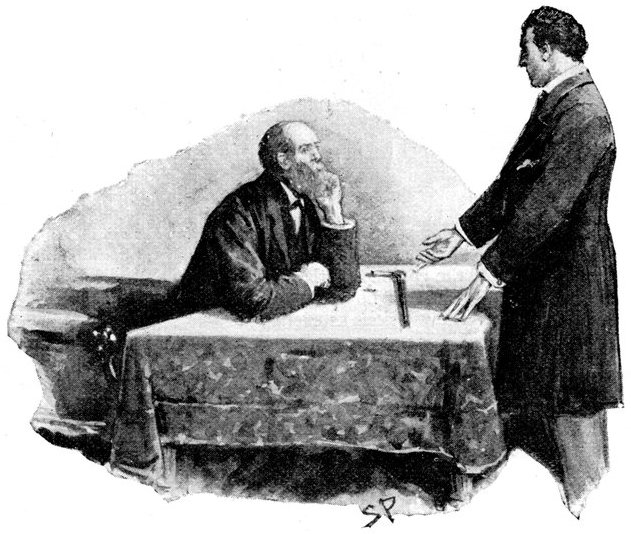
"KNOCK HIM DOWNSTAIRS."
Mirsky was caught, and after two remands at the police-court was extradited on the charge of forging Russian notes. It came out that he had written to the Embassy, as Hewitt had surmised, stating that he had certain valuable information to offer, and the letter which Hewitt had seen delivered was an acknowledgment, and a request for more definite particulars. This was what gave rise to the impression that Mirsky had himself informed the Russian authorities of his forgeries. His real intent was very different, but was never guessed.
"I wonder," Hewitt has once or twice observed, "whether, after all, it would not have paid the Russian authorities better on the whole if I had never investigated Mirsky's little note-factory. The Dixon torpedo was worth a good many twenty-rouble notes."
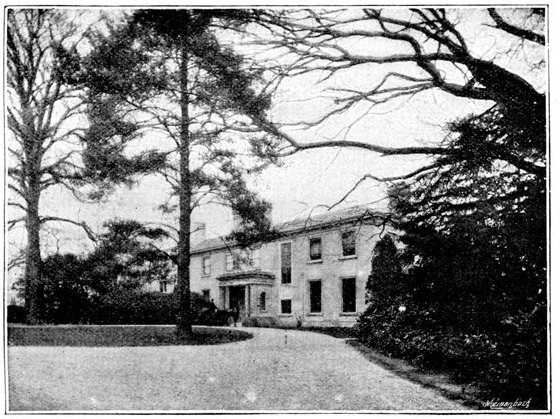
ARLINGTON MANOR
From a Photo by Elliott & Fry.
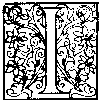
It would be difficult indeed to single out a more pleasant method of passing a couple of days than with Sir Francis Jeune, Lady Jeune, and their children. It was in the early days of spring that I had this privilege, when, for a brief time, Sir Francis was free from the trials and tribulations of the law, and, together with his family, was enjoying the rest afforded by a short sojourn at his charming house in Berkshire. About a couple of miles from Newbury—rich in reminiscence of the troublesome times associated with the Cromwellian régime—is Arlington Manor. It is a substantially-built country mansion—built of a peculiar species of Bath stone—and no matter from which of its four sides you view the outlook, it is "as fair as fair can be." From one side you can here and there catch sight of a streak of blue sky through a forest of fir trees; from another is a grand stretch of meadows, from which you may often hear the voice of young Francis Christian Seaforth Jeune—Sir Francis's son, who had for his godmother the Princess Christian, and is proud of the fact that he was entered for Harrow before he was four days old—shouting out "Well hit!" at a particularly good drive of the ball by the butler, who happens to be a capital cricketer. Perhaps, however, the view from the veranda is the finest. The lawn is immediately before you; a little series of valleys and hills rise and fall until all is lost in the blue line of hills miles away. It is an ideal spot, and one which must be peculiarly interesting to Sir Francis, owing to its being in the centre of a piece of country closely allied with a period of history in which he is so deeply read. Around the house golf links have been recently laid out. Sir Francis said that I should have been at Arlington and seen a match between Sir Evelyn Wood, Mr. Lockwood, and himself. "The General was the best player," he added, "or, perhaps, I should say, the least bad."
It was on this veranda—with the glorious scene before us—that I met Sir Francis and Lady Jeune. Lady Jeune's two daughters—Miss Madeline Stanley and Miss Dorothy Stanley—were enjoying their first game of croquet of the year. Lady Jeune has been twice married, her first husband being Mr. John Stanley, a brother of Lord Stanley of Alderley. After a time the two young girls joined us. I am well aware that this paper is[Pg 576] to be devoted to Sir Francis and Lady Jeune, but it is impossible to stay one's pen at this point from chronicling an impression formed regarding two of the brightest of sisters. It happened that during my stay at Newbury there was a gymnastic display in the town given by some young women of the class connected with the People's Palace—young women, doubtless, for the most part who know what it is to work, and work hard, for their living. They were entertained to tea at Arlington Manor. The anxiety of the Misses Stanley to make them happy was intense—nothing was forced about it, but all heart-born. I judged Lady Jeune's daughters from the semi-whispered invitations I could not help hearing to many of these young women to "Be sure and come and see us in London, won't you?"—repeated in one case, I know, half-a-dozen times. It is to be hoped that this expression will convey the full meaning with which it struck me.
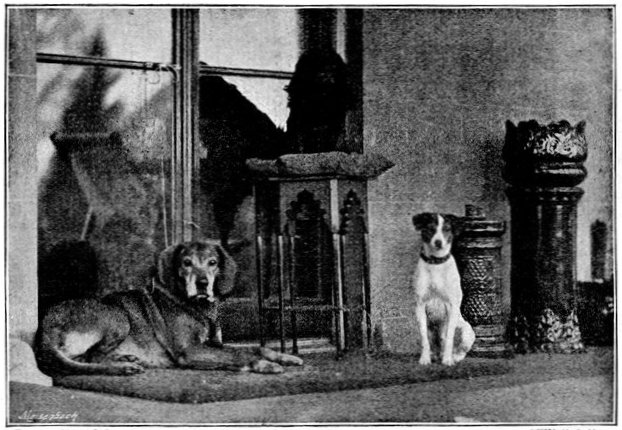
THE DOGS.
From a Photo by Elliott & Fry.
The interior of Arlington Manor is charmingly comfortable. Entering from the veranda—you will probably be followed by one of the quartette of dogs, and even "Randolph," the cat, who has the remarkable feasting record of thirty chickens in a fortnight to be placed to his credit!—you are in the billiard-room. Amongst the engravings of more modern days are those after Sir Joshua Reynolds, Long, and Briton Riviere; but the most noticeable is certainly a very fine set of Hogarth's "Marriage à la Mode." Sir Francis Jeune is a great admirer of Hogarth. Here, too, hangs his card of membership of the Athenæum Club, forming a perfect collection of autographs of as many of the most distinguished men of the day as could possibly get their names on the card which was to "back" Sir Francis's candidature. A huge volume here may be examined with interest. It contains no fewer than seven hundred letters of congratulation which its owner received—and faithfully answered every one—when he was appointed to the judicial vacancy in the Probate, Divorce, and Admiralty Division occasioned by the elevation of Sir James Hannen to the House of Lords. A smaller one is treasured which holds similar letters when Sir Francis was made President of the Division.

"RANDOLPH".
From a Photo by Elliott & Fry.
The hall—the entrance to which finds room for a magnificently carved oak cabinet—is very much like the gangway of a ship which leads to the saloon cabins. Indeed, it was constructed on this principle. A[Pg 577] former occupier of Arlington Manor being unable to get out of doors, and being nautically inclined, was wont to walk this hall and imagine he was on board. The first apartment on the right is the drawing-room. It is filled with flowers and portrait reminiscences of friends, whilst its pictures are admirable. There are two very fine pieces of mountain scenery by Lady Canning, a Prout, Loppe—and the old Dutch school is represented. Three pictures, however, are specially interesting. One is a grand Michiel van Mierevelt of Hugo Grotius, and given by him to Oliver Cromwell. It has only been in three or four hands, and was in the possession of an uncle of Sir Francis at the age of ninety-four, and he received it when quite young. It owes its exceptionally fine state of preservation to the fact that it has never been touched by the cleaner—it actually hung in one spot for over sixty years. The other two pictures are over the mantelpieces. One is a copy—the original being at Brahan Castle—of Lady Jeune's great-great-grandmother a daughter of Baron D'Aguilars, and, therefore, a Spanish Jewess, and the other is of Lady Jeune herself, by Miss Thompson.

THE OUTER HALL.
From a Photo by Elliot & Fry.
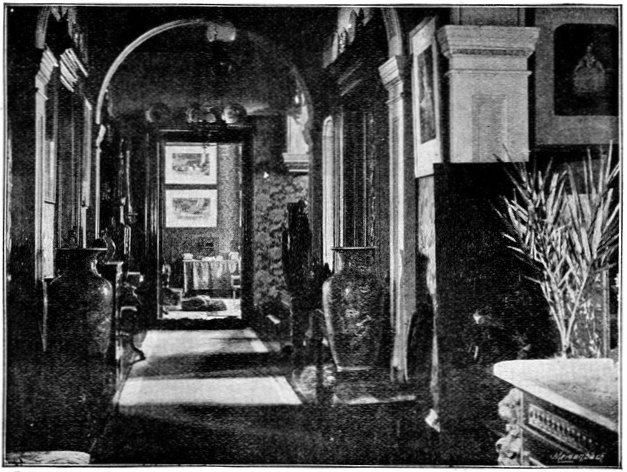
THE INNER HALL.
From a Photo by Elliot & Fry.
The dining-room is hung with some exquisite tapestry, and in the centre of the oaken mantel-board is a painting of the late Bishop of Peterborough, Sir Francis Jeune's father. Sir Francis's own room upstairs is a very pleasant corner of the house. On a table—in very official-looking boxes, and, indeed, the only suggestion of judicial duties about the place—are the various patents granted to the President, and also those belonging to his father—who was Dean of[Pg 578] Jersey, as well as filling the Episcopal See of Peterborough. Sir Francis merrily points out that the writ accompanying the patent making him a judge expresses in legal phraseology an invitation to pretermit all other business and go to Parliament.
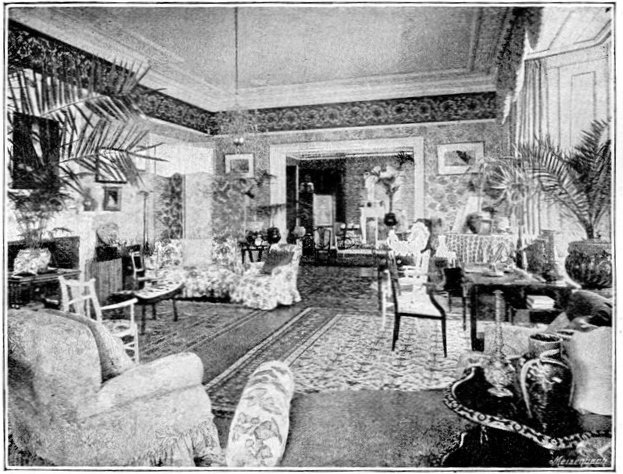
THE DRAWING ROOM.
From a Photo by Elliott & Fry.
"But they wouldn't let me in if I went there," he said.
There are a number of beautiful studies by Raphael here. Near the window is a book-case containing many of the prizes Sir Francis won at school and college. We look at them together. Sir Francis takes down from one of the shelves a small volume of "Dodd's Beauties of Shakespeare." It was given to him by Sir George Cornwall Lewis on the occasion of his tenth birthday.
"I value it," said Sir Francis, "because good nature is not a quality generally attributed to Sir George Cornwall Lewis."
There is much, very much, more to look at inside Arlington Manor—and one would like to refer at greater length to its many interior beauties; but the desire to take full advantage of the pleasant opportunity of having a talk with Sir Francis Jeune—and later on with Lady Jeune—leads one to hurry away from the apartments within and settle down in one of the wicker chairs on the veranda and listen to the quietly told story, and the impressive observations of the President of the Probate, Divorce, and Admiralty Division—at his country home.
Sir Francis Jeune is tall—his bearing is erect and stately. His hair is just turning grey—there is never a pleasant twinkle missing out of the immediate vicinity of his eyes. To watch Sir Francis in his court and to observe him in his home results in a conviction that his geniality and justness are as thorough and thoughtful in the one place as in the other. His temperament never seems to alter—he is always kind. He talks enthusiastically and generously about others—particularly his court officials—and quietly and modestly about himself. He has ideas, strong ideas, regarding the law's true administration and the best means of adapting it to the benefit of the public. But all his views are submitted gracefully—he never seeks to cram you with them or to say: "That's it, who can dispute what I say?" I have sat in his court and listened—I have occupied one of the wicker chairs on the veranda in front of the Hampshire Downs and listened, too. It has all amounted to the same thing. He is thoughtful and kind towards all men, both in his actions towards them and his ideas regarding them.
His first words to me, when we settled down to talk, were gratifying indeed.
"I have only been interviewed once before," he said, "and that was only on a small question."
"It is a big one now, Sir Francis—your life."
"Well, it was whilst my father was Dean of Jersey that I was born—on the 17th March, 1843. Though my early years were passed in the atmosphere of the Church, I was never clerically inclined. I was always intended for the Bar, and perhaps it was owing to my parentage that I acquired a practice in ecclesiastical law almost as soon as I was called. My first school was at Mr. Powle's, at Blackheath; then I went to Mr. Penrose's, at Exmouth. It was a school where most Devonshire county boys went—Sir Redvers[Pg 579] Buller left a year before I went, though I was there with his brother. We were admirably taught, and this was the reason why I was placed as high as I could be when I went to Harrow. There I remained for five years—four of which I passed under Dr. Vaughan and the other under Dr. Butler.
"Dr. Vaughan was a man with a most gentle manner and a soft, deliberate voice, and I never saw him agitated. But he was as firm as iron, and a complete specimen of the pussy cat who could always show its claws when disturbed. He was polite to a degree—even, I believe, when flogging a boy!"
Sir Francis went into the house, and returned very shortly with another volume of letters which he preserves. He turned over the pages, and at last found the one he wanted. It was on blue paper, and the writing was very bad, but its contents were good. It was a letter from the great Lord Brougham to Sir Francis's father, and it told how Brougham had been to Harrow on Speech Day, and seen one of the best Shylocks on or off the stage played by the President in embryo.

SIR FRANCIS JEUNE'S FATHER.
From a Painting.
Young Jeune did well at Harrow, and he is remembered there to-day, for on every successive advancement in life that has befallen him, the Harrow boys have had a holiday—and not a few either. Young Jeune got many prizes, and crowned his Harrow days by winning the Balliol Scholarship. He matriculated the day on which the Prince Consort was buried. He was at Balliol when Jowett was in his prime.
"He had very strong characteristics," continued Sir Francis, "and his extreme love for Boswell's 'Life of Johnson' was remarkable. He knew it better than any man, and was always quoting it. I remember just before I went up for my final he asked me if I was nervous. I told him rather so. He said:—
"'Never mind—you'll do in the schools better than what you think. Remember the story of Dr. Dodd and Dr. Johnson. When Dr. Dodd was in prison he preached a very fine sermon on the Sunday before he was hanged. People went to Johnson and told him they believed he had written it. 'Depend upon it, sir,' said Johnson to one of them, 'depend upon it that a man's faculties are considerably quickened when he is going to be hanged!'"
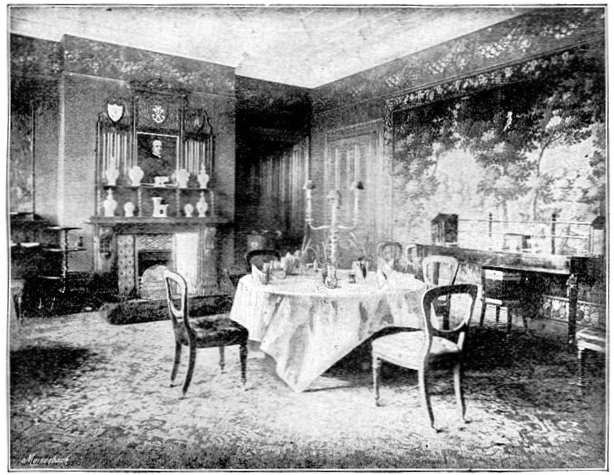
THE DINING-ROOM.
From a Photo by Elliott & Fry.
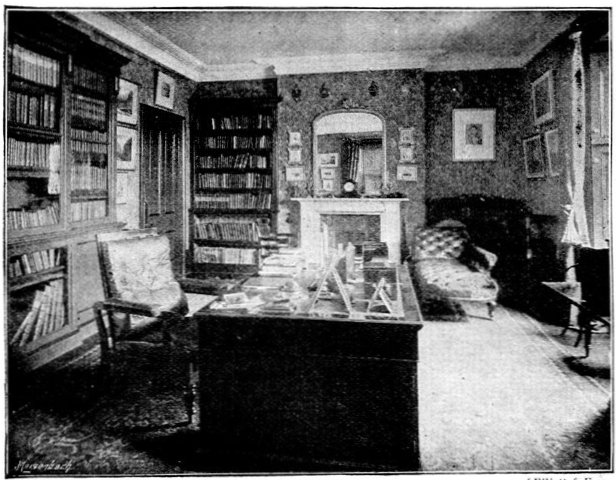
THE STUDY.
From a Photo by Elliot & Fry.
Sir Francis did brilliantly at Oxford, gaining both the Stanhope Prize and Arnold Prize. The former gave occasion to an intensely interesting letter from Dean Stanley. Again the volume of letters was consulted, and a few pages further on from Lord Brougham's note was the missive. Sir Francis opened his Stanhope essay with Matthew Arnold's words:—
"I rejoice to see it," said Dr. Arnold, as he stood on one of the arches of the Birmingham railway, and saw the train pass on through the distant hedgerows—"I rejoice to see it, and to think that feudality is gone for ever. It is so great a blessing to think that any one evil is really extinct."
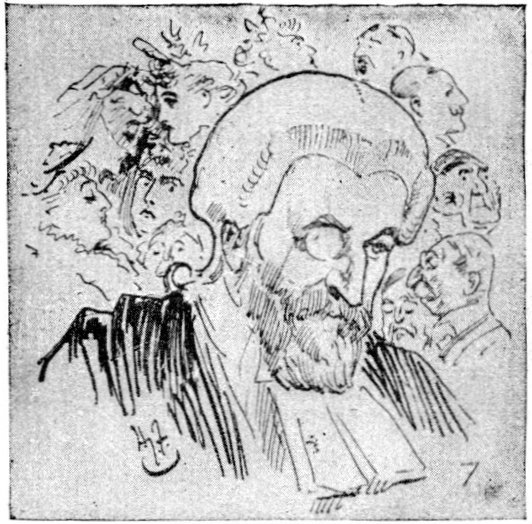
SIR FRANCIS JUENE.
From a Sketch by Harry Furniss.
And this was a most generous, though undoubtedly well-deserved, tribute from Stanley—saying that it was he to whom these words of Dr. Arnold were first addressed.
Here is the letter:—
"June 22nd, 1863.
"6, Grosvenor Crescent, London.
"My dear Jeune,—Many thanks for your essay. I have read it with much interest, as I heard those few sentences which you delivered with so much effect and discretion with much pleasure. There was probably no one in the theatre to whom your opening sentences came with so much force as to myself. It is not often that such a good fortune can fall to anyone as to hear the chance sayings which he remembered thirty years before falling from the lips of a dear friend, in a solitary walk through the fields of Warwickshire, repeated with all the energy and weight of an authoritative maxim before the most magnificent assemblage that could have been gathered together in England or perhaps in the world.
"Yours very faithfully,
"A. P. Stanley."
"I left Oxford when I was twenty-one," said Sir Francis, "and proceeded to London immediately and began to study law. Acting under the advice of Lord Westbury, I began by reading in a conveyancer's chambers. I went to Mr. Ebenezer Charles, brother of the present Mr. Justice Charles, a most accomplished lawyer; and happily in the same chambers was Mr. James, afterwards Lord Justice James. James was a brilliant man—but lazy, physically not intellectually, and the pupils had full leave to read his briefs, and tell him their contents and the authorities. His remarks were worth anything to a student. My other legal masters were the great pleaders, Mr. Bullen[Pg 581] and the present Mr. Justice Wills. I was called to the Bar in 1868, but previous to that I went for a year into a solicitor's office, the firm of Baxter, Rose, and Norton. That was worth a great deal to me—the experience gained there was perfectly invaluable. As soon as I was called I was engaged in one very big lawsuit that ran into several years; almost all the great lawyers of the day were connected with it. In that way I not only had excellent employment during my first four years at the Bar, but also made the acquaintance of many eminent barristers."
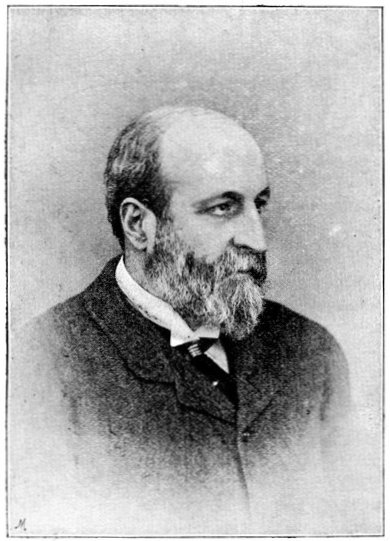
SIR FRANCIS JEUNE.
From a Photo by Elliott & Fry.
Sir Francis Jeune was for twenty-three years at the Bar, and, when made a judge in 1891, was raised to the Bench with a record that he had been associated with many kinds of legal cases. He participated in much ecclesiastical work—sometimes on one side, and sometimes on the other—when "Ritual" raged strong in the land. He had experience in bankruptcy proceedings, Common Law, Probate and Divorce, and considerable Parliamentary practice fell to his lot.
He did much Privy Council work.
"I frequently held briefs for the Government of Canada, whose general retainer I held, and also other briefs from Canada," said Sir Francis, "and one of these gave rise to a dramatic incident. I was instructed to apply to the Privy Council for leave to appeal on account of some technical flaws in a trial for murder in Canada—the man having been convicted. Whilst I was arguing and hoping to make a good impression on the Court, a telegram was put into my hands. It read: 'So-and-so (the criminal) was hanged by order of the Governor-General at nine o'clock this morning'! It did not seem necessary to continue the argument after that. I recollect my point: it was that the case had never been sent before a grand jury!
"Ballantine! Yes. I was on several occasions associated with him. He was the most brilliant cross-examiner I ever heard—I don't say the best, for he never knew his brief. But his tact and readiness were extraordinary. I remember a divorce suit in which the husband petitioned against the wife. Ballantine and I appeared for the petitioner. The evidence was very much in favour of the wife as given by her maid—a very modest, unassuming girl. It came to Ballantine's turn to cross-examine.
"'What shall I ask her?' he said to me.
"At that moment somebody at the back of the court—I never found out who—whispered to me: 'She had an illegitimate child while in her late mistress's service!'
"I whispered this on to Ballantine, adding that I knew of no ground whatever for the imputation. He got up—and something like the following took place:
"Ballantine: 'I believe something serious happened whilst you were in your late mistress's service?'
"Maid: 'Yes, sir.'
"'Something very serious?'
"'Yes, sir.'
"'I believe you left?'
"'Yes, sir.'
"'When you left, did she mention it to your new mistress?'
"'No, sir.'
"'If she had done so, do you think you would have got your present situation?'
"'No, sir.'
"'If she were to mention it, do you think your mistress would keep you?'
"'No, sir.'
"Ballantine sat down. Sir John Karslake, for the respondent, thought it best not to re-examine, and Lord Hannen, in summing up, remarked that no doubt there might be something in the matter to which Serjeant Ballantine had referred, which might induce the girl to desire to stand well with her mistress, and Sir John Karslake had not felt inclined to re[Pg 582]-examine! We won our case. The real truth, I believe, was that something—some article or the other—had been lost, and the girl was supposed to have been implicated in it.
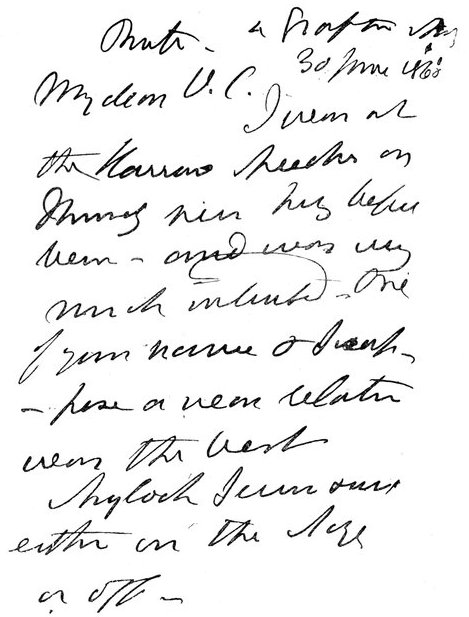
LORD BROUGHAM'S LETTER.
"I have had doubts since whether the tactics were perfectly defensible—but you see the skill. Absolutely nothing was risked, because it would have been easy to retreat if the first answer had been unfavourable. A blundering advocate would have blurted out the offensive suggestion, got an indignant negative, set the judge and jury against him, and been considered a brute.
"Now," suddenly exclaimed Sir Francis, "are you good for a walk to Donnington Castle—we can just do it before luncheon?"
So we started, looking in at the stables on our way, to admire Queen, a purchase of Lady Jeune's, who, by-the-bye, is a capital judge of horseflesh; and Cardinal, so named, as it was bought during the run of "Richelieu" at the Lyceum; the riding ponies of the young ladies, Sir Francis's cob, and a Devonshire pony, recently given to Sir Francis's son by Lord Portsmouth. We stood for a moment at the animals' burying-ground—[Pg 583]about a couple of hundred yards from the house. The greensward round the stones put up to the memory of Fox, a dog who died on July 2, 1892, and poor old Tim, who breathed her last on April 13, 1893, was covered with primroses. Poor old Tim. She was a favourite white cat, whom Sir Francis had had for fifteen years. She died very peacefully in the end. She always waited for her master at the top of the stairs, and, when her days were numbered, just lay down—under Sir Francis's chair in the dining-room—and died.

DEAN STANLEY'S LETTER.
We talked on many things on our way to the famous old castle.
The Ballantine incident led me to ask Sir Francis if he thought counsel were generally fair. "Yes; emphatically yes," he replied. "I have known leading counsel, over and over again, resist great pressure to put forward points they knew were not sound, and to adopt courses of which they did not approve. You will never get law for nothing. I strongly suspect it is as cheap now as ever it will be. It is a great thing to have got rid of technicalities to the extent to which this has been accomplished. The public owe much to Lord Esher's presidency of the Court of Appeal in this matter. You ask me if purely family cases could not be settled at the dining-room table or over the fire. I don't think it possible. No feelings are so bitter as family feelings, and I think it is quite impossible that these matters should often be settled without the decision of a court of law. They often are settled when the cases get into court, because no litigant ever knows the weakness and strength of his case or of his opponent's case until it is in his counsel's[Pg 584] hands, when he quickly becomes acquainted with the real situation."
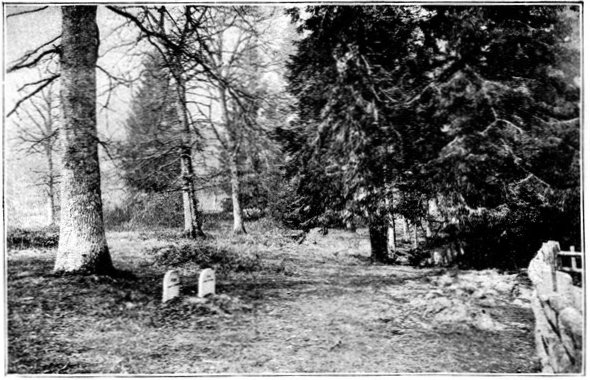
PETS' BURIAL GROUND.
From a Photo by Elliott & Fry.
"And divorce, Sir Francis?"
"The Divorce Court as we have it now has been in existence since 1857, and in proportion to the population, the number of divorces has not increased. I see a French legal writer of eminence has recently said that the French had in five years after their Divorce Act as many cases as we in thirty after ours. Even allowing for the difference between the laws of the two countries, it is not unsatisfactory as a comparison. Divorce in this country is a far easier thing than is popularly supposed. If a man can prove he does not get a pound a week, he is entitled to a divorce free, and there are always counsel who are kind enough to conduct his case for him. If he does not get counsel, the judge has often to pose as such, which is perhaps rather hard on the judge. Only about 5 per cent. of the divorce cases come from the upper classes—the remainder from the middle, lower, and frequently the pauper classes. The public hear very little of them—they are only interested in cases where the parties concerned are known and the interests at stake are big. But, to my mind, every divorce case in itself is sensational—be they rich or poor concerned—sensational because it is so severely serious. A divorce court should be and is the most serious of courts. If a person laughs, it is not so much the usher who puts it down as the public in the gallery themselves!"
Sir Francis said that he frequently gets through twenty cases of divorce a day, and sometimes sixty probate and divorce summonses and motions. He knows the points of each case—more particularly in the latter—they have been prepared for him by the registrar, and when a counsel rises and starts what promises to be a long discussion, the judge courteously stops him and requests him to argue the one main point. A judge's work is very much misunderstood by the public. When the Court rises at four, he frequently spends a couple of hours in getting ready his notes for summing up, which may come at any time if a case collapses. He must often spend the intervening days between Friday and Monday in "looking into the case."
"And do you think the present divorce laws are satisfactory?" I asked.
"Yes," he replied, thoughtfully, "fairly so. Of course it is said that men and women should be in exactly the same position, as is the case in Scotland; but there is much to be said for our law. One matter does, I think, require alteration. As the law stands, if a woman gets a divorce from her husband and she is given the custody of the children, the man need only keep them until they are sixteen. In many classes of society children require to be educated and maintained till much later, and it is frequently a great tax on the woman."
"And the Press—would you have divorce cases suppressed in the newspapers?"
"I am perfectly satisfied with the Press. Their discretion is admirable, and I have never felt disposed seriously to disapprove of a newspaper for over-reporting. The Press is the voice of the country. Justice is a public thing, and the administration of justice should be given all publicity. If this were not done, how would the public ever know that litigants were getting their rights? Newspaper reports to-day are pretty much as they should be."
We arrived at Donnington, and Sir Francis enthusiastically went over all the part the[Pg 585] old pile had played in the long-ago days of rebellion.
We reached the house again, and entered it with a hearty laugh, for Sir Francis had just told a story which would tend to prove that you will never shape the divorce laws to suit everybody. A Frenchman applied for a divorce, but he had no witnesses. He got them the next day, and his application was granted. A few days afterwards Sir Francis received a letter from him, asking if it would not be possible to curtail the necessary six months in order to make the decree absolute, as the Frenchman had come across a very charming widow with money, and he was afraid that the lady might not be willing to wait six months.
"He made a strong appeal to my sympathies," said Sir Francis, "and I did sympathize, but I could not help him."
It was a very happy evening at Arlington Manor after dinner. Lady Jeune afforded me the opportunity I sought. Few women are better known in the charitable world than Lady Jeune, but it is only when one has met her that one realizes how very practical she is in her deeds of kindness. With a head of perfect silver hair, and keen, bright eyes, she just fixes them on you and says exactly what she thinks. There is nothing hesitating about her—she always appears to know what is best and acts up to it; what will succeed, and it does.
"My childhood," said Lady Jeune, "was passed in Scotland. I was brought up very homely, in a very strict way, with two sisters and a brother. I never came to London until I was eighteen. I cannot tell you how I came to do the things that you suggest I do. I think, perhaps, I drifted into them—but I have always been deeply interested in my own sex, and for the last thirteen or fourteen years particularly so."
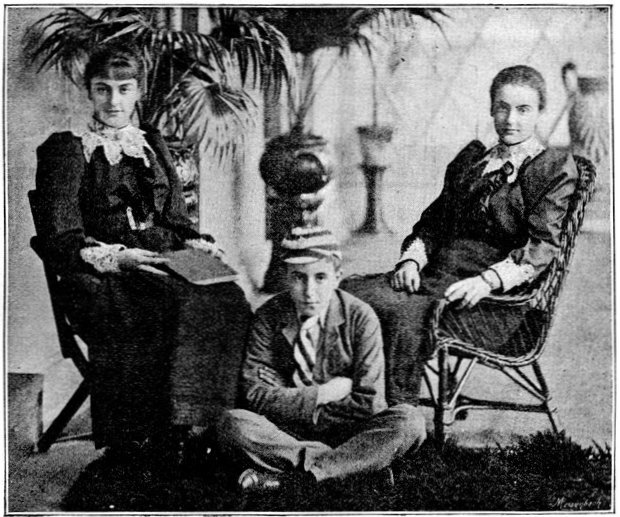
MISS MADELINE STANLEY. MASTER F. C. S. JEUNE. MISS DOROTHY STANLEY.
From a Photo by Elliott & Fry.
"And children?" I hinted.
"Yes, and the little ones, too. My Holiday Fund? Oh, yes. It is about eight years old. Mr. Labouchere had some money given him, and I told him if he would let me have it I would take up the work. I began with £500, and have had as much as £1,800 to spend in the summer months. We board the children out in Essex, Berkshire, Oxfordshire—in fact, in places within easy distance of London, and where the pure, free air is sure. I am a manager of two groups of schools in the poorest parts of London—Shoreditch and Bethnal Green—so that I have a very good choice of really poor, deserving children, to whom the country meadows is like a peep into Heaven. I make no distinction as far as denominations go. Last year I sent away 1,200 children."
Lady Jeune is also interested in factory girls and tired mothers, whilst her Rescue Home in the North of London contains a large laundry business.
I gathered much of the greatest interest from Lady Jeune. The "Revolt of the Daughters" question mystifies her. There is always a certain proportion of young women who don't get on at home, and an outside remedy will never be found. It must be found—if it can be found—in the home[Pg 586] itself. The woman of to-day is a very different sort of person from what she was twenty-five or thirty years ago. The girl of to-day may be more interesting, but she is certainly not so fresh—she knows too much, attempts too much. Twenty-five years ago a woman had no opinions until she was married. Girls of to-day start in their teens, and Lady Jeune thinks they do themselves more harm than good. You cannot have enough athletics for Lady Jeune—that is why the girls of 1894 are so much better grown, taller, and "finer animals," than were those of years ago; but she questions if their children will be equally good-looking and physically developed. The rapidity of life and excitement which many women lead must tell on them. She regards woman's too great love for amusement as being at the bottom of the cause of so many unhappy married homes. Why are there not more real friendships between man and wife? Let that be so, and the home would be home for both. She is a firm advocate of technical education.
"I believe in bigger girls being taught in class," said Lady Jeune; "it does a girl good to work with other girls. Boys? Let every boy be taught a trade at school—his father's trade for choice. Opportunity—as it is to-day—is levelled for all, and whether the boy is the son of a duke or the son of a working-man—a Board school boy—their opportunities and chances of real and true success in life are more equal than formerly."
"Then how would you meet the wants of your surplus boy population, Lady Jeune," I asked—-"the lads of the slums, whose family motto is 'No work, and plenty of it'?"
"Either by emigration, or by some scheme such as the idea of the Gordon Boys' Home carried out on a small scale, which would enable them after training to become soldiers or sailors," replied Lady Jeune.

LADY JEUNE.
From a Photo by Elliott & Fry.
It was during the walk back over the fields from Donnington Castle that Sir Francis Jeune paid a magnificent tribute to the abilities of the late Lord Hannen—both as a lawyer and a man. On my return to town the following evening the newspaper placards had the announcement of Lord Hannen's death!
[Pg 587]Harry How.
By Mrs. M. Griffith.
(By special permission of Her Majesty the Queen.)

THE "VICTORIA AND ALBERT."
From a Photo by G. West & Son, Southsea.
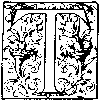
The Victoria and Albert is a paddle vessel of 2,470 tons, built by Her Majesty's Government and launched from Pembroke Dock in 1855. Her dimensions are: extreme length, 336ft. 4in.; breadth of deck, 40ft.; displacement in tons, when deep, 2,390 tons.
Her engines make twenty-one revolutions a minute, and are supplied by four boilers, with six furnaces to each. It takes about six tons of coal to get up steam, and about three tons an hour to keep her at full speed. Highest indicated horse-power, 2,400.
Her Majesty the Queen made her first cruise in her on July 12th, 1855.
What will first strike any visitor going on board the Victoria and Albert is the utter lack of luxury and magnificence of decoration and furniture in the Royal apartments. The most perfect simplicity, combined with good taste, prevails everywhere. It would be well for those who complain of the cost of our Royal yachts to compare them with those of other nations, and note the difference.
The deck is covered with linoleum, over which red carpeting is laid when the Queen is on board; and plenty of lounges and cushions laid about and many plants, which contrast pleasantly with the white and gold with which the vessel is painted. She is lit electrically throughout, having forty-two accumulating cells. She carries two brass guns (six pounders) for signalling only. There is a pretty little five o'clock tea cabin on deck, which has a hood coming down from the doorway, as a protection from the wind. There is also a miniature armoury, lamp-room, chart-room, and a number of lockers for signalling-flags.
All the Royal apartments have the floors covered with red and black Brussels carpet, in small coral pattern; the walls hung with rosebud chintz, box pleated; the doors of bird's-eye maple, with handles of iron, and fittings heavily electro-plated. Her Majesty's bedroom has a brass bedstead screwed into sockets in the floor, bed furniture of rosebud chintz lined with green silk, canopy to match, green silk blinds, and plain white muslin curtains with goffered frills, mahogany furniture, chintz-covered. Dressing-room: mahogany furniture, covered with green leather, writing and dressing table combined; the walls covered with maps and charts on spring rollers.
The wardrobe-room, in which Her Majesty's dresser sleeps, is furnished in a similar style;[Pg 588] and here I saw a boat cloak of blue embossed velvet, lined with scarlet cloth, and another made entirely of scarlet cloth and with the "Star" on the front, which once belonged to George IV., but is now sometimes worn by the Queen.
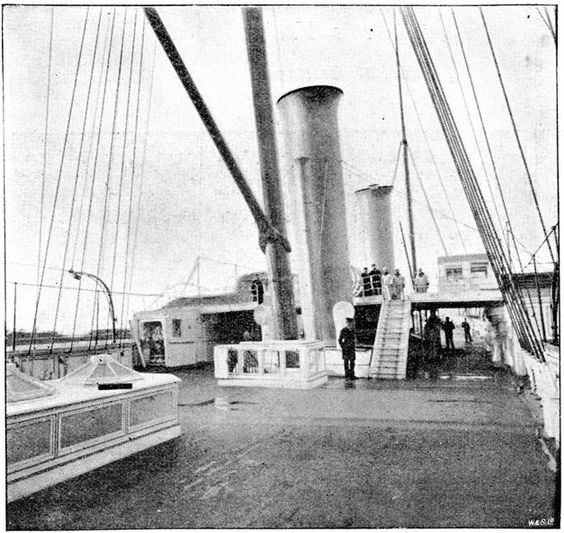
THE DECK.
From a Photograph.
In the Princess Royal's room—as it is still called—the furniture is of maple, an electric light pendant hangs over the toilet table, the walls are a pale salmon colour, and the cornice a shell pattern in white and gold, the ceiling done in imitation of plaster.

THE PAVILION.
From a Photo by Symonds & Co., Portsmouth.
The cabin which was formerly occupied by the Prince of Wales and Duke of Edinburgh contains two little brass bedsteads, maple furniture, decorated with the Prince of Wales' Feathers; and the Tutor's cabin opens out of it.
The pavilion, or breakfast-room, has mahogany furniture covered in leather, and a couple of large saddle-bag easy chairs, a very handsome painted porcelain stove, and frilled muslin curtains to all the parts.
The dining-room is furnished in a similar way, but the walls are hung with charts and portraits of the former captains of the vessel, who were as follows: (1) Lord Adolphus Fitzclarence, (2) Sir Joseph Denman, (3) George Henry Seymour, C.B., (4) His Serene Highness Prince of Leiningen, (5) Captain Hugh Campbell, and (6) Captain Frank Thompson. A very handsome candelabrum is of nautical[Pg 589] design, and the brass coal scuttle is fashioned like a nautilus shell; walls, salmon; and cornice, white and gold, in "Rose, Shamrock, and Thistle" design.
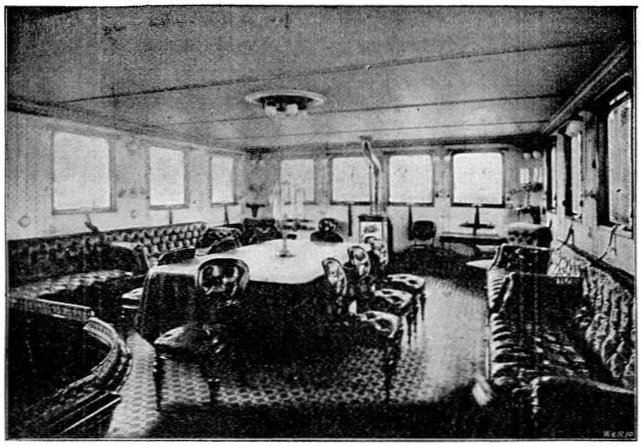
THE DINING-ROOM.
From a Photograph.
Her Majesty's drawing-room is 26 ft. by 18 ft. 6 in. The walls chintz-covered, and hung with portraits of the Royal Family in oval gilt frames, in the same design as the cornice; the furniture of bird's-eye maple; the coverings, all of chintz, to match the walls. Two large sofas, one at each end of the room; two or three easy chairs, the others high-backed; an "Erard" piano, book-case and cabinet combined, writing-table, occasional tables, and an oval centre table, comprise the whole of the furniture. I noticed a very handsome reading-lamp of copper and brass, for electric light, with a portable connection, so that it can be used in any part of the room. The bells have also the same contrivance. The two chandeliers, for six candles each, are of the same design as the one in the dining-room.

THE DRAWING-ROOM.
From a Photograph.
The corridor leading to the Royal apart[Pg 590]ments is hung with rich green silk damask curtains, and on the walls are water-colour paintings of several of Her Majesty's ships, done by the boys of Christ's Hospital. The staircase is very wide and handsome, of maple, with gold and white balustrades.
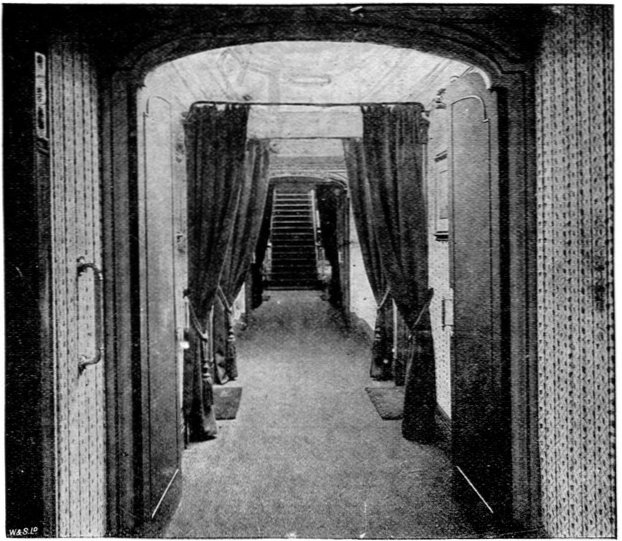
THE CORRIDOR.
From a Photo by Symonds & Co., Portsmouth.
The Ladies-in-Waiting have their cabins on the starboard side in the fore part of the vessel, and the Lords on the port side; they have also a commodious dining-room, decorated in white and gold. Her Majesty's servants have twelve cabins, six of them fitted up for two people. In addition to these there are numerous domestic offices, a dispensary, the officers' cabins, and accommodation for the crew, which numbers 170.
Her Majesty the Queen is never now longer on board than forty-eight hours at a time, and the vessel is kept in such perfect order that only twelve hours' notice is required to prepare her for the reception of Royalty.
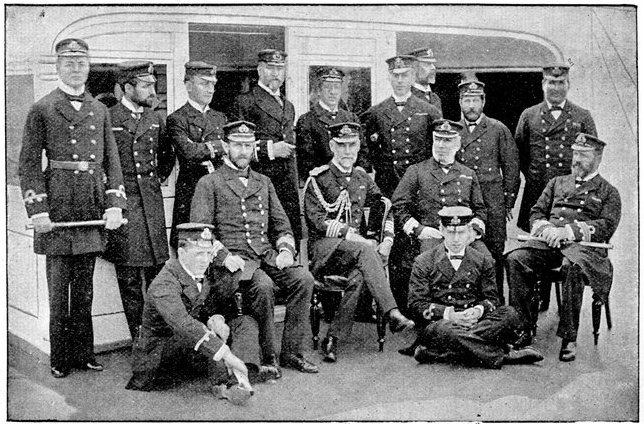
CAPTAIN AND OFFICERS OF THE "VICTORIA AND ALBERT."
From a Photograph.
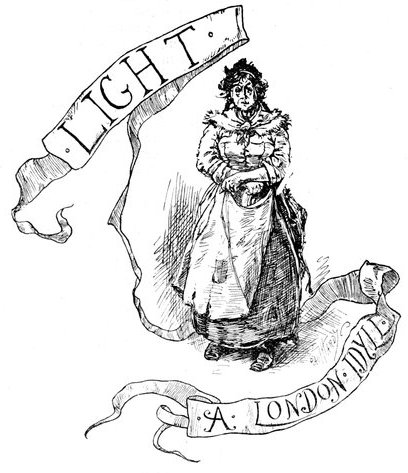
By E. M. Hewitt.
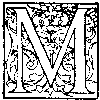
Marigold Place is a blind alley turning out of the animal life and ugliness of the Harrow Road. No. 7 is Mrs. Xerxes'. She was unique among landladies, never having seen better days. The oldest inhabitant of the Place had no other recollection of her, girl and matron, than as a limping slattern with a squint, wearing a sackcloth bib-apron and a ragged, rusty crape bonnet. Mrs. Xerxes' sole source of income, in addition to occasional charing, was derived from her lodgers—a colony of obscure workers, with much shabby tragedy underlying their daily absences. Little Miss Barberry, the upholsteress, who lived on the third-floor back, was Mrs. Xerxes' model lodger, or, as she expressed it, "the only 'let' that does credit to the 'ouse."
Madge Barberry was a very pretty girl, refined in voice, manner, and appearance, with delicate features, soft, dark eyes, and glossy brown hair loosely coiled on the top of her head. She always wore black, with a white apron, and a chatelaine of keys, scissors, and needle-case hung on a long ribbon at her waist. She lived in one room, poorly furnished, for which Mrs. Xerxes condescended to accept three-and-sixpence weekly. It was little more than a garret, hideous with the miserable appointments and musty atmosphere of the low-life London lodging-house. But, as for outlook, it was much better off than Paul Vespan's, on the other side of the landing. Through its grimy windows there was a glimpse of green Virginia creeper climbing up the dingy walls of the opposite mews; whereas, the third-floor front only commanded the depressing prospect of the narrow street. Madge merely knew Mr. Vespan by sight. They had met on the stairs, passing each other with that curious blending of shyness and suspicion which characterises the relation of London fellow-lodgers. Once or twice Paul had heard her singing; she had a sweet voice.
Mr. Vespan ranked next to Miss Barberry in Mrs. Xerxes' estimation.
"Bookish, but with a good 'eart. Shabby, but quite a gentleman," ran the landlady's verdict. Madge chose to take him for a poet. He was a tall, fair young man, with a pale face and sad, serious eyes. The little upholsteress, who was not a philosopher, and had never read Emerson, had, nevertheless, long ago "renounced ideals and accepted London." Her life had always been hard. Before her birth her parents had lost their all in one of those financial disasters which sometimes overtake the most prosperous communities. The father died broken-hearted. Madge worked bravely for her mother until she, too, went from her. Then the orphan faced the world with a slender yearly pittance of twenty pounds. Such lives are too common in London to stand for romance. She was generally lucky in getting work, and one cannot starve on a shilling a day.
Paul Vespan, whom Mrs. Xerxes believed to be "something in the City," was much poorer than Madge; but he had a Hope, which he meant to convert into money some day. Meanwhile, he carried it about in the breast-pocket of his shabby coat in the shape of a roll of MS. The sheets were torn at the edges and blackened with frequent post marks—the scars of repeated disappointments. But all day long they nestled near the poet's heart. For the truth of Paul Vespan was what Madge Barberry had divined, though Mrs. Xerxes also had right on her side. Her lodger was a sandwich-man. He had not come to London with that intention, but he had fallen to it. His people, well-to-do, narrow-minded country folk, took it for granted that he was getting on. The fact was, he was on the verge of starvation.
It was sultry summer evening in Marigold Place. Madge Barberry, who had worked far into the twilight, was sitting at her open window with idly folded hands. Overhead the glassy sky was brilliant with stars. Down in the mews the lamps flickered fitfully behind their panes. From time to time the silence was broken by the shrill screams of gutter children at play, or by the impatient stamp of a horse in its stall. Madge was singing to herself, but her thoughts were wandering away from the song to Mr. Vespan. The motherliness in her tender young heart had been touched by the sight of his wan, weary face, as it passed her on the stairs that morning. He walked languidly, and seemed paler than usual. But, then, the heat was very trying. Fierce enough in Marigold Place, it was worse, no doubt, in the City. Could it have been a mere fancy, too, that he looked at her, as she hurried by, with timid, pitiful eyes, that seemed to ask her help? Poor Paul! It would have done him good to know how much sympathetic interest he was exciting in this stranger's heart.
Mrs. Xerxes limped upstairs after supper, and found her lodger in the dark. Madge economized in lights all the summer.
"If you please, Miss Barberry," said Mrs. Xerxes, who brought with her a strong odour of fried fish, "I've taken the liberty to get a job for you."
"That is very kind of you, Mrs. Xerxes," smiled Madge.
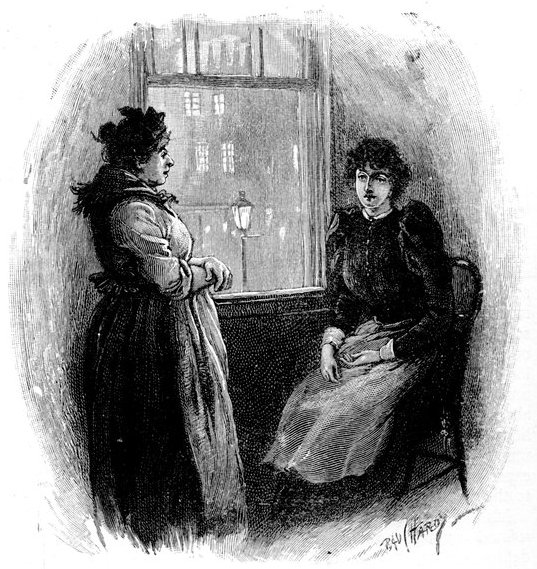
"THAT IS VERY KIND OF YOU."
"I 'oped you would take it that way, miss. It's where I was charing to-day. The young ladies are doin' up their rooms, and they asked me if I could recommend a respectable young person for upholstery. So I put in a word for you, thinking that every little helps."
"Indeed, it does, Mrs. Xerxes. Where is the house? And when am I to go?"
"To-morrow, at nine. Here's the address."
Mrs. Xerxes extricated a scrap of dirty paper from her pocket, and handed it to Madge. Then she went hobbling downstairs again.
A little later, a man who had groped his way up the narrow stairs stopped on the third-floor landing, gasping for breath. Madge was singing—her chatelaine jingling, not unmusically, for accompaniment—as she moved about her room. It was a sweet song, sweet with hope and promise:—
But the words fell with pathetic irony on Paul Vespan's ears, that must shortly be deaf to the sound of all human voices.
That verse was not for him. The light-hearted singer, no doubt, had had her love-passages, but she had evidently outlived them. He had no such memories to console or to detain him. He had lived solitary and misunderstood. He must die alone. Who would be sorry for him? Not this heartless singer, certainly. Poor Madge, who had been troubled, even in her singing, for her poet!
Paul turned into his room, and began to grope about for a match. Then he felt in his pockets. They were empty. He was poor, indeed. Fate had not left him so much as a light for his last journey. Nor was this the only delay. Across the landing a sweet voice called him back with tender insistence—
There is yet a day for me!
If only he could believe it! He had grown weary waiting for its dawn. The Poet's day is long in coming.
If it might be so! Paul staggered out of his dark room into the darkness beyond, clutching blindly at the air, for he was weak with long fasting. The song broke off. A woman called across the landing:—
"Who is there?"
"It is I."
"That's a starving man," said Madge to herself, "and it's Mr. Vespan's voice. What do you want?" she asked, opening her door.
"A light."
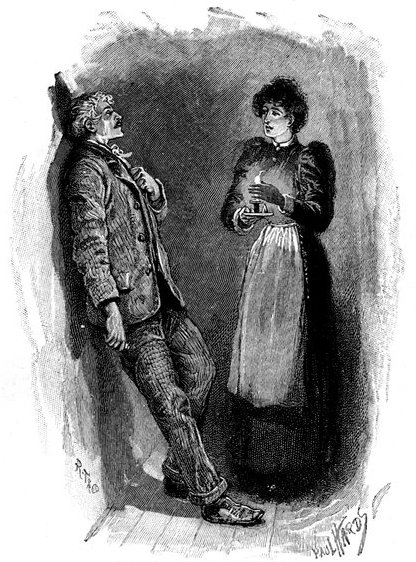
"SHE STOOD IN THE DOORWAY."
"Wait a moment. I will bring you one."
She came out and stood in the doorway, shading a flickering candle with her hand. The delicate face and slender figure were sharply silhouetted on Paul Vespan's fading consciousness. If he had meant to live, here was a woman worth living for. But he had done with possibilities. She went up to him and looked bravely into his white face.
"You are very ill," she said, gently.
"I shall be better soon."
Madge's quick eyes travelled down to his shaking hand. It had closed like a vice over some hidden treasure; but not before his good angel had seen it. Her own face paled as she bent above him.
"Give me that bottle," she said, quietly.
But, as the dark blue phial with its orange label slipped from Paul Vespan's nerveless fingers to hers, the little upholsteress burst into tears.
"Don't cry," said the man, hoarsely. "I am not worth it."
"You never meant it. No, my poor boy, no. You were unhappy—tired. It was all a mistake."
He fell back, gasping, against the wall.
"You had no right——"
"It would have been easier than—did you ever see anyone die of—starvation——?"
"You are not——"
"Yes, I am."
"Let me get you something."
"Anything—I am so hungry."
What should she do? She had spent her daily shilling. But to-morrow she would be sure of a dinner: to-morrow's pittance should go to this starving man.
Her poet was starving! That awful cry, going up hourly from the heart of the Great City, had never come home to Madge Barberry before. True, the horror had sometimes seemed imminent in her own life, but her brave hands, made desperate by love, had always kept it at bay. For the sake of her dead mother, who had been spared this martyrdom, she must save Paul Vespan. Quick as thought, she ran downstairs and knocked at the kitchen door. Mrs. Xerxes came out, wiping her mouth with the back of her hand.
"Deary me, Miss Barberry, whatever's the matter?"
"Will you come upstairs, Mrs. Xerxes? Mr. Vespan has fainted outside his door. He looks very ill. Perhaps he's hungry. Would you take this and buy what he wants until—until he gets better?"
"I always said you were the lady born, Miss Barberry," observed Mrs. Xerxes, looking down at the silver coin which Madge had pressed into her grimy hand; "but I don't know that I ought to take this from you. What would Mr. Vespan say?"
"Please, please don't tell him," cried poor Madge, in an agony of apprehension. "Let him think it's you."
Madge went to her work next morning at nine, after a sleepless night. Mrs. Xerxes stopped her on the stairs to whisper that Mr. Vespan was much better. He had begged her to say to Miss Barberry that he hoped he had not frightened her, and to thank her for her kindness.
"Mrs. Xerxes! You never told him?"
"Bless you, my dear; he meant his fainting. I was mum about the money."
Madge nodded, much relieved, and resumed her way.
Her destination was within easy reach of Marigold Place. It was a stately red-brick house, one of a fashionable avenue, the blue window-boxes gaily crowded with white and scarlet flowers. The upholsteress was shown into the young ladies' boudoir. Two pretty girls were standing at a table, looking through a book of patterns in cretonne. They were twin sisters, and always spoke together. When the servant announced "The young person from Mrs. Xerxes'," both turned on Madge.
"Do you think you could upholster a cosy corner for us—Miss Barberry, isn't it? Then we want curtains to match. Can you make curtains? Which of these cretonnes will look best? How many yards will it take? May we stay and watch you work?"
Madge contrived to give lucid answers to all their questions, and proved invaluable to the sisters, who were delighted with her. They wasted a whole morning discussing and suggesting; but Madge had her dinner, and they insisted on her staying to tea also.
She went home at six. Mrs. Xerxes darted out of the kitchen, pointing mysteriously over her shoulder.
"He's in there."
"Who?"
"Mr. Vespan. I got him downstairs for a change. Suppose you go in and see him?"
"I?"
"Why not? Where's the harm? But for you, I'd like to know where he'd be!"
"Hush! He might hear you," whispered Madge.
"Not he. Well, will you come?"
Without waiting for an answer, Mrs. Xerxes threw open the door of her sitting-room.
"I've brought Miss Barberry to see you, sir."
Paul Vespan turned his head languidly.
In Mrs. Xerxes' back yard, among battered tins and broken bottles, a Madonna lily had grown up, tall, and strong, and pure. It reminded the poet of Madge Barberry, as he saw her then.
"I have much to thank you for," he said, "though you saved a worthless life."
Madge looked round nervously; but Mrs. Xerxes had disappeared.
"How wicked I must seem to you!" Paul[Pg 595] Vespan went on, in his weak, weary voice; "but if you knew what I have suffered!"
"I think I do know," said Madge, gently. "Life in London is very hard. And it is hardest for such as you are."
Paul looked at her inquiringly.
"That is——?"
"Perhaps you will laugh at me."
"No, no. Tell me."
"I took you for a poet."
"It is the truth."
"Not really!"
"But it is no use. There is no room for me anywhere. Board-carrying is more lucrative."
"Board-carrying?"
"Yes. Does it shock you? I am a sandwich-man by profession; a poet by accident."
"Oh! it can't be true!" cried Madge, passionately. "You—you, a sandwich-man?"

"I AM A SANDWICH-MAN."
"One and twopence a day is poor pay; but I assure you it's better than poetry."
"Some day——"
"Yes. I know. I have heard that so often. But one never comes up with 'some day.' Perhaps you are not ambitious?"
"No."
"How do you escape? It is in the air in London."
"I only have a wish. It is not great enough to be called an ambition."
"Will you tell me what it is?"
"Not now. I'm afraid I have let you talk too much as it is."
"No. It has done me good. What a happy face you have!"
"I am not unhappy."
"May you always remain so! Good-bye, then, since you must go. And thank you once more."
He held out his hand feebly, with a wan smile.
"And now—now, you will be brave, will you not? Try once more. Let me post your next poem for you. I may bring you luck."
"As you brought me light. I should be a churl to refuse you, to whom I owe my life. You shall post a poem for me. I have a penny in my pocket, the last, until I get another job. It shall buy a stamp."
Then she went away, shutting Paul into loneliness once more. But she had also left a hope behind. He was a braver man for the contact of that sister-life, his fellow-toiler in the Great City. Her courage shamed him. She, too, was poor and lonely, but not a coward. He would be one no longer. Because she had saved his life, he could never again think meanly of it, nor lightly fling it away. At last his heart could join in her sunset song:—
There is yet a day for me!
He went up to his poor room presently[Pg 596] with a firmer step and a grateful glance across the landing to the door from which light had streamed to beckon him back to hope and life. He sat down in the twilight and began to think. First of all, he must find work or starve. Meanwhile, how was he living? On whose bounty? Mrs. Xerxes was a poor woman. She could not afford to be generous. To whom, then, did he owe it that he was not at this moment a homeless wanderer in the streets? Surely not to that strong, sweet woman to whom he owed his very life! His pale face flushed at the wild thought. Impossible, if her resources ran on anything like the same lines as his. He drew from his pocket the back of an old envelope, pencilled with figures. Madge Barberry's balance-sheet, indeed, compared favourably with this. On the credit side appeared six days' pay at 1s. 2d. per day for board-carrying. The debit side was made up of seven days' food, 2s. 4d.; lodging, 2s. 4d.; soap, 1d.; washing, 3d.; boots, 2s.
That was how Paul Vespan lived on seven shillings a week, and but for Madge Barberry, the record might have run "how he died" instead.
It was a pathetic little story; but, like Madge Barberry's, too everyday for romance in this city of sharp contrasts.
Then he rummaged amongst the contents of a battered cardboard box for the best of his poems, which he had promised to lend Madge. In the search he encountered frequent sharp reminders of past failure. Many a curt editorial note of rejection had drifted in between the loose sheets of MSS. Here, one "regretted that the accompanying manuscript was unsuitable to his pages, and returned it herewith."
Or another "presented his compliments to the writer of the accompanying article, which he returned with thanks."
But in the strength of the new life which he was facing, these stabs were pin-pricks. He would try once more, as that sweet voice had urged.
Madge and her poet did not meet again for several days. Meanwhile, she posted his letter "for luck." He also left a roll of MS. at her door with "Paul Vespan's compliments." She read the poems in her leisure moments, which were few; for she now went daily to the red house in the avenue. The cosy corner made splendid progress, and the twins were more than ever enchanted with their upholsteress.
With a rebel thought of the poet thrusting itself between the lines, Madge read the verses to a finish; and then seized a regretful opportunity to return them.
She gave them back to him reverently.
"They are all very beautiful," she said: "I wonder no one listens; but I am sure they will some day."
Dear critic! If she were all he had to fear!
"I am glad you like them," he said.
"Is there any news yet of the other?" she asked.
"Not yet."
But Madge was to hear it first.
The next afternoon when she was at the avenue, a red-faced old gentleman with white hair put his head in at the door of the work-room, and then beat a hasty retreat.
"Come in, papa," chorused the twins; "it's only Miss Barberry."
"I'll look in presently. I only came to tell you I've found a poet."
"Papa! Not really! Where is he?"
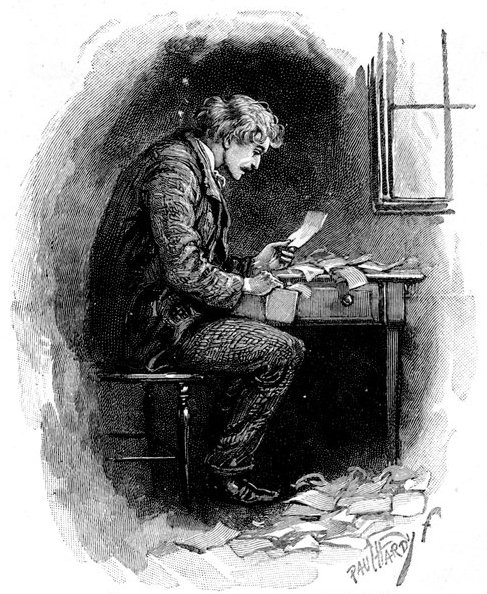
"HE RUMMAGED AMONGST THE CONTENTS."
"Marigold Place, Harrow Road, of all localities in the world."
"Why, that's where Mrs. Xerxes lives!" said one of the sisters, and then she looked at Madge.
"They're a very promising set of verses," went on the editor, impressively, "but I don't know that I can find room for them."
"Oh, please, please, don't send them back, sir! It will kill him."
"Eh? What? Who's this?" exclaimed the editor, looking severely over his glasses at Madge, and from her to his daughters. "Do you know this Paul Vespan, young woman?"
"Yes, sir. He lives in the house where I lodge. And he's starving, sir. He is, indeed. He has sent his work everywhere, and can't get it accepted. I posted that poem for him. I hoped it would bring him good luck."
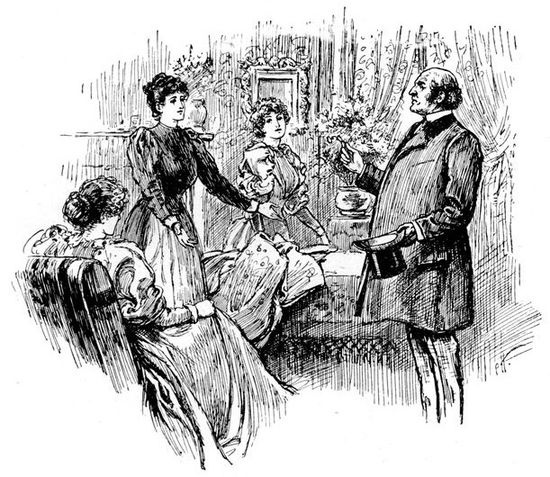
"HE'S STARVING!"
"And so it shall!" cried the editor. "You send this young man to me. What does he do in his spare time?"
"He's a sandwich-man, sir," faltered Madge; "and I think, if you don't mind," she added, "perhaps it would be better for you to write to him. He's had so many disappointments, that he'll hardly believe his luck."
"Very good," agreed the editor, "I'll write."
So Paul received his first cheque by the morning's post, "With the Editor's compliments, and thanks for the contribution entitled 'Love's Handicraft,'" and a request that he would call at the office.
The sacristan was putting out the lights in St. Ethelreda's after evening service. The church was cool and still now that the people had gone. A restful gloaming fell upon the deserted aisles. One sunset shaft crept aslant the pictured walls, on the Virgin Mother and her Holy Child. Before the altars, the perpetual lamps swung solemnly. In this sanctuary of hushed repose, Madge Barberry lingered late and last of all the worshippers. She was never lonely here. The lines of statued saints looked down upon her from their niches with tender reminder that they, too, of old had fought her wars. Victorious, they were no less her [Pg 598]fellow-soldiers. They were still one with that brave world-army of heroic men and women battling with high tides of poverty and misfortune.
She went regretfully down the shadowy nave. Paul Vespan was waiting for her in the dark porch.
"I came to meet you," he said; "Mrs. Xerxes told me you were here."
She smiled gratefully as they went out into the dusty street together. Soon she would have him no more to walk beside her. Great changes had come to Paul Vespan since that dark night when Madge Barberry's brave hand snatched him from death to life. The editor, once his friend, had remained so. After a pleasant probation in his own office, he was sending him to take charge of a small provincial paper in a cathedral town.
"You have heard the good news, Madge?" said Paul, thinking of this.
Yes, she had heard it. But to her, it was not good news, though she was glad for him.
"I hope you will be very happy," she faltered.
"I shall be very lonely. Unless—Madge, will you come with me?"
"I? Oh! no! I should be standing in your light."
"You? What are you saying, Madge? Why, didn't you bring me back to light? My life will be dark, indeed, without you."
"Then," she said, as they entered Marigold Place, "I will go with you."
Paul Vespan's after-history bears tender witness to the wisdom of his choice. In the light of his wife's unswerving love, he works bravely. The rewards which are sure to come will be sweeter because shared by her. She is his "lady with the lamp," standing no more beside the weary craven in his hour of tragic necessity, but shoulder to shoulder, heart to heart, with the valiant world-soldier in the thick of his battle for fame and fortune.
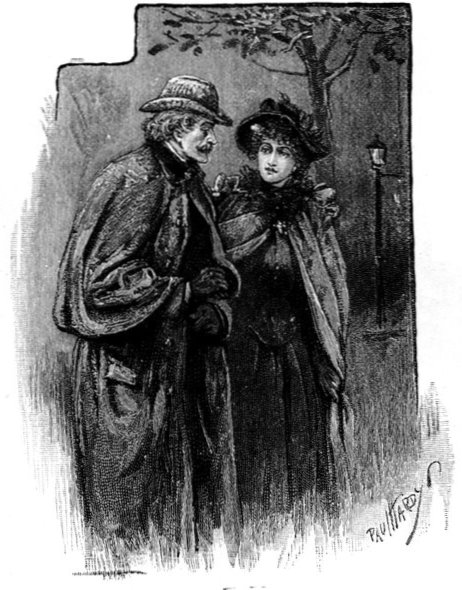

"Rodoporcine" is a portmanteau-word. It is not a regular scientific term, although, as I may claim with modest pride (being its inventor), it is almost ugly enough to be one. I have invented it largely for the benefit of the building (it is only one building) which the Zoological Society numbers six and seven, and divides arbitrarily into "The Swine House" and "The Rodents' House"; but chiefly I have invented it because I wanted a title for this Zig-zag. Rodo I gnaw, porcus a pig.
The Society have old authority for any amount of confusion between the swine and the rodents. The guinea-pig has long ago established its right to its name, on the indisputable grounds of being entirely unconnected with[Pg 600] Guinea, and not a pig, but a rodent. The capybara is also called a water-pig (even in its Greek name) in virtue, doubtless, of being a rodent. "Porcupine" means a thorny pig; the name being again found convenient for a rodent, and enunciated with peculiar emphasis by the wag who wrote:—
Then, by way of pleasant variation, the hedgehog derives its title from the fact of being neither a hog nor a rodent, but only a prickly kind of mole. So that confusion among pigs and rodents is an ancient, time-honoured, and respectable state of affairs, only feebly deferred to by the Zoological Society in placing the two side by side. Let us consider them, therefore, in a proper derangement and with a due regard to confusion.

BOHEMIAN.
The thoughtless world is disrespectful to the pig. It even uses its name as a term of reproach. Nobody likes to be called a pig, and yet if some were to accept the epithet with a good grace, and conscientiously act up to the character, there would be a deal of improvement in their manners. Proverbs abuse and slight the pig. "Pigs may whistle, but they have an ill mouth for it," says one; "Drunk as David's sow," says another; "What can you expect from a pig but a grunt?" asks a third, totally ignoring the existence of such products as bacon, lard, bristles, and saddle-leather. But then proverbs are always perpetrating injustices somewhere, until abuse from a proverb has become a sort of testimonial to the worth of anything—animal, vegetable, or mineral. The pig eats all it can get, certainly, but that is only a manifestation of what we are apt to call, in ourselves, prudence and business acumen. Once thoroughly fed it regards the world with serene apathy, but that is merely broadmindedness and toleration. The nearest relatives here to the familiar porker of our native agricultural show are the wild swine—European and Asiatic—well set-up creatures, of form and manner not to be considered with disrespect, and carrying with them no more of traditional piggishness than a certain easy Bohemianism of manner and irregularity of bristle.
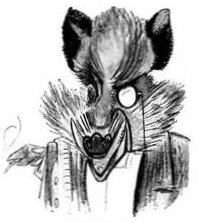
WELL GROOMED.
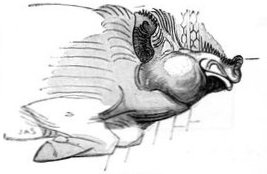
SERENE APATHY.
It is plain to see that whatever may be found of ill account in the pig is due to the contaminating influence of man. A wiry, well-groomed wild pig is a decent citizen of the animal community, unpleasantly ready with his tusks, of course, but clearly dignified and with intelligence. To me the wart-hog always seems the precise militarist among pigs. His neat, well-fitting feet, his closely-clad legs, and his high carriage of head are alone enough, to say nothing of his warlike tusks, and his mutton-chop side-whiskers, which indeed are only a sort of warts, but look as much like the real thing as they can manage. But, for all the other qualities of the grizzled old soldier, it cannot be concealed that he has a drunken eye.
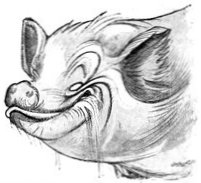
"IMPROVED."
From the comparatively noble wild swine (who cannot open his mouth without an invariable appearance of being about to sneeze) man has, by long selection and careful breeding, evolved a preposterous cylinder of locomotive pork. This he calls an "improved" pig—as who should speak of improving the heavens by casting advertisements thereon from a magic-lantern. It is a quaint paradox in the pig-fancier's system that the pig with the greatest number of excellent points is, as a matter of fact, the pig whose rotundity presents no point anywhere, nor anything like a point.
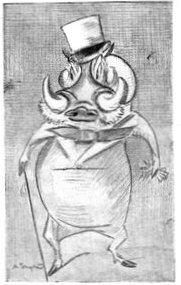
MAJOR WART-HOG.
There is a deal of catholicity of taste in a pig. He is quite prepared to devour the whole animal and vegetable kingdom, and very little hunger would persuade him to admit the mineral kingdom, too. Almost anything will "please the pigs"—which may be the origin of the proverb, although origin-mongers say differently; and yet the pig's senses of taste and smell are particularly acute; witness his use as a beast of chase for the truffle. He has also an acute weather-wisdom, if countrymen's weather-lore be accepted; for if pigs carry straw in their mouths it will inevitably rain. Wherefore picnic parties will do well to remove all straw from the reach of pigs.
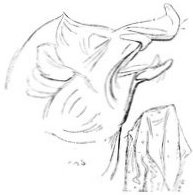
GOING TO SNEEZE.
The capybara—the water-pig which is no pig—is a rudimentary sort of structure. He presents a kind of rough outline or experimental draft of a quadruped in its preliminary stages of invention. All the materials are there—more than enough, in fact—and the rough plan of their arrangement is sketched out, but there is no detail—nor, indeed, any other kind of tail—and no finish. The body (and a very liberal body, too), the hair (also liberal, and thick), the head and legs, have been put together tentatively with a shovel, and all the fine work has been omitted; indeed, the operations have never even arrived at the stage at which the tail is stuck on. The[Pg 602] capybara's ideals, notions of life, wants and aspirations are of the rudimentary character appropriate to his figure. He has no particular objection to being tame and docile—so long as he is fed—nor any particular repugnance to being otherwise. He will eat a piece of cabbage if it is there; otherwise he gets on very well with a lump of firewood. He has a drink when the idea occurs to him, and takes it in the ordinary way as a rule, but, sometimes, under the unwonted stimulus of a brilliantly new conception, he sits in his drink as he takes it. This would appear to be his notion of humour; it is the capybara's only joke, and he never varies it in form or spirit. He is not a communicative beast, and never offers a remark to any human creature but Church, his keeper, and then it is by way of extracting something to eat. The remark is a sort of purring rattle—the rudimentary speech of an animal whose vocal organs have not been tuned. The redeeming feature in the capybara, in these days of hysteric fad, is his utter absence of "views" on any subject in the world. And he has no enthusiasms.
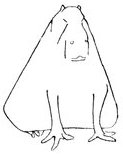


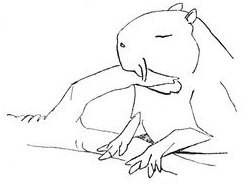


THE RUDIMENTARY CAPYBARA.
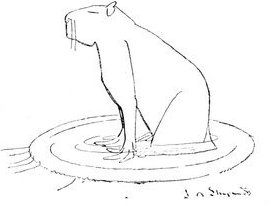
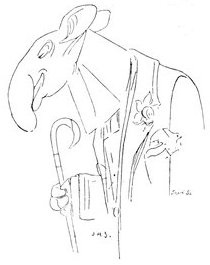
THE GIDDY MALAYAN.
The tapir is nothing but an ambitious pig—a pig trying to be an elephant. But the most careful cultivation has not succeeded in elongating his trunk beyond a few inches, and the biggest of the tapirs can get no nearer the stature of the elephant than a small donkey. It is probably this that makes the tapir a melancholy animal, silent and despondent. There is no gaiety in the composition of the tapir. In a fatefully unlucky moment he began to try to be an elephant, and thenceforward happiness forsook him. Like the king in the history-book, he never smiled again. His life is one cheerless, hopeless, dreary struggle to be what he can never become. Being a pig, he is obstinate, or he would have given up the attempt long ago. Elephantine ambition in particular is not born in the tapir, though ambition of a vague sort is. The young tapir always begins by trying to be a tiger or a zebra; breaking out in brilliant stripes and spots; but in due time he regularly settles down, after the manner of his kind, to achieve rank as an elephant. He is a melancholy example of discontent in humble circumstances.
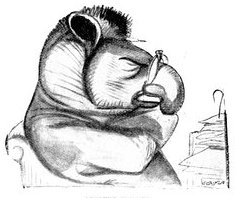
PRUDENT FINANCE.
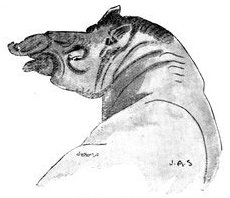
RECIPROCAL CONTEMPT.
Still, there is a deal of human nature in the tapir. Plainly it is largely Hebrew human nature, notwithstanding his porcine connections. The ordinary tapir is a grave, respectable, and judicious Israelitish financier, prudent and careful; but the Malayan tapir here is a giddy young person who makes the money fly. See his short white covert coat, with the little black bob-tail visible below it, and note his vacant eye. How badly he wants a crook-handled stick and a high collar! But you may despise the tapir, his restless ambition, and his immature trunk as you please—all your contempt will be reciprocated, and with interest. He is almost the only animal here who knows that sightseers don't usually carry about with them his particular sort of food, and he is, therefore, loftily indifferent to the tenderest blandishments. He despises you for having neither trunk nor tusks; in his matured philosophy, only an elephant is admirable; as a baby, he admires the zebra and tries to be one of them. And so he[Pg 604] lives here, in house number sixty, equidistant between the zebras and the elephants, and as likely to become one as the other. Though he could ensure his juvenile stripes being fast colours (which he cannot), the tapir would fail as a zebra in the hinder end. The docility of the zebra's head he might easily attain to—indeed, he has it now—but the inconsistent friskiness of his heels would be beyond him.

THE DOCILE FORE.
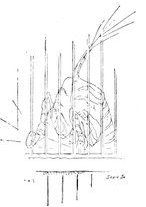
THE FRISKY HIND.
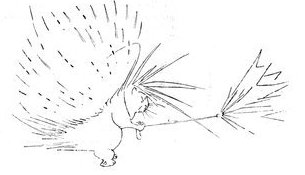
A GALE.
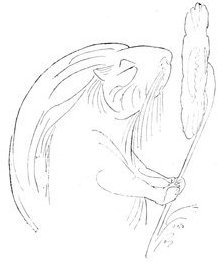
WILDELY TAME.
There are a good many fine points about the porcupine. Church, the keeper, once got half-a-dozen of them in his calf, and went to bed for a week to celebrate the occasion. The porcupine is one of those animals that look pleasantest from the front. There his bristles all lie back smoothly from his forehead, giving him an aspect as æsthetically and Wildely tame as may be. But behind—well, you get a view of all his fine points. A little irritation—a very little—brings up his fine points in spiky array, as though he were caught from behind in a gale of wind. There are no Irish porcupines, which is remarkable when you consider that, in a fight, the porcupine invariably advances backward, most valorously retreating to the front in pursuit of the enemy to which he turns his back, and pressing forward courageously to the rear. That is to say, in a manner less mixed, that the porcupine always attacks an enemy by springing backward at him, with spines extended. He has a tremendous set of teeth, like chisels, but these he never uses except to chew up timber with. He will never fight with his teeth, being apprehensive of a punch on the nose, where he is tender. But in his advance to the rear he is formidable, and wonderfully quick. I have already mentioned Church's experience. The night is the time of the porcupines' greatest activity, and then they are apt to fight, springing backward at one another,[Pg 605] losing quills and tearing out specimen lumps of anatomy at a terrific rate. In the daytime the porcupine is not an active creature. He drags himself clumsily along with his armament rattling behind him, taking no more trouble than to glance at Church on the chance of a donation of the adamantine biscuits and similarly inflexible food that most delights him, and receiving disappointment or the refreshment with equal equanimity.

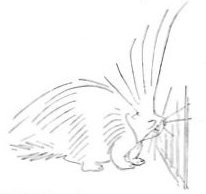
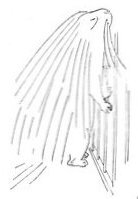
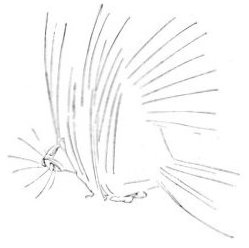
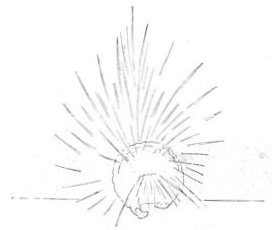
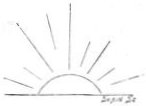
By the Authors of "The Medicine Lady."
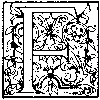
Few cases in their day interested me more than that of Beryl Temple, and this, not so much from the medical point of view as from the character of this strong-minded and brave girl.
It was on the occasion of her mother's death that I first became acquainted with Beryl. She suffered keenly at the time, but her courage and presence of mind and fine self-suppression aroused my interest, and when, a month afterwards, she came to me and told me in the simple manner which always characterized her that she was not only friendless but without means of support, I eagerly asked in what way I could help her.
She replied with a blush, and something like tears in her eyes.
"Of all things in the world," she said, "I should like best to be trained as a hospital nurse—do you think I am suited to the profession?"
"Admirably," I replied. "You have nerve and self-control; you have also good health and, although I am sure that you have plenty of heart, you would never be mawkishly sentimental."
"Oh, no," she answered; "I am glad you approve."
"I cordially approve," I replied. "In many cases the profession of nursing is best undertaken by women who are not too highly cultivated, and whose position is below that of the supposed lady—but you, Miss Temple, will make an admirable nurse. Your peculiar characteristics fit you for this calling."
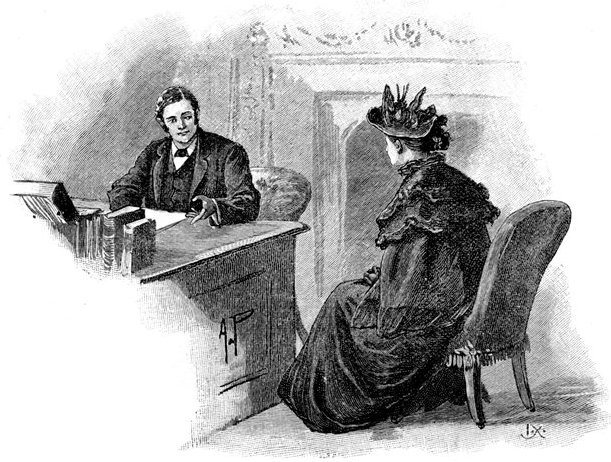
"I CORDIALLY APPROVE."
I saw by the expression on her face that my words pleased her. I helped her to take the necessary steps to become a probationer at one of the large hospitals. She entered on her profession with enthusiasm—her time of training passed without hitch, and in due course I placed her on my own special staff of nurses.
I had been by no means mistaken in Miss Temple's qualifications—her nerve was wonderful, her tact perfect. Although slight and rather delicate looking, she had a great reserve of strength, and I never knew her to break down or fail in any way, even when the case she had to attend to was involved in serious difficulties.
For nervous cases in especial, I found Miss Temple invaluable, and it so happened that she was the first person I applied to in the case of a very peculiar patient, Lady Violet Dalrymple.
I was sent for to the country to see Lady Violet in the autumn of the year 1889.
I remember the night when the telegram came to me from her mother, the Countess of Erstfield. Lady Violet was the only child—a girl of seventeen. Lady Erstfield had[Pg 607] once brought her to see me in town. I then considered her an overgrown, somewhat nervous girl, had ordered change, a quiet life, plenty of fresh air, plenty of nourishment, plenty of congenial occupation, and had felt assured that if these remedies were systematically followed out, the young girl would quickly recover from the nervous derangements which were just then interfering with her health and happiness.
By the tenor of Lady Erstfield's telegram, however, I feared that this was not the case.
"I am very anxious about Violet. Come without delay," she wired.
I replied by telegram that I would arrive at Beeches by a late train that evening. I did so. Lady Erstfield was up. I had a long interview with her, and got all possible information with regard to my patient's state of health. I did not see Lady Violet herself, however, until the following morning.
At an early hour that day, I was taken into the pretty boudoir, where I found my patient lying on a sofa. It was a room furnished with all that taste, money, and love could suggest. Books, flowers, pictures, birds in cages, all that was gay and bright, surrounded the lovely girl who lay pale and languid on a sofa drawn close to the open window. This window commanded a perfect view of river, wood, and meadow, with a distant peep of low-lying hills against the horizon. To my eyes, accustomed to London bustle and noise, this view alone was restful and delightful.
Drawing a chair forward, I sat down by my patient and entered into a common-place talk with her. I had purposely asked Lady Erstfield to leave us, for I knew by experience that in nervous cases the patient was far more inclined to be confidential and to reply truthfully to questions when alone with the physician.
Having carefully examined Lady Violet, and made certain that she was suffering from no organic disease, it only remained for me to conclude that she was a victim to one of those many ill-defined and misunderstood nervous disorders, which, by their variety and complexity, present the greatest difficulty in medical practice.
The treatment I saw at once must be moral, not medical.
"I don't find much the matter with you," I said, cheerfully; "your disease is more fancy than reality—instead of lying here, you ought to be having a gallop across those moors yonder."
Lady Violet gazed at me with a look of surprise and even faint displeasure in her large brown eyes.
"I love riding," she said, in a gentle voice, "but it is long since I have had the pleasure of a canter over the moors or anywhere else."
"You should not give up riding," I said; "it is a most healthful exercise and a splendid tonic for the nerves."
"I don't think you can realize how very weak I am," she answered, something like tears dimming her eyes. "Did not mother explain to you the strange symptoms from which I suffer?"

"DRAWING A CHAIR FORWARD, I SAT DOWN BY MY PATIENT."
"The symptoms of which you complain are clearly due to an over-wrought imagina[Pg 608]tion," I replied. "You must try to curb it by every means in your power. I assure you I am only telling you the true state of the case when I say that there is nothing serious the matter with you."
She sighed and looked away from me.
I took her slim hand in mine and felt her pulse. It was weak, fluttering, and uneven. I bent forward and looked into her eyes—the pupils were slightly dilated. Still I held firmly to my opinion that nervous derangement, that most convenient phrase, was at the bottom of all that was wrong.
"Now," I said, rising as I spoke, "I will prescribe a drive for you this afternoon, and in a day or two, I have no doubt, you will be strong enough to get on horseback again. Take no medicines; eat plenty, and amuse yourself in every way in your power."
Soon afterwards I left the room, and saw Lady Erstfield alone.
"Your daughter is an instance of that all too common condition which we call neurasthenia," I said. "Although, unlike the name, the disease is not a coinage of the nineteenth century, still it has greatly increased of late, and claims for its victims those who have fallen out of the ranks of the marching army of women, in the advancing education and culture of their sex."
"I don't understand your placing Violet in that position," said Lady Erstfield, with reddening cheeks.
"My dear madam," I replied, "your daughter is the undoubted victim of over-culture and little to do. Were she a farmer's daughter, or were she obliged in any other way to work for her living, she would be quite well. The treatment which I prescribe is simply this—healthy occupation of every muscle and every faculty. Do all in your power to turn her thoughts outwards, and to arouse an active interest in her mind for something or someone. I assure you that although I am not anxious about her present state, yet cases like hers, if allowed to drift, frequently end in impairment of intellect in some degree, either small or great."
Lady Erstfield looked intensely unhappy. "Violet is our only child," she said; "her father and I are wrapped up in her. Although you seem to apprehend no danger to her life——"
"There is none," I interrupted.
"Yet you allude to other troubles which fill me with terror. There is nothing Lord Erstfield and I would not do for our child. Will you kindly tell me how we are to provide her with the interests and occupations which are to restore her mind to a healthy condition?"
I thought for a moment.
"Lady Violet is very weak just now," I said, "her whole constitution has been so enfeebled with imaginary fears and nervous disorders that a little good nursing would not come amiss for her. I propose, therefore, to send a nurse to look after your daughter."
Lady Erstfield uttered an exclamation of dismay.
"A hospital nurse!" she exclaimed; "the mere word will terrify Violet into hysterics."
"Nothing of the kind," I answered. "The nurse I propose to send here is not an ordinary one. She is a lady—well born and well educated. She is extremely clever, and is remarkable both for her tact and gentleness. She thoroughly understands her duties—in this case they will consist mainly in amusing Lady Violet in the most strengthening and invigorating manner. Her name is Temple. I will ask you to call her Miss Temple, and never to speak of her or to her as nurse. She will soon win her own way with your daughter, and I shall be greatly surprised if she does not become more or less indispensable to her. She is just as healthy-minded, as bright, as strong as Lady Violet is the reverse."
After a little more conversation with Lady Erstfield, it was arranged that Miss Temple was to be telegraphed for at once.
I wrote her a long letter, giving her full directions with regard to the patient. This letter I left with Lady Erstfield, and asked her to deliver it to Miss Temple as soon as ever she arrived. I then went to bid Lady Violet good-bye.
She looked even more wan and exhausted than when I had seen her in the morning. I thought it well to let her know about Miss Temple's arrival.
"She is a thoroughly nice girl," I said. "She will nurse you when you want to be nursed, and amuse you when you wish to be amused, and let you alone when you want quiet, and you will find her so fresh and bright and entertaining that you will soon, I am persuaded, be unable to do without her. Good-bye, now—I hope you will soon be much better, both for your mother's sake and your own."
Lady Violet raised her brows.
"Is mother unhappy about me?" she asked.
"She loves you," I replied, steadily, "and is getting quite worn out with anxiety about[Pg 609] you. I wish her mind to be relieved as soon as possible, and I think it is your duty to do what you can towards this end."
"What can you mean?" asked Lady Violet.
"In your mother's presence," I answered, "you ought to endeavour as much as possible to overcome the melancholy which has taken such possession of you. Seem to be gay, even when you don't feel it. Try to appear well, even when you don't think you are. When you are alone with Miss Temple, you can do, of course, exactly as you please. But when with your father and mother, you ought to make a strenuous effort to overcome the morbid feelings, which are due entirely to the nervous weakness from which you are suffering."
Lady Violet looked at me intently.
"I love my father and mother," she exclaimed. "I would not willingly hurt the feelings of either. But, oh! how little you know what I suffer when you speak of my suppressing my trouble and terrible depression. Am I not always—always suppressing my fears? Oh, how hateful life is to me—how distasteful, how hollow. I should like to die beyond anything, and yet I am such a coward that the near approach of death would terrify me. Why was I born to be so miserable?"
"You were born to be happy," I answered, "or, at least, to be useful and contented. Your fear of death is perfectly natural, and I hope it will be many a long day before you are called upon to resign so precious a possession as life. Remember, you have only one life—use it well—you will have to account for it some day; and now, good-bye."
I returned to London, and in about a week's time I received a letter from Miss Temple. It satisfied me thoroughly. Lady Violet was better. She went out for a little daily. She read to herself, and allowed Miss Temple to read to her. She was interested in a fancy fair which was to be held in the neighbourhood, and was helping Miss Temple to work for it. The nurse had also discovered that her patient had a love, almost a passion, for music. Miss Temple was an accomplished pianist before she took up her present profession, and she and Lady Violet spent a considerable portion of each day over the piano.
In short, Miss Temple was doing all that I expected her to do for the young girl whose life was so valuable. Lady Violet was undoubtedly already acquiring that outward view which means health both of mind and body.
Miss Temple's first letter was followed in the course of time by another, which was even more hopeful than the first. Lady Violet was devotedly attached to her, and could scarcely bear her out of her presence. The girls rode together, walked together, sketched and played together. The colour of health was coming back to Lady Violet's pale cheeks; she would soon, in Miss Temple's opinion, be restored to perfect health.
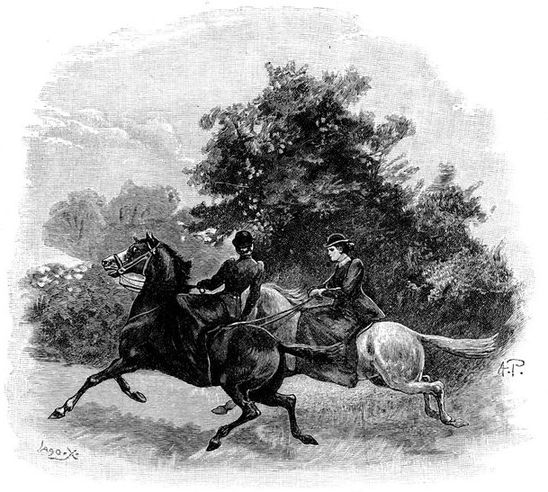
"THE GIRLS RODE TOGETHER."
Lady Erstfield also wrote to me about this time, and spoke in rapture of the companion whom I had secured for her daughter.
"I cannot tell you what Beryl Temple is to us," she said; "we owe Violet's recovery to her wonderful tact, her sympathy, her genius. She is like no girl I ever met before—she fascinates and subjugates us all—we do not want ever to part with her—as to Violet, it would almost kill her, I think, were Beryl Temple now to leave us."
About a month after receiving these two letters I was astonished and much pleased to see an announcement in the Morning Post to the effect that a matrimonial alliance was arranged between Lady Violet Dalrymple, only daughter of the Earl and Countess of Erstfield, and Captain Geoffrey Ponsonby, of the Coldstream Guards, and that the marriage was likely to take place in December.
On reading this short paragraph I turned to my case-book, and under Lady Violet's name made the following note:—
"A case of neurasthenia, in which environment with moral treatment caused recovery."
I then dismissed the subject from my mind, with the final reflection that I should not have much more to do with Lady Violet.
The following circumstances quickly proved my mistake.
On the evening of that same day I had a letter from Miss Temple, confirming the news of the approaching marriage; telling me that it had been contemplated for some time by the parents of the young people, but that a formal engagement had been deferred owing to the state of Lady Violet's health. Captain Ponsonby had arrived at Beeches about a fortnight ago, had proposed for Lady Violet, who had accepted him not without a certain unwillingness, and the marriage was arranged to take place immediately after Christmas.
"Lady Violet is not as well as I could wish," continued Miss Temple, towards the close of her letter. "At first she refused absolutely to engage herself to Captain Ponsonby, but yielded to the entreaties of both her parents, who are most desirous for the match. She is once more languid, and inclined to be uninterested in her surroundings. I am not satisfied about her state, and deeply regret Captain Ponsonby's arrival—she was really in radiant health when he came to the house a fortnight ago. Lord and Lady Erstfield quite fail to observe their daughter's state of depression—they are both in the highest spirits, and active preparations for the wedding are going forward."
This letter caused me uneasiness—it was followed almost immediately by a second.
"Dear Dr. Halifax," wrote Miss Temple, "I am in great, in dreadful, trouble—not alone about Lady Violet, whose condition alarms me much, but on my own account. In short, I am bewildered by the fearful calamity which has suddenly overtaken me. I have not a soul to confide in, and greatly long to see you. I know I must not expect you to come here, and yet it is impossible for me, under existing circumstances, to ask for a day off duty. God help me; I am the most unhappy girl in the world!
"Yours sincerely,
"Beryl Temple."
I received this letter by the last post one night. It caused me some wakeful hours, for I was greatly puzzled how to act. By the morning I resolved to write a line to Lady Erstfield, telling her that I had heard from Miss Temple of Lady Violet's altered condition, and offering to come to see her. That letter was not destined to be written, however. As I was sitting at breakfast a telegram was put into my hand. It was from Lord Erstfield, requesting me to go to Beeches immediately.
I started off by an early train and arrived at my destination about noon. I was shown at once into a reception-room, where Lady Erstfield awaited me.
"It is good of you to respond so quickly to our telegram," she said. "We are in terrible trouble here. Violet is in the strangest condition. She is very feverish; her strength seems completely gone. She lies hour after hour moaning to herself, and takes little notice of anyone."
"How long has this state of things gone on?" I asked.
"The complete breakdown only took place yesterday, but Miss Temple assures me that Violet has been failing for some time. Her father and I noticed on one or two occasions that she seemed pale and languid, but as there was a good deal to excite her, we put her fatigue down to that source. Under your judicious treatment and the admirable care Miss Temple gave her, we considered her perfectly recovered, and it did not enter into our minds that a recurrence of the old attack was possible."
"When you speak of Lady Violet having much to excite her, you doubtless allude to her engagement?" I said. "I saw it officially announced in the Morning Post. I judged from it that she had quite recovered."
Lady Erstfield coloured.
"We thought so," she said; "her father and I both thought so. We were much pleased at the contemplated marriage, and we imagined that our child was happy, too. Captain Ponsonby is all that anyone can desire."
"And you have reason not to be satisfied now?" I asked.
"The fact is this," said Lady Erstfield, shortly: "Violet is unhappy—she does not wish the engagement to go on. She told Miss Temple so this morning. I have seen my dear child on the subject an hour ago—we cannot account for her caprice in this matter."
"I will see Lady Violet now, if you will permit me," I said. "The engagement is, doubtless, the cause of this strange breakdown. Will you take me to her room?"
Lady Erstfield led the way without a word.
I found my patient even worse than her mother had given me to understand. In addition to much nervous trouble, she had unquestionably taken a chill of some sort, and symptoms of pneumonia were manifesting themselves. When I bent over her, I noticed the deep flush on her cheeks, her eyes were closed—her breathing was short and hurried. Miss Temple was standing by the bedside—she gave me an earnest glance, her face was as pale as Lady Violet's was flushed. I noticed that Lady Erstfield avoided speaking to the nurse, who, on her part, moved slightly away as she approached. The despair, however, which must have filled the poor mother's heart as she watched her suffering child might in itself account for her manner. I was very anxious to see the nurse alone, and asked Lady Erstfield if I could do so.
"Certainly," she answered; "I will watch here until Miss Temple is able to resume her duties."
"I will not be long away," answered Beryl. She took me at once into Lady Violet's pretty little boudoir and shut the door.
"I must be very quick," she said, "my place is with Violet. You think her very ill?"
"I do," I answered. "Her life is in danger. She is threatened with pneumonia. If the symptoms grow worse, she will not have strength to bear up under the attack."
"Oh, then, I must not think of myself—even now I manage to soothe her as no one else can. Let me go back!"
"Sit down," I answered; "you will not be fit long to nurse anyone unless you look after yourself. What is the matter with you? You are greatly changed!"
"Did I not tell you in my letter that I am in great trouble?"
Miss Temple's words were interrupted by a knock at the door of the boudoir.
She said "Come in," and a manservant entered. He approached Lady Violet's little writing-table, disturbed a book or two, and finally retreated with an "A B C" in his hand, apologizing as he did so.
"Do you know who that man is?" asked Miss Temple.

"HE APPROACHED LADY VIOLET'S WRITING-DESK AND DISTURBED A BOOK OR TWO."
"One of the servants," I replied; "never[Pg 612] mind him—tell me your trouble as quickly as possible."
"He is connected with it, unfortunately. He is not one of the usual servants of the house, although he wears the livery. That man is a detective from Scotland Yard, and he came into the room just now to watch me. He, or his fellow detective, for there are two here, watch me wherever I go. On one excuse or another, they enter each room where I am found."
"What do you mean?" I asked.
"I will tell you in as few words as possible—can you wonder that I am changed?"
"I am lost in conjecture as to what you can possibly mean," I answered, looking at her anxiously.
In truth I had cause for my anxiety.
Her fine face looked absolutely aged and worn. Her eyes were almost too large—their expression was strained—they had heavy black lines under them. Her mouth showed extreme dejection. When I remembered the blooming, healthy girl who had gone to Beeches two months ago, I was appalled by the change.
"Speak," I said; "I am deeply interested. You know that I will do everything in my power to help you."
"This is my story," she said: "Lady Violet got quite well—I was much attached to her, we were very happy—it seemed like the old life back again, when my mother was alive and I had a luxurious home. Lord and Lady Erstfield treated me more like a daughter than a nurse; Lady Violet was my dear sister. Then Captain Ponsonby came. He proposed, and was accepted. Immediately after the engagement Lady Violet drooped; she no longer gave me her confidence; she lost her appetite; she became constrained and silent. Once or twice I caught her crying—she turned away when I tried to question her. Lord and Lady Erstfield noticed no change, and Captain Ponsonby came and went as an honoured guest. No one seemed to notice the efforts Lady Violet made to seem at home in his society.
"One morning about ten days ago Lady Erstfield, accompanied by Captain Ponsonby, came into this room, where I was reading aloud to my dear little patient. I could not imagine why they did not observe her pale cheeks and her languor. I saw, however, at a glance that Lady Erstfield was in a high state of excitement and delight. She held a jewel-case in her hand. She opened it and, bending down, showed its glittering contents to her daughter. I was startled at the effect on Lady Violet. She clapped her hands in ecstasy and sat upright on the sofa. Her eyes had grown suddenly bright, and her cheeks rosy.
"'How I adore diamonds,' she said, 'and what beauties these are: oh, you lovely creatures! But, mother, why do you show them to me?'
"'They are my present to you, Violet,' said Captain Ponsonby. 'These diamonds are heirlooms in the family, and are of great value. They will be yours when we are married.'
"'Come and look at them, Beryl,' exclaimed Lady Violet. 'Are they not splendid?' As she spoke she lifted a diamond necklace of extraordinary brilliancy and quaint device out of the case. I knelt down by her and examined the gems with delight almost equal to her own. I have always had a great love for jewels, and for diamonds in particular, and these were quite the most magnificent I had ever seen. The necklace was accompanied by a tiara and earrings, and the gems were worth, Lady Erstfield said, from fifteen to twenty thousand pounds.
"We spent some time examining and criticising them. Violet sent for a looking-glass from one of the bedrooms in order to see the effect of the jewels round her throat. She insisted on my trying them on as well as herself. Lady Violet is fair, but, as you know, I am very dark. I could not help seeing for myself that the jewels suited me. Lady Violet uttered an exclamation when she saw them on me. 'You look beautiful, Beryl,' she said.
"I laughed, and was about to answer her, when I met Captain Ponsonby's eyes. There was something in his expression which I did not quite like. I unfastened the necklace quickly and laid it back in its velvet bed.
"'Thank you for letting me try it on,' I said. 'I feel as if for one brief moment I had imprisoned the rainbow.'
"I don't know why I said those words. They did me no good afterwards, but I was excited at the time. The magnificent diamonds had really cast a spell over me. Lady Erstfield suggested that Violet should go out for her usual ride.
"'No, mother; I am too tired,' she replied. 'I will drive instead, and Beryl shall come with me.'
"'Run and get ready, then,' said Lady Erstfield to me.
"I was leaving the room when she suddenly called me back.
"'My dear,' she said, giving me the case[Pg 613] which held the diamonds as she spoke, 'will you have the goodness to take these to my room, and lock them up in my jewel safe? Here is the key. You must turn the lock twice, and when the revolving shutter moves back, use this smaller key to unlock the inner compartment. Put the case in there, and bring me back the keys when you have changed your dress.'
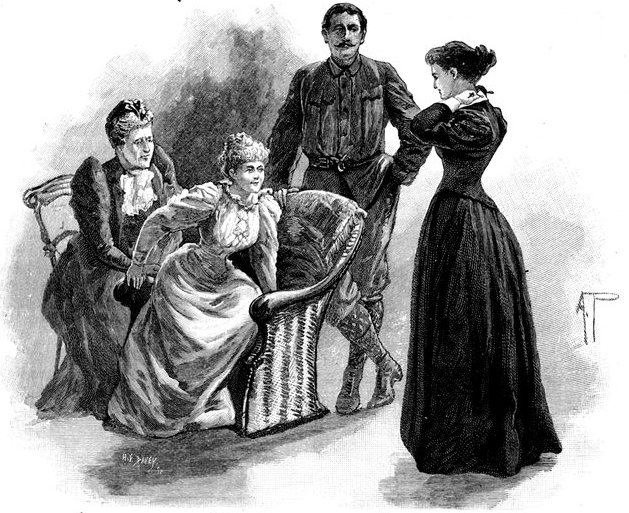
"YOU LOOK BEAUTIFUL, BERYL!"
"I promised to obey, and ran off with a light heart.
"The safe where Lady Erstfield kept her jewels was built into the wall, and was of a very ingenious device. Following her directions implicitly, I opened it, placed the case within, and locked the safe carefully again. I then went and changed my dress and returned the keys to Lady Erstfield. Captain Ponsonby, Lady Violet, and I had a pleasant drive, and nothing more was said about the diamonds—I really think we all forgot them.
"The next morning Lady Violet came down to breakfast, looking so ghastly pale and so depressed, that even her mother uttered an exclamation of surprise when she saw her.
"'My darling, you look positively ill,' she said, going up and kissing her.
"Lady Violet gave her a startled and queer look. She made some remark in a very low voice, and with a pettish movement. She then crossed the room to my side, and Lady Erstfield did not question her any further.
"Just as we were leaving the breakfast-table, Captain Ponsonby announced his intention of running up to town for the day, and suddenly suggested that he should take the diamonds with him in order to give the jeweller plenty of time to re-set them in the most thorough manner.
"'That is a good thought, Geoffrey,' said Lady Erstfield. Then she turned to me.
"'You know where the jewels are, Beryl,' she said—'here are my keys—run, dear, and fetch them. I don't allow even my own maid to know the secret of my jewel safe,' she continued, looking at Captain Ponsonby as she spoke.
"I ran away, reached Lady Erstfield's room, unlocked the safe, and put in my hand to take out the case. It had vanished. I searched for it at first without any uneasiness, then in bewilderment, then in a sort of frantic terror. There was the empty spot on the floor of the safe where I had placed the case—there were the other cases[Pg 614] of jewels pushed aside in some little confusion, but the Ponsonby diamonds had absolutely vanished.
"The full horror of the situation had not yet burst upon me—I had not yet even begun to think that anyone would suspect me, but, nevertheless, I felt sick with a sort of nameless terror.
"I locked the safe and returned to the breakfast-room.
"Lord Erstfield was standing by the hearth, talking to Captain Ponsonby—Lady Erstfield was reading the Times, and Violet was kneeling on the floor playing with her favourite pug. Their peaceful faces added to my misery. I know I must have looked wild and frightened—I know when I spoke that my voice must have shaken.
"'The diamonds are gone,' I said; 'they are not in the safe.'
"It was just as if I had flung a bomb into the midst of the cheerful party. Lord Erstfield drew himself up with a dazed expression. Captain Ponsonby turned white, and Lady Erstfield, with a sharp cry, rushed from the room, snatching the keys from my hand as she did so.
"'There is no use in Lady Erstfield examining the safe,' I said, 'the diamonds are certainly not there—I have searched all the shelves. The spot where I placed them yesterday is empty; the case has vanished.'
"'I don't believe it,' said Violet. 'The diamonds must be there. You must be mistaken, Beryl.'
"I made no reply, but when the others left the room I followed.
"We all now went up in a body to Lady Erstfield's room, and the safe was carefully examined by Lord Erstfield and Captain Ponsonby. The case containing the diamonds was indeed missing, but not another jewel, not even the smallest ring had been touched. There was no mark of the safe having been tampered with in any way, and as it was made on a perfectly unique pattern, and there was not supposed to be a key in the world to fit it, except the special ones made for it, the whole affair seemed buried in hopeless mystery. No one accused me in any way, and it never occurred to me, as I stood in that room, to accuse myself. We discussed the matter in all its bearings. We stood round the open safe and talked until we were tired. I described the exact position in which I had placed the case. Lady Erstfield was certain that from the moment I returned her the keys they had not been out of her possession until she had again placed them in my hands that morning.
"Finally we left the room in a state of hopeless bewilderment. Violet and I went away by ourselves, and, sitting down together, discussed the strange mystery from every point of view. The loss of the jewels had much excited her. She had regained her colour and her manner was quite animated.
"'I thought, at least, I should have the diamonds,' she said, with a queer sort of desolate echo in her voice, 'and I love diamonds: they seem to comfort me in the strangest way. I feel akin to them. When they sparkle and leap and glitter, they appear to me to be alive; they tell me secrets of the strange things they have witnessed in the course of their long existence. Think, if the Ponsonby diamonds could speak, what stories they could tell of the queer, queer things they have seen and heard; eh, Beryl?'
"I tried to turn the conversation—Lady Violet was always worse after indulging in wild talk of this sort.
"'We have now to consider how to get the Ponsonby diamonds back,' I said. 'Who can have stolen them?'
"We talked the matter threadbare, arriving, of course, at no conclusion.
"At lunch we were surprised to find that Captain Ponsonby had not gone to London. When the servants withdrew, we were told that the affair of the diamonds had been put not only into the hands of the local police, but that the authorities in Scotland Yard had been communicated with, and that in all probability a couple of detectives would be sent to Beeches that night.
"'We have decided,' said Lord Erstfield, 'not to say anything of our loss to the servants. The person who stole those diamonds is quite clever enough to hide them if the least alarm is raised. Our best chance of recovering the treasure is through detectives, who will come here, of course, in plain clothes. We are expecting several fresh guests to-morrow, and in consequence the servants have heard that two new men-servants from London are coming here to help them. We have communicated this fact to Scotland Yard, and the men will be provided with the house livery.'
"After making this statement, which he did very briefly, Lord Erstfield left the room.
"The early part of the afternoon passed listlessly. Lady Violet was once more pale, deadly tired, and too languid to care to do anything. I persuaded her to lie down, and offered to read her to sleep.
"'No,' she answered; 'I don't want anyone to read to me. I will shut my eyes and think of the diamonds. Go and take a walk, Beryl; you look pale and tired yourself.'
"I saw she did not want me, and, putting on my hat, I went out for a stroll. I had gone a little way from the house when I heard footsteps behind me. I turned and saw, to my surprise, that Captain Ponsonby was following me.
"'I noticed that you had gone out,' he said, 'and took the liberty of coming after you.' He grew red as he spoke. 'I want to say something to you,' he said; 'something of importance. Can we go somewhere where we can be alone?'
"I told him that I was going to walk through the shrubbery, and that he might, if he pleased, accompany me there; 'but,' I added, 'I shall not be out long, for I am anxious about Lady Violet and want to return to her.'
"We entered the shrubbery as I spoke. He did not speak at all for a moment; then he said, with a sort of abruptness which surprised me:—
"'I will not keep you long. I am glad of this opportunity.' Here he paused, and, turning, looked me full in the face.
"'If you will give me back the diamonds,' he said, 'I will faithfully promise to arrange matters so that not a breath of suspicion shall rest upon you.'
"I felt as if I were shot. His words took me so completely by surprise that I could not find either breath or speech for a moment.
"'Do you really think,' I said then, in a choking voice—'is it possible that you think, really, that I—I have stolen the diamonds?'
"I suppose my agitation confirmed his suspicions.
"He looked at me with a queer sort of pity.
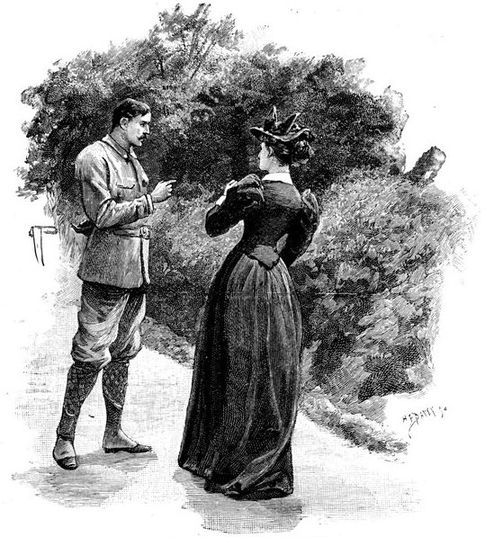
"I FELT AS IF I WERE SHOT!"
"'I could see yesterday how struck you were with their beauty,' he said. 'Do you remember what you said about imprisoning the rainbow? The opportunity to take the diamonds was put into your hands. You could not resist the sudden temptation, but I am sure you are sorry now, and would return them if it were possible. I believe I can manage this for you, if you will confide in me.'
"I turned quickly; my face was hot; my heart was beating so fast I thought it would burst.
"'Come with me at once to Lady Erstfield,' I said; 'say those words again in her presence. She shall search all my possessions. Come, don't delay a moment.'
"'You must be mad,' he said. 'For Heaven's sake don't inculpate yourself in that manner. As far as I am aware, I am the only person who, at present, suspects you. It has never, I know, even entered into Violet's head that you could have had anything to do with the robbery, and Lord and Lady Erstfield, I am sure, think you as innocent as themselves—they are the most loyal people in the world—they believe, and rightly, that they owe Violet's life to you. I don't think they could harbour an[Pg 616] unkind thought of you. Lord Erstfield and I have talked over the loss for a couple of hours this morning, and your name has not once been mentioned in connection with it—I alone ——.'
"'You alone,' I interrupted, 'entertain this horrible doubt against a defenceless girl?'
"'I am very sorry,' he replied, in a steady voice, 'but it is not even a doubt.' Here he looked full at me. 'In my mind it takes the form of a certainty. It is absolutely impossible that anyone else could have taken the diamonds. They are gone—you were last seen with them—you put them into the safe. You returned the keys to Lady Erstfield, who did not let them out of her possession until she gave them to you again this morning. You must see for yourself what the logical conclusion is—you are the culprit.'
"'No one else has come to that logical conclusion,' I answered.
"'I am a man of the world,' he replied.
"I stood perfectly still for a moment. His cool assurance seemed to deprive me almost of the power of thought. I turned to walk towards the house, but he barred my path.
"'What can I do to induce you to be guided by my common-sense?' he said. 'I can understand the sudden temptation—if you return the jewels to me, not a shadow of suspicion shall ever rest upon you from any other quarter.'
"'I think,' I said, in a trembling voice, 'that the only thing for me to do will be to adhere to my first resolution, to see Lady Erstfield in your presence—to ask you to accuse me of the theft before her—to insist upon having all my possessions searched, and then to leave Beeches immediately.'
"'You won't screen yourself by any such plan,' said Captain Ponsonby—'nay, your wish to leave Beeches will seem to all interested as a certain proof of your guilt. I wish I could get you to understand that I do not feel unkindly to you—that I am sincerely anxious to be your friend in this matter. I know you to be guilty. If you protested from now until Doomsday, the firm conviction in my mind would still be unshaken. May I state the case very briefly to you? Will you try and listen as if I were telling you about some other girl? You took the diamonds in a moment of acute temptation. You are, I presume, a penniless girl. You admired the gems, not only for themselves but also for the effect they produced when they shone like so many suns round your warm, white throat. The price of these jewels was named in your presence. If you could sell them, you would be rich—if you could keep them and wear them, you would be beautiful enough to turn any man's head. Yes, I understand—I pity, and I am most anxious to screen you. No one else suspects you at present at Beeches, but that state of things will not continue there much longer. As soon as the detectives from London arrive, their suspicions will naturally be fastened on you. Your youth and apparent innocence will in no way deceive them. They will whisper doubts into the minds of Lord and Lady Erstfield, and into the mind also of Lady Violet. The Ponsonby diamonds are of immense historical importance—they have been mixed up with the fortunes of the family for a couple of centuries, and it is absolutely impossible that a girl like you can hide them successfully. Go where you will, you will never be able to sell that necklace and pendant. Each diamond has a story, and can be traced by experts into whatever hands it falls. You can never sell the necklace, nor would you ever dare to wear it, except in the privacy of your own room. I beg of you, therefore, to let me have it back, and I solemnly swear that the secret shall never pass my lips.'
"I listened to Captain Ponsonby's speech with great attention. The buzzing in my ears and the great tumult round my heart had now to a considerable extent subsided. I was able to bring my common-sense to bear upon the matter, and to absolutely force myself to look the facts in the face as they were presented to me from Captain Ponsonby's point of view. Strange as it may seem, my whole nature became subjected to a sort of revulsion, and far now from being angry with Captain Ponsonby for his accusations, I could not but admire something chivalrous in him which made him come as he thought to my assistance. My only wonder now was, that the Erstfields and Lady Violet were not also convinced of my guilt.
"I remained silent, therefore, for a couple of minutes before I replied.
"'I understand,' I said then, slowly, 'you have explained the position of affairs. I see plainly how very black the circumstantial evidence is against me. I am not surprised at your suspicions, and my wonder is that they are not shared by the rest of the family. As it happens, I am not the thief you imagine me.'
"When I said this, he sighed heavily, shook his head, and, turning, began to walk slowly back with me towards the house.
"'I am not a thief,' I continued, 'for the simple reason that the temptation you spoke about did not exist. The beauty of the gems attracted me yesterday, and I looked at them with pleasure, as I like to look at all lovely things, but I never coveted them; the thought never even occurred to me to wish to possess them. I am not as other girls—my life is consecrated—consecrated to the cause of suffering and pain. I live to help people who are obliged to keep on the shady side of life. My whole mind and heart are occupied with these people and their concerns. I do not want money, for my profession supplies me with plenty, and if I had diamonds ten times as beautiful, when, as a professional nurse, could I wear them? I have listened to your side of the affair—I must beg of you to listen to mine. You must see for yourself that, the temptation not existing, it could not be acted upon. I believe you mean kindly by all that you have said, and I thank you for the kindness. Now I will go indoors.'
"I left him—he did not say another word, but I saw by the expression of his face that I had only puzzled without convincing him.
"I went straight up to my own room, and sitting down, thought over the queer turn of events. The horror of the thing grew greater and greater the more I thought it over. I felt torn in two—longing one moment to rush to Lady Erstfield and tell her everything, and the next being kept back by the thought that by so doing I might only put a suspicion into her head which did not exist.
"I was presently sent for to attend to Violet. She had awakened after a bad dream and was in a very uncomfortable and depressed condition. Notwithstanding my own great unhappiness, I could see that she had something on her mind, but although I did all in my power to break the ice, I could not get her to talk to me in a free and natural manner.
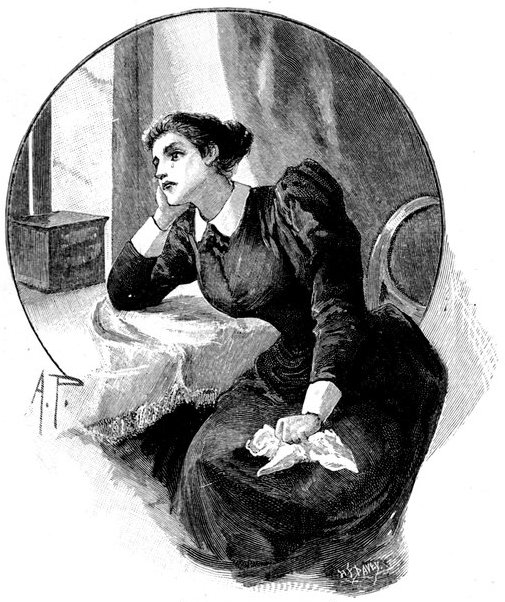
"I FELT TORN IN TWO."
"That evening the detectives arrived from London, and the next day several visitors came to the house. Everything went on with outward smoothness, and the subject of the diamonds was by mutual consent never alluded to. Lady Violet grew worse, and the gay house party dispersed sooner than was intended. Captain Ponsonby stayed on, however. I met him occasionally, but we scarcely exchanged a word. I could see that he was anxious and haggard, but I set this down to his fears with regard to Lady Violet, who steadily refused to see him, and never left her bedroom and boudoir. I spent almost all my time with her, but as the days wore on I could not but feel the horror of my position more and more. I saw plainly that the suspicion which Captain Ponsonby harboured was shared by the two detectives, and also, in process of time, the poisonous thought was communicated to Lord and Lady Erstfield. Lady Erstfield's manner to me completely altered. Instead of treating me with almost the affection of a mother, she was cold and distant; she avoided meeting my eyes, and never spoke to me on any subject except what related to Violet's health. That is the position of affairs to-day, Dr. Halifax. I am suspected of the most horrible theft, and have not a chance of clearing myself. Lady Violet alone[Pg 618] loves me as of old. She is my dear sister, and for her sake I——"
Here the poor girl completely broke down, and, covering her face with her hands, sobbed aloud.
"Take courage," I said to her. "I have, at least, one bit of comfort for you: I also fully believe in you. You no more stole the diamonds than I did."
"Oh, thank you—that is like you," she said. "God bless you for those words."
"I am glad I have come here, for every reason," I continued. "My presence here is necessary not only on account of Lady Violet, but also on your account. I introduced you to this house, and am responsible for your conduct; I shall therefore not leave a stone unturned to clear you, and now you must go back to your work with as brave a heart as you can."
She rose at once, wiping her eyes and trying to look cheerful.
"One word before you return to Lady Violet," I said. "Is it true that she has broken off her engagement?"
"Yes."
"Lady Erstfield told me that she gave you her confidence in this matter."
"Yes, she spoke to me this morning."
"Do you mind telling me what she said?"
"She was very weak and had a difficulty in using her voice, but she whispered to me. Her words were something like these:—
"'Tell my father and mother that I do not love Captain Ponsonby, and will never marry him. From the first he never attracted me, and now there is no inducement—not even the diamonds!'"
"Did she really say 'not even the diamonds'?"
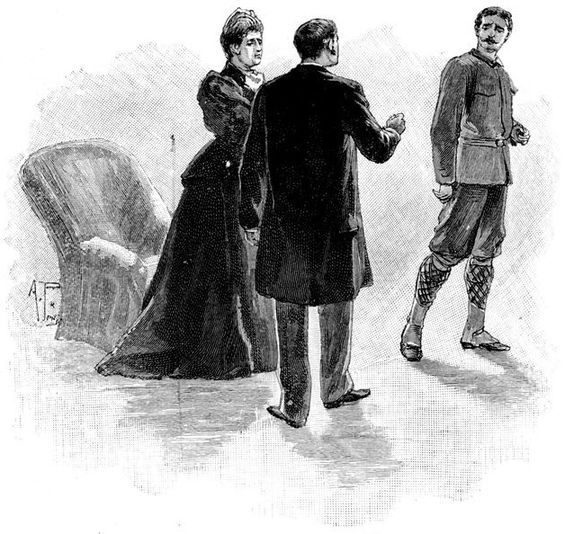
"I BEG OF YOU NOT TO GO."
"Yes, she certainly did. I thought it strange at the time."
"It was undoubtedly strange. Now go back to your patient and keep up all the courage you can. I shall remain at Beeches until to-morrow, and even longer if necessary. I wish to take care of Lady Violet myself to-night, in order to give you rest."
Miss Temple left the room, and after thinking matters over I went downstairs. Captain Ponsonby was still in the house. When I abruptly entered one of the drawing-rooms, I found him talking with Lady Erstfield.
"Can I speak to you?" I said to the lady.
"Certainly," she replied, starting up. "Is Violet worse? What is the matter?"
"There is no change in Lady Violet's condition," I replied. "What I have to speak about refers to Miss Temple."
Captain Ponsonby rose when I said this and prepared to leave the room.
I interrupted this movement.
"I beg of you not to go," I said. "I particularly want you to hear what I have come to say."
He turned and walked slowly back to one of the windows. I could see by the expression of his face that he was a good deal annoyed. He was a handsome, soldierly-looking man, of at least five-and-thirty years[Pg 619] of age, with a somewhat overbearing manner. I could understand a child like Lady Violet shrinking from him in possible fear, and yet there was nothing underhand about him. I could see that he was scrupulously honourable, although his tact would probably not be of the finest.
"I should like you to hear what I have got to say," I continued, "for you seem to be mixed up in the matter. I refer to the loss of the diamonds."
"Oh, the diamonds!" exclaimed Lady Erstfield. "Do you suppose we, any of us, care about them in an hour of terrible sorrow like this?"
"Pardon me," I continued, "there is one person who cares a great deal about them. A young girl, who came here at my recommendation—I allude to Miss Temple. It seems that you, sir,"—here I turned to Captain Ponsonby—"have accused Miss Temple in the most unmistakable manner of having stolen the diamonds. You accused her of the theft nearly ten days ago, and since then she has reason to believe that you, Lady Erstfield, share the suspicion."
Lady Erstfield's face grew pale and troubled.
"Beryl has told you," she exclaimed. "Poor child, I feared that she would not fail to see the alteration in my manner. Try hard as I would to hide my feelings, I could not treat her as I did before.
"Well," she continued, "I am sorry, deeply sorry, to say that we all, with the exception of Violet, suspect her now. She alone had access to the safe—not a breath of suspicion falls on anyone else. Miss Temple has managed to hide the diamonds with wonderful skill for the time being—but in the end she must betray herself. We wish if possible to avoid having her arrested; she is closely watched, however, for there can be little doubt of her guilt."
"And believing this," I said, in a stern voice, "you allow this girl to continue to nurse your daughter?"
"Certainly," replied Lady Erstfield; "in Violet's present condition it would kill her to part with Miss Temple."
I had some difficulty in controlling my anger.
"I am glad I have come," I said, after a pause, "and that not only on Lady Violet's account. I cannot leave Beeches until this matter is satisfactorily cleared up. It is my firm conviction that Miss Temple no more stole the diamonds than you did, Lady Erstfield."
Lady Erstfield murmured something which I could not quite hear.
"I can say with the utmost truth that we are all only too anxious to clear Miss Temple from this horrible suspicion if it can be done," remarked Captain Ponsonby.
"Oh, certainly—most certainly," added Lady Erstfield. "Anything you can suggest, Dr. Halifax——"
Her words were interrupted—there came a hurried message from the sick room. Lady Violet had awakened in a high state of delirium. Lady Erstfield and I both hurried to her side. I saw that the case was truly one of life or death, and nothing further was said about the diamonds for the present.
Towards evening the sick girl seemed to grow a little easier; she sank into another heavy slumber, and I saw, with satisfaction, that the remedies I had employed were already getting the pneumonia under. I now arranged that Miss Temple was to have a night's rest, and that Lady Erstfield and I should watch by the patient for the night.
Lady Erstfield lay down on a sofa at the far end of the spacious bedroom, and I sat by Lady Violet. Her sleep was frequently broken by sharp cries of pain and distress, but I generally managed by a firm word or touch to control her wild fits of delirium. She did not know me, however, although she submitted immediately when I spoke to her. I had many anxious thoughts to occupy me during the night watches. These were chiefly centred round Beryl Temple. I could not help seeing that there was abundant ground for the suspicion which attached to her. She was, I knew well, innocent; but unless the diamonds were discovered, grave doubts would always arise when her name was mentioned. I did not think the Erstfields would prosecute her, but I almost wished them to do so, in order to bring the matter to an issue.
As the night wore on, I fell for a few moments into an uneasy sleep. In my sleep I dreamt of the diamonds. I saw them sparkling round the neck of Lady Violet, whose eyes shone with a strange, fierce fire, which made them look almost as bright as the glittering gems. I awoke with certain words on my lips. Lady Violet had said to Miss Temple: "Now there is no inducement to my marriage—not even the diamonds." I thought the words queer at the time—I pondered over them now.
Rising from my chair, I went over to the bed and looked at the sick girl. She was breathing more quietly. I laid my hand on[Pg 620] her forehead, and knew at once that her temperature was less high.
I went across the room to Lady Erstfield. She had been asleep, but woke when I approached her.
"I think my patient is a shade easier," I said. The poor mother uttered a thankful exclamation.
"I will go and sit by her now for an hour or two," she answered. "I have had a long sleep and am refreshed. Won't you lie down, Dr. Halifax?—I will call you if Violet requires anything."
I told her that I would go into the outer room and lie on the sofa. I was by habit a light sleeper, and the least word from Lady Erstfield would bring me back to my patient. I lay down, and in a moment was asleep.
I had not slept long when the sound of conversation in the sick room aroused me.
I sprang to my feet, and went back there at once. Lady Erstfield did not hear me. She was standing, facing the bed. Lady Violet was sitting up and speaking in an eager voice.
"I am better," she said; "mother, I want the diamonds—mother, get them for me—I want to feel them and to look at them—they will comfort me—mother, do get them for me at once—the Ponsonby diamonds, you know what I mean—do, mother, dear, fetch me the Ponsonby diamonds."
"You must lie down," I said, going to the other side of the bed; "here, let me cover you up."
She turned to look at me. I forced her back on her pillow and put the bedclothes over her.
"Who are you?" she inquired, gazing at me with her bright, too bright, eyes.
"Your friend and doctor—my name is Halifax."
"Oh, have you come back again, Dr. Halifax? I like you very much. Thank you for sending me Beryl. I love Beryl. Where is she now?"
"Lying down, tired out; you must not disturb her: your mother and I will do anything for you that you want. Now you must not talk any more. Let me give you this drink."
She allowed me to put my hand under her head to raise her, and drank a little milk and soda-water, with a sigh of relief.
"That is nice," she said; "I am so thirsty."
"Turn on your side now and go to sleep," I said.
"I cannot; I cannot. Are you there, mother? Mother, don't leave me. Mother, won't you give me the diamonds? I shall sleep sound, very sound, if I may wear them round my neck! Do, mother, dear, give me the Ponsonby diamonds—you don't know how I long for them."
"My darling," said Lady Erstfield, falling suddenly on her knees by the bedside, and bursting into tears, "I would give them to you if I could; but they are lost, Violet, dear—the Ponsonby diamonds are lost."
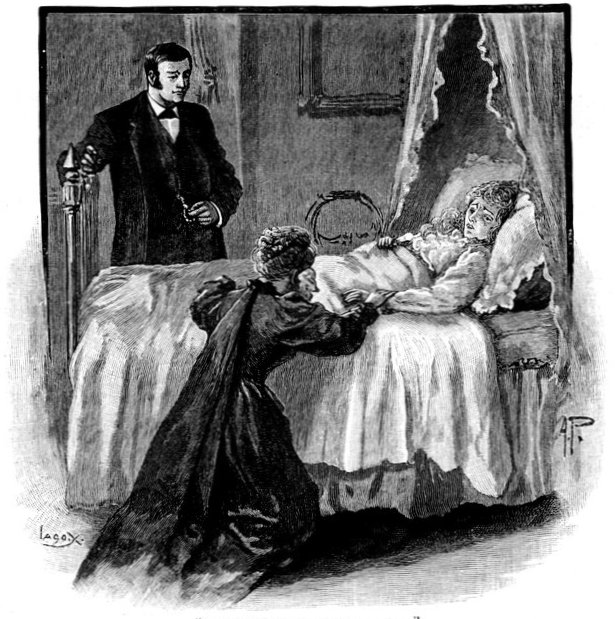
"THEY ARE LOST, VIOLET, DEAR."
"Oh! no, they aren't, mother," replied the girl, in a voice of astonishment; "they are in my jewel-case—in the lower drawer. The case[Pg 621] which holds the diamonds just fits into the lower drawer of my jewel-case. You will find my keys on the dressing-table. Do, do fetch the diamonds, mother."
Lady Erstfield sprang to her feet and looked with a kind of horrified consternation at her child.
"No, my love," she said then, in a soothing voice, "you are dreaming—you are not well and have had a bad dream. Go to sleep, my sweet darling, go to sleep."
"But I am not dreaming," said Lady Violet—"the Ponsonby diamonds are in my dressing-case. I remember putting them there quite well—I had forgotten, but I remember now quite well. Dr. Halifax, won't you fetch them?"
"Certainly," I replied. "Lady Erstfield, will you direct me to Lady Violet's jewel-case?"
"Yes," replied Lady Erstfield.
The poor woman staggered rather than walked across the room. She gave me the key of the jewel-case. I opened it and lifted out the several compartments until I came to the bottom drawer. There lay an old-fashioned morocco case. I opened it, and the Ponsonby jewels in all their magnificence lay before me.
"My God, what does this mean?" gasped Lady Erstfield.
"Hush," I said, "don't say anything—take them to her."
"You must do it, I cannot," she moaned.
I took the case up to the bedside. Lady Violet gave a little cry of rapture when she saw it. In a twinkling, she had lifted the necklace from its bed of ruby velvet and had clasped it round her white throat.
"Oh, my beautiful, sparkling treasures!" she exclaimed; "how I love you—how you comfort me!"
She lay down at once and closed her eyes. In a moment she was in sound and dreamless sleep.
The case was one, without any doubt, of sudden and acute kleptomania. This strange nervous disorder had in all probability been developed in Lady Violet by the depression caused by her uncongenial engagement to Captain Ponsonby. The whole thing was now clear as daylight—poor Lady Violet was the unconscious thief. She had stolen the diamonds and then forgotten all about her theft. In her delirium memory returned to her, and in her desire to possess the gems she recalled where she had placed them. How she secured the keys of the safe was an unsolved mystery for some time, but Lady Erstfield, in thinking matters over, remembered how close Violet had sat by her side on the sofa in one of the drawing-rooms the evening before the loss was discovered.
"She was often fond of putting her hand into my pocket in play," said the lady; "it was a trick of hers as a child, and I used to be quite cross about it, sometimes. She must have transferred the keys from my pocket to her own on that occasion, gone upstairs and removed the diamonds from my jewel safe to her own jewel-case, and then once more slipped the keys back into my pocket."
This explanation seemed sufficiently likely to satisfy people; anyhow, no other was ever forthcoming. Poor Beryl was, of course, restored to higher favour than ever: indeed, Lord and Lady Erstfield felt that they could not possibly make enough of her. The finding of the diamonds was the turning-point in Lady Violet's illness. She slept for many hours with the sparkling gems round her neck, and when she awoke it was to consciousness and recovery.
The diamonds were returned to Captain Ponsonby on the following day, and the engagement between him and Lady Violet was at an end. There is only one strange thing to add to this strange story. Lady Violet has never, from the moment of her awakening to now, alluded to the Ponsonby diamonds. It is my belief that she has forgotten all about them, and, as far as I can tell, I do not think she will ever be visited by another attack of kleptomania.
Born 1821.
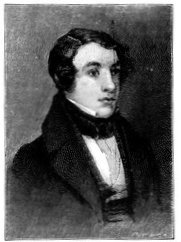
AGE 17.
From a Painting by Valentine.
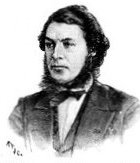
AGE 43.
From a Photo by Notman, Montreal.
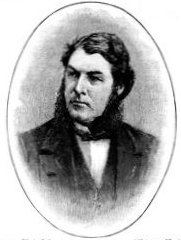
AGE 50.
From a Photo by Notman, Montreal.
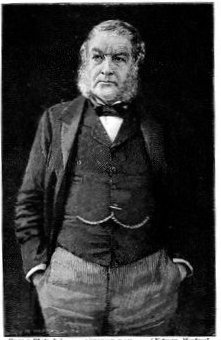
PRESENT DAY.
From a Photo by Notman, Montreal.
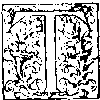
THE HON. SIR CHARLES TUPPER, BART., G.C.M.G., K.C.M.G., C.B., M.D., L.R.C.S., LL.D., was a member of the Executive Council and Provincial Secretary of Nova Scotia from 1857 to 1860 and from 1863 to 1867, and Prime Minister of that province until he retired from office, with his Government, on the Union Act coming into force, on the 1st of July, 1867. He holds patent of rank and precedence from Her Majesty as an Executive Councillor of Nova Scotia; was sworn as a Privy Councillor of Canada, June, 1870; and was President of that body from that date until the 1st July, 1872. Sir Charles represented the county of Cumberland, Nova Scotia, in Parliament for thirty-two years. He was created a baronet in 1888.

AGE 15.
From a Photograph.
(Chief Interpreter during the Russian War.)
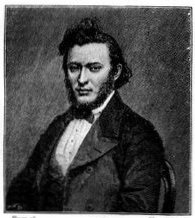
AGE 21.
From a Photograph.
(Professor at King's College, London.)
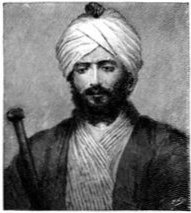
AGE 26.
From a Photograph.
(As a Maulvi when exploring Dardistan.)
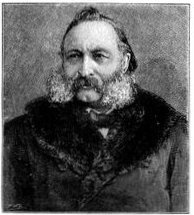
PRESENT DAY.
From a Photo by W. & D. Downey.

DR. G. W. LEITNER, Ph.D., LL.D., D.O.L., etc., probably the greatest linguist of this or any age, was born at Pesth on the 14th October, 1840. At the early age of fifteen he obtained a chief-interpretership, with the rank of colonel, in Her Majesty's commissariat during the Russian War in 1855; was Professor of Arabic with Mohammedan Law at King's College, London, where he founded the Oriental Section in 1861; has founded eighty-one institutions, including the Punjab University and the Oriental University Institute, Mosque, and Museum (containing unique collections) at Woking; discovered the countries, languages, and races of Dardistan (between Kabul, Badakhshan, and Kashmir) in 1866; excavated and named "Græco-Buddhistic" sculptures in 1870; originated and popularized Her Majesty's title of "Kaisar-i-Hind"; has written works on education, ethnography, etc., in many languages; is commander of several high foreign orders, etc. He retired from the Indian service in 1886; held a brilliant International Oriental congress in London in 1891, and is now engaged in elaborating his Central Asian material and in editing the numerous publications of the Oriental University Institute.
(Miss Louisa Starr).
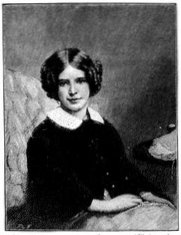
AGE 8.
From a Photograph.

AGE 20.
From a Photo by M. Bowness, Ambleside.
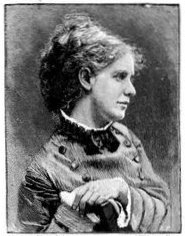
AGE 27.
From a Photo by Elliott & Fry.

PRESENT DAY.
From a Photo by Elliott & Fry.

MADAME CANZIANI, better known in the early days of her career as Miss Louisa Starr, became a student of the Academy at an unusually early age, and, making quick progress, she took, first, the silver medal for the best copy of Murillo's "Beggar Boys." This was the first time any woman had taken a medal of the Royal Academy. The following year she took the highest honour possible for an Academy student, namely, the gold medal for historical painting, it being awarded to her, together with a scholarship of £50. Since this date, works by Madame Canziani have been seen every year on the walls of the Royal Academy, this year's being "Roses" and "Dorothy Belleville."
Born 1864.
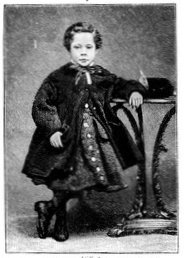
AGE 3.
From a Photo by J. H. Haggitt, South Shields.
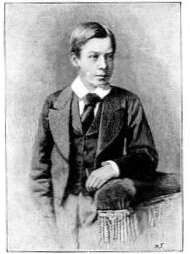
AGE 13.
From a Photo by R. L. Graham, Leamington.
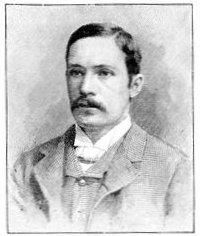
AGE 21.
From a Photo by Geo. F. Dew, Coventry.
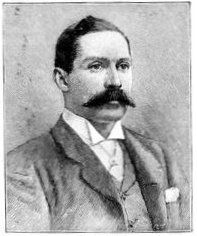
PRESENT DAY.
From a Photo by Bradshaw, Newgate Street.
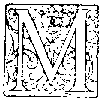
MR. ANDREW ERNEST STODDART is a native of Durham. His cricket career, which is most brilliant, practically commenced when he joined the Hampstead Club in 1885. He made no fewer than five centuries for that club in July and August of that year. In the following year he hit up the highest individual innings (485) for Hampstead v. Stoics, and three days later made 207 for the same club. As a batsman he has great strength, and plays very hard. He is also a fair change bowler, and an excellent field anywhere. He has gained the highest honours on the football field, and made his first appearance in International football in the season of 1884-85. Mr. Stoddart went to Australia with Lord Sheffield's cricketers 1891-92, for whom he did brilliant work. Last year he became one of the holders of the rare record of two hundreds in a match.
Born 1823.
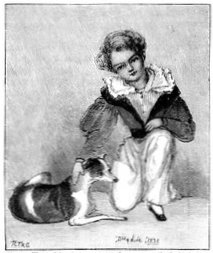
AGE 6.
From a Water-Colour by Lady Astley.

AGE 10.
From a Water-Colour by Lady Astley.
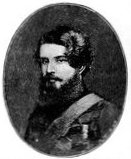
AGE 30.
From a Miniature.
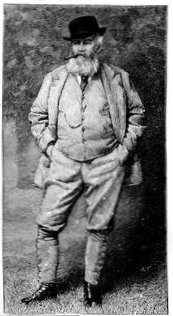
AGE 50.
From a Photo by Dickinson, New Bond Street.

PRESENT DAY.
From a Photo by Elliot & Fry.
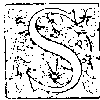
SIR JOHN DUGDALE ASTLEY, BART., is the son of the late Sir Francis Dugdale. He was educated at Eton and Oxford. As a boy, he developed the first genius that in after years made him famous, and, as far as athletics are concerned, there is no better authority than "Jolly Sir John." He served through the Crimean Campaign, and was awarded the medal with two clasps—Alma and Sebastopol—and the Order of the Medjidieh. Even during the campaign Sir John encouraged athletics, not only in his regiment—the Scots Fusilier Guards—but in the whole English Army. His men adored him, and would go anywhere and do anything for him. On his retirement from the Army, he was elected member for North Lincolnshire in the Conservative interest, and sat in the House till 1880. On the Turf, of which Sir John was for a long time a well-known and generous supporter, his success was anything but encouraging, but he bore his losses like a gentleman and a sportsman. Sir John is issuing "Fifty Years of My Life," which is to be a record of the principal events in his interesting career.

The doings of forgers, if properly chronicled, would fill sufficient volumes to stock the library of any average mansion with as sensational a series of works as could be found—indeed, so would the operations of begging-letter writers, for the matter of that. The previous papers under the heading of "Crimes and Criminals" have particularly dealt with the relics at New Scotland Yard, and although it must be admitted that the mementos here of this particular branch of punishable professions are not peculiarly extensive, yet they are unquestionably highly instructive and interesting, and it is not proposed to deviate from the pivot round which our previous observations have been made.
One glass case is practically given up to them. It is a "creepy" case. It contains the last clothes worn by a famous forger, whose action set the whole world talking for weeks—his silk hat, travelling cap with ear laps, pocket-handkerchief, collar, etc. It is not considered politic to mention his name. Close by is a poisoner's pill case, whose nefarious deeds in a neighbourhood "over the water," and in the immediate vicinity of Waterloo Bridge, made one shudder only a year or so ago. Then we come to the relics which call for more minute attention.
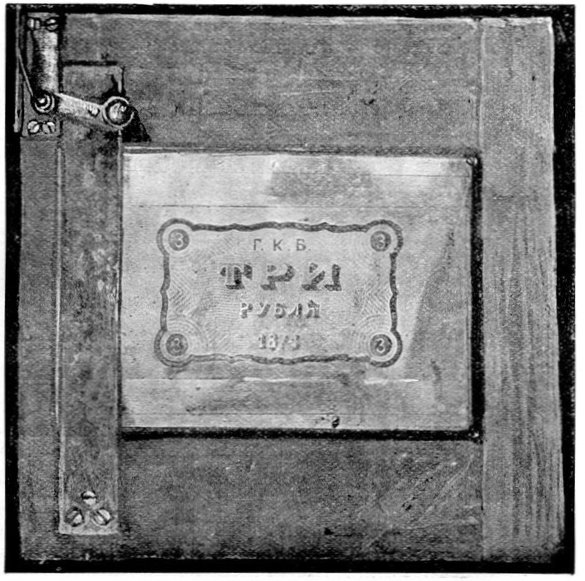
PLATE USED FOR PRINTING FORGED RUSSIAN ROUBLE NOTES.
Here are the plates for printing, gelatine moulds, and specimens of notes, which form the relics of the case known as the "Forged Russian Rouble Notes," which had a run between the years 1868 and 1876. A glance at a frame containing samples of notes purporting to be for one, three, ten, twenty-five roubles, etc., will at once convince the observer that the Russian Consulate spoke truly when, at the hearing of the persons arrested, at the police-court, he said: "They are really splendid specimens of forgeries of the actual legitimate notes." In company with these are treasures associated with what is known as the "Ti Kroner Case." They consist of a cigar-box converted into what is generally believed to be a photographic camera, a negative—broken fortunately—of a Ti Kroner note, a note photographed on a piece of substantial box-wood, several specimens of forged notes, and a note pasted on to a piece of paper with three circles cut out of it. This is peculiarly interesting, for "the operator" has pencilled in the centre disc, "£10 clock here," in the left-hand disc, "£10 watch here," and in the right-hand circular space, "watch here." The excuse of the person on whose premises these were found was that he intended to use the Ti Kroner notes as a novel form of advertisement for clock and watch makers!—to distribute these notes, drop one or two carelessly in the streets, or leave them on the cushions of railway carriages; and when the thinkingly[Pg 628] lucky finder hastily picked one up, popped it in his pocket, and waited until he got home to examine it, he found it was only, after all, an advertisement for Brown, the watchmaker, or Tompkins, the clock manufacturer!
Strangely enough, these relics were never brought as silent witnesses against the person who at one time owned them. He was voted by a thoughtful judge a perfectly fit and proper individual to partake of Her Majesty's hospitality for the comfortable period of twenty years for quite a different offence. He used to send notes—not forged ones, but nice, delicate little note-paper notes—to old ladies, threatening them that if they did not send him money he would, at the earliest opportunity, place dynamite on their door-mats, so that the first time they rubbed their boots or goloshes on the cocoa-nut fibre, they would be—well, he wouldn't venture to say where they would be blown to! Our Ti Kroner forger must have been a very versatile genius.
The simplicity which is characteristic of not a few of the inhabitants of Britain and the readiness with which some people are taken in are well illustrated by New Scotland Yard's collection of flash notes. Flash notes are generally carried by the members of that fraternity who delight in showing you what is known as the three-card trick, or by persons who wish, for some particular reasons of their own, to inspire your confidence in them, and lead you to trust in their keeping for half an hour or so your money, watch, or what not.
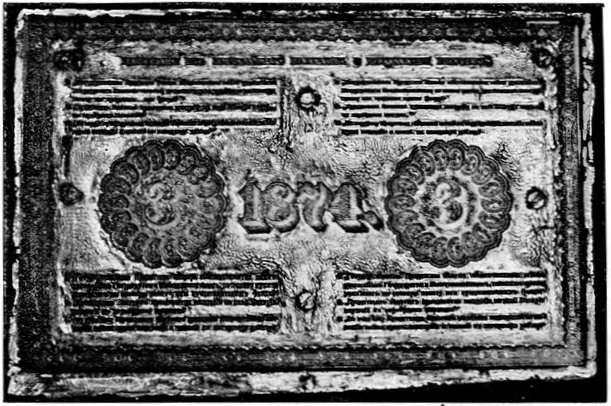
MOULD USED FOR FORGED RUSSIAN ROUBLE NOTES.
There are several hundreds of these notes at New Scotland Yard. It is not a punishable offence, by-the-bye, to have them in your possession, or even to print them, but it would go badly with you should you try to pass one as a real note. Now, it is a certain fact that in the case of many of these notes, they were never intended for any wrong purpose, but were merely brought out as a novel and attractive advertisement. It is to be hoped that the writer does not convey the smallest impression to the reader that these notes were in the first place originally issued for anything but a proper and legitimate cause. But your confidence-man, your cardsharper, should any perchance happen to fall in his hands, uses them to suit his own game. They are crisp—just like real bank-notes, and when rustled in the palm of the hand make that delicious sound which cheers the heart and wreathes the face in smiles: they are very nearly the same size, too, of a real "fiver." So they are used for a purpose for which they were never intended, and the confidence-man pulls out of his trousers pocket a handful of—what? Bank-notes? Nothing of the kind. But they look like them. Of course they do. But if you get hold of them yourself you would see that this crisp piece of paper with a big TEN in the left-hand[Pg 629] corner was only: "Bank of Engraving. I Promise to Engrave and Print in Letter-press, etc., on Demand for the Sum of Ten Pounds in the First Style of the Art or forfeit the above sum. London, 29 April, 1840. For Self & Co., Bank of Engraving, J. Duck, Fitzroy Square. £ Ten."
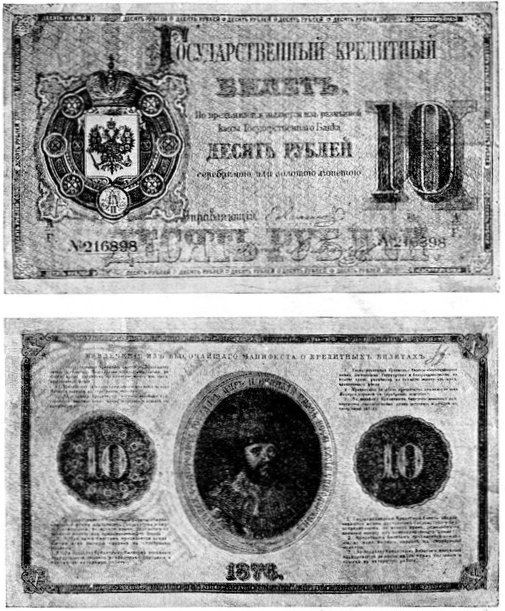
FORGED RUSSIAN ROUBLE NOTE—FRONT AND BACK.
Another of these is in reality a capital advertisement for a well-known circus, stating that it has been "Entirely redecorated and renovated at the cost of One Thousand Pounds"—a big One Thousand Pounds appearing in the left hand corner. Indeed, your cardsharper and confidence-man knows how easily gulled some folk are, that he has even included in his stock-in-trade a note-advertisement emanating from a Parisian firm of dentists, stating that they will gladly supply you with a new false tooth for the modest sum of five francs!
These and many more are in a frame at New Scotland Yard—a good supply of American notes being noticeable. Amongst them is one which, at the moment of writing, is peculiarly interesting. It has, at some time or the other, formed part of the "monetary" luggage of somebody engaged in the confidence trick. Kossuth, the great Hungarian patriot, gave orders to a firm of lithographic printers for the printing of several million notes, which he intended for circulation in Hungary. The Austrian Government, however, objected to this, went to law, and the case was decided in their favour. The notes were to be destroyed, and so great was their number that several waggons were loaded with them. One of these identical notes is to be found framed at New Scotland Yard!
Whilst on this subject, a good story may be told, which will well illustrate the ingenuity of some to take advantage and make profit of a "forgery" scare.
Some time ago considerable consternation was created in France owing to the circulation of forged 500 franc notes. An individual—always on the look-out for the adaptation of his genius to circumstances—exhibited one of these sham notes and netted a neat little sum by charging a franc a head.
"Beautiful imitation," said one, "but not good enough to take me in."
"Very clever," remarked another, "but not quite clever enough to catch me."
"Ha! Ha!" exclaimed a third, "I should have known it as a bad 'un at once!"
The exhibitor smiled and said nothing. They had been looking at a real note all the time!
The particular glass case at New Scotland Yard to which we have been devoting our attention also contains substantial mementos of a gentleman who was closely associated with the great forged will and next-of-kin swindle of 1885. Charles Howard was this worthy's name, and he died within the walls of Holloway Prison, on the 25th November, 1893, whilst under remand.

TI KRONER NOTE PHOTOGRAPHED ON WOOD BLOCK.
Old Howard—for he was over seventy years of age—was a colossal swindler. He played for high stakes in the highest quarters. No twopenny-halfpenny swindles would appease his criminal appetite—thousands, and nothing short, was his game, and more often than not he bagged them. His operations extended all over the civilized world. His portrait has followed him all round Europe. On the Continent he posed as the Count Von Howard and Count Hovardi. The writer has had an opportunity of looking at his picture—a more benevolent-looking old fellow never faced a camera. His plausibility was simply delicious—his impudence at facing a thing out, in spite of immense odds against him, was undeniably tremendous. He had received a good education—indeed, it is believed at an important public school—and furthermore, came of good family. In order to give some idea of his monumental "cheek," almost his last exploit was to pose as the friend of a mythical Australian heiress, to whom he was prepared—subject, of course, to some monetary consideration—to introduce such gentlemen as were matrimonially inclined. When one of these sought to expose him, Howard immediately wrote to a number of leading journals in a feigned name, stating that he was a retired Indian officer, and that he was prepared to vouch for the accuracy and bona fides of the whole affair. This letter was actually published.
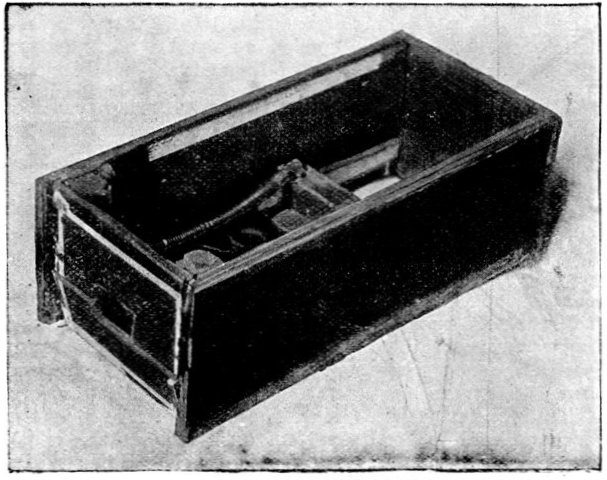
CAMERA MADE OUT OF A CIGAR-BOX.
His modus operandi in the forged will case was both simple and elaborate. Its simplicity lies in the fact that it merely took the form of an advertisement in the newspapers, stating that a Mr. Clark had died leaving many thousands. Applications from persons of that name were invited. It was a taking bait, and hundreds nibbled at it, as is proved by a perusal of the papers preserved as relics of this case at "The Yard." Howard was magnificently artful. He did not choose the name of Smith, Brown, or even Jones—but one almost as common. A person would write in answer to the advertisement. Howard would reply, asking for fifty shillings,[Pg 631] prepaid, to cover inquiry fees, and holding out further bait by stating that only the first thirty-five "Clarks" would receive a share; that the money could not go to persons of affluence, but to people of small means; that he could only correspond with principals, and that "James Hill Cooper Clark" had left the highly respectable sum of £105,000. Who would not be one of the happy thirty-five for fifty shillings!
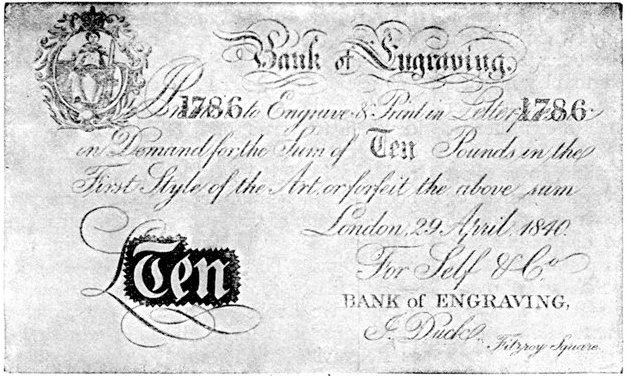
A "FLASH" NOTE.
Howard and his works might be dilated on from cover to cover of this Magazine, but to show how perfectly he played his "clients" we will give two extracts from the scores of documentary proofs we have examined. One is a death certificate, and it reads:—
"In memory of William Clark, of——, who departed this life, April——, 18——." Then follows: "I hereby declare that the above is a true copy from the tombstone of W. Clark, of——."
The suggestion to copy the tombstone could not have been evolved from any mind but that of the late Charles Howard. The other is from a confiding person who writes—Howard has evidently asked for a commission—"I am willing to have ten per cent. reducted," and the bad-spelling simpleton plaintively adds: "Please to get the thing through as soon as possible."
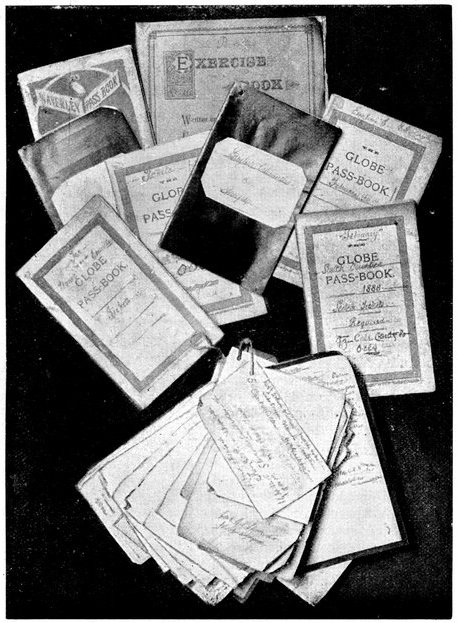
ADDRESS BOOKS, MEMORANDA, ETC., OF A PROFESSIONAL BEGGING-LETTER WRITER.
Your true begging-letter writer is certainly entitled to join the family circle of forgers, though in most cases only as a distant cousin. What a begging-letter writer Howard would have made! But there are men and women whose talents[Pg 632] in this peculiar art are just as fine if not so varied. It is only when a man attains to position that he becomes aware of what a number of boys used to play marbles with him at school. Your begging-letter writer at once marks him for his own, he has "got him on the list."
It would be quite impossible, in a short paper such as this, to place on record anything more than a few of the methods of your modern begging-letter writer; of the old soldier who sends a line to some Army man at his club; of the ardent but hard-up politician who addresses some M.P.; of the real truth regarding that hurriedly pencilled note addressed to the City merchant and stating that "years ago" the applicant was once "on the market himself," etc., and would you oblige with five shillings, "which I faithfully promise, dear sir, to pay you back in a fortnight's time." Have you ever met the good woman—perhaps you have heard from her—who is a widow with two children, her husband is lying dangerously ill at home, and she wants a few shillings to purchase necessaries. As a proof of her honesty she incloses the receipt for her last month's rent. A certain society can show you a bundle of some forty of these letters, and every one of them contains a receipt for that same month's rent. The common lodging-house is the depôt for every fraud under the sun, and there are scores of men who frequent them who will write you the most touching appeal for threepence or fourpence, and find the note-paper into the bargain.
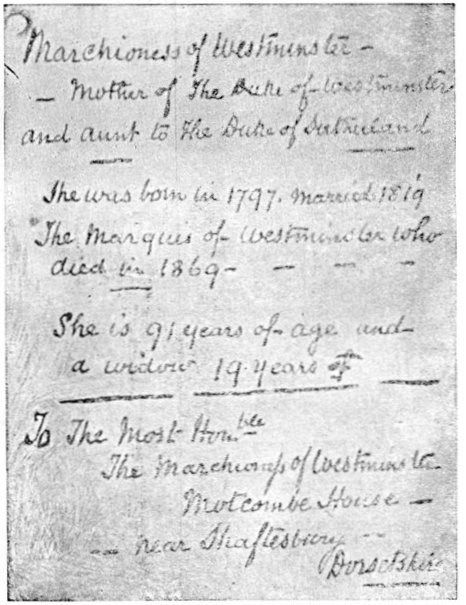
A PROFESSIONAL BEGGING-LETTER WRITER—SPECIMEN OF MEMORANDUM.
The memory of the greatest genius the begging-letter world has ever known is kept green at New Scotland Yard. He is believed to be dead—for if he were out of prison London would soon hear of him. We will hide his identity—for the sake of his friends and relations who may have survived him—under the unassuming name of Brown. Brown was an old fellow, with a glorious white head of hair, and always dressed in black cloth. His great forte was his ability to write in assumed hands—he could write in a hundred different ways, for which purpose he was aided by a variety of pen-nibs and various coloured inks. He was so systematic. Just examine some of his books—usually those familiar little red rent-books. Here is one—it contains the names and addresses of peers, etc., M.P.'s, and widows in North and South Wales. A second is devoted to peers and M.P.'s in England, another to Scotland, and a third to those resident in Ireland. There are a dozen books of this kind, and were the writer to publish some of the "notes" in these begging volumes they would provide some interesting reading. Then he would divide London—particularly the West-end—into districts. So we have books given up to such happy hunting grounds for the begging-letter writer as Belgravia, Knightsbridge, Onslow Square, Queen's Gate, Portman Square, Berkeley Square, Grosvenor Square, etc.
He never addressed anybody without acquainting himself with their history and particularly finding out their age, whether they have reached those years when they are generally supposed to be sympathetic, or if they were in the prime of life and inclined to be cynical. How much is conveyed on a small slip of paper, bearing the name of the[Pg 633] Marchioness of Westminster and the words, "She is ninety-one years of age and a widow nineteen years"!
Brown used to supply beggars with letters, and several samples of them are preserved. His favourite theme was the poor widow, and the plea put forth was the same in nearly all cases save that the names were altered and the locality different. Here is one of these "appeals," accompanied by a letter on black-edged paper purporting to be from a clergyman in the same parish:—
"Parish of Streatham,
"County of Surrey.
"These are to certify that Mrs. Anne Clarke (widow) carried on business as laundress in this parish for several years, and has hitherto supported a large family in respectability.
"On the afternoon of Saturday, the 14th day of December instant, while Mrs. Clarke was delivering clean linen with her horse and van near the Streatham Railway Station, the horse took fright at the whistle of a passing train and started off at a furious pace, and coming in contact with a coal-waggon the horse was killed, the van dashed to pieces, and her eldest son 16 years of age was thrown from the van, and received such injury as caused compound fracture of the right thigh, and now lies in St. Thomas's Hospital in a dangerous state, whereby Mrs. Clarke has sustained a severe loss, estimated at £45.
"Knowing Mrs. Clarke, a respectable and industrious widow with a family of five children depending on her for support, I beg to recommend her case to the notice of a few benevolent neighbours, to enable her to follow her occupation as heretofore, trusting it will come under their notice with that eye of sympathy it so much merits.
"Vestry Hall, Streatham.
"This 17th day of December, 1889."
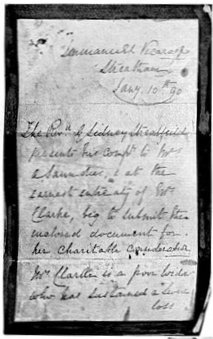
"BROWN'S" BEGGING-LETTERS.
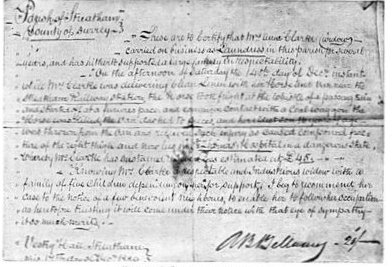
This would be presumably signed—of course in Brown's handwriting—by the Vestry Clerk with "20s." against his name. This in itself is a delightful composition—but it did not end here. Our estimable friend Brown would follow on with a few more signatures giving various sums of money, but one signature always headed the list—after that of the Vestry Clerk. It was a coal-waggon which upset poor Mrs. Clarke, killed her horse and dashed her van to pieces. Hence—written in red ink—there appears on all these appeals the name of a well-known firm of London coal merchants, who give Two Pounds.

Miss Louie Spencer.
From a Photo by Walton Adams, Reading.
Mrs Glyndeur Foulkes.
From a Photo by John Ingham, Sale, near Manchester.
Miss Mabel Morphett.
From a Photo by W. Edward Wright, Forest Gate.

Miss Daisy Baldry
From a Photo by James Bacon, Newcastle-on-Tyne.
Miss Irene Vanbrugh.
From a Photo by Russell & Sons, 17, Baker Street, W.
MISS FRANKS
From a Photo by A. Weston, 84, Newgate Street, E.C.
By His God-daughter.

The name of De Lesseps has been on the lips of many people, both French and English, within the past two years; some speaking of him in terms of reproach, others of admiration, for his past services to his country and the world at large, and commiseration for his present sad position, and the failure of his last great scheme, the cutting of the Isthmus of Panama. This record of his life, therefore, by one who, from her childhood, has known the "Grand Français," may be found interesting at this moment.
Ferdinand de Lesseps was born at Versailles on the 19th November, 1805. At first, and for many years, he was engaged in the French diplomatic service at Lisbon, Barcelona, and the East. Count Ferdinand de Lesseps was married, first in December, 1838, to Mlle. Delamalle, by whom he had five sons. His three elder children died at an early age, and his surviving sons by this marriage are Charles and Victor de Lesseps. Charles, the former, of whom the world has heard so much lately, took an active part in the works both at Suez and Panama, and was the able assistant of his father.
When the events of 1851 and 1852 placed the third Napoleon on the Imperial throne of France, and the Emperor, in January, 1853, married Mlle. de Montijo, who was the cousin of De Lesseps, his influence at the French Court was assured. It was in 1854, when in Egypt on a visit to H.H. Mohamed Saïd Pasha, that the project of cutting the Isthmus of Suez was first broached by him. He discussed the scheme with Saïd Pasha, and as a result his "Percement de l'Isthme de Suez" was drawn up. He obtained a concession in 1856 from the Viceroy Saïd Pasha, who himself took a large share in the venture, and granted De Lesseps an extraordinary privilege in the shape of forced labour.
Count de Lesseps then left for France to obtain the necessary capital for his works, and returned to Egypt in 1860. The preliminary works were commenced in this year, and proceeded with, notwithstanding great opposition, especially from the British Government. Another great difficulty presented itself, for during the progress of the works Saïd Pasha died, and was succeeded by his brother Ismaïl.
Ismaïl was alarmed at the magnitude and uncertainty of the grants to the Canal Company, and was anxious to retire from the obligation of finding forced labour for the construction of the works. He therefore refused to ratify or agree to the concession granted by his brother.
For a time the whole works of the Canal were stopped, but eventually the question in dispute, together with the objection which had been raised as to the necessity of obtaining the Sultan's confirmation of the original concession, was referred to the arbitration of the Emperor of the French.
In the result Napoleon III. awarded the sum of £3,800,000, to be paid by the Viceroy of Egypt to the Canal Company as an indemnity for the loss they had sustained by the withdrawal of forced labour. This sum was applied by the Company to the prosecution of the works of the Canal.
In 1865 a small channel was made, with sufficient water to admit the passage of very small vessels. By the year 1867, the bed of the Canal was so far enlarged as to admit the passage of small ships and schooners. In August, 1869, the waters of the Mediterranean were mingled with those of the Red Sea.
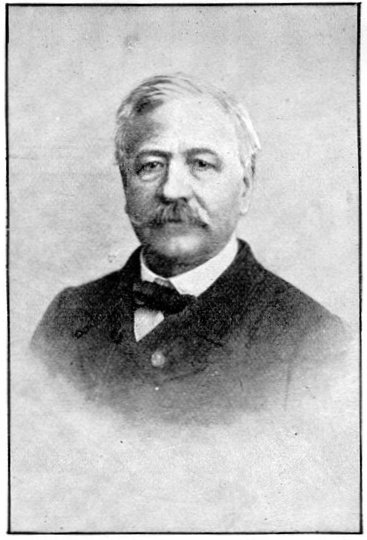
AGE 55.
From a Photo by Reutlinger, Paris.
(Date of commencement of Suez Canal.)
On November the 17th, 1869, the Canal was formally opened at Port Said, amid a series[Pg 637] of fêtes, which culminated in the famous ball given at Ismailia, by Ismaïl Pasha, which combined all the extravagance of the East with the civilization of the West. The ball was opened by Count de Lesseps with the Empress Eugénie as his partner. The Emperor of Austria, the Crown Prince of Prussia, and many other Royal personages were included amongst the Viceroy's guests. Ismaïl Pasha was at this time in the height of his glory, and he lavished his hospitality broadcast.
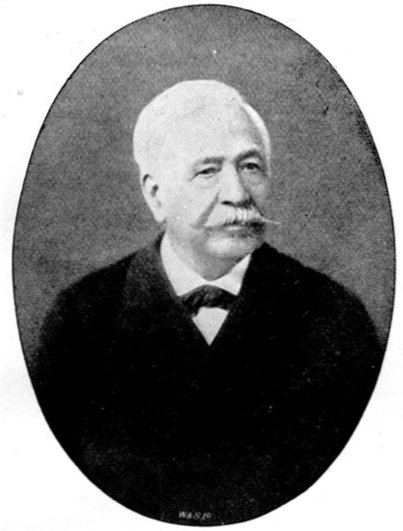
AGE 64.
From a Photo by A. Liébert, Paris.
(Date of completion of Suez Canal.)
A few days after this great triumph, Count de Lesseps married a young Creole—Mlle. Autard de Bragard. A little romance is told of his first meeting with Mlle. de Bragard, on the voyage from France to Egypt. Count de Lesseps had gathered in Palestine some roses near the Dead Sea, called the roses of Sheron. They are a genus of dried flowers, which, when placed in water, open and present an appearance of blooming. He explained the peculiar characteristic of this flower, and remarked it was similar to his old heart when nurtured. Thus was the proposal made and, as is known, accepted.
By this marriage he had twelve children, six boys and six girls: Mathieu, born 12th October, 1870; Ismaïl, born 27th November, 1871; Ferdinande, his eldest daughter, born 3rd December, 1872, and who has married the Count Ferdinand de Goutant Biron; Eugénie, born 1st January, 1874, died 19th May, 1874; Consuelo and Bertrand, twins, born 3rd February, 1875; Helene, born 8th July, 1876; Solange, born 18th September, 1877; Paul, born 13th April, 1880; Robert, born 23rd May, 1882; Jacques, born 5th July, 1883; Giselle, born 16th December, 1885.
We give here three photographs of Count de Lesseps and his family. The first shows the "Grand Français," with seven children; the next, Count and Countess de Lesseps, with nine children; and the third, the two parents and their whole family.
After the success of Suez, he was appointed by Napoleon III. to the rank of Grand Cross of the Legion of Honour, and was created by Her Majesty Queen Victoria an Honorary Knight Grand Commander of the Order of the Star of India, and in July, 1870, the freedom of the City of London was presented to him.
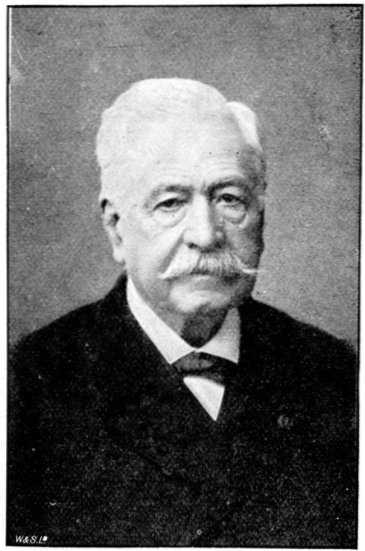
AGE 74.
From a Photo by Nadar, Paris.
(Date of commencement of Panama Canal.)
About ten years after the triumph of Suez, his restless spirit prompted him to undertake a stupendous task, which even then filled his friends and advisers with anxiety. He had long conceived the idea of uniting the Atlantic and Pacific Oceans, as he had already done the Red Sea and the Mediterranean. He convened a Congress of all the European and American Powers to decide as to the routes to be selected for the construction of a canal—whether viâ Panama, Tehuantepec, Nicaragua, or Darien. Although[Pg 638] opinion was greatly divided at the Congress as to the route, he favoured that viâ Panama, and, ultimately, carried his opinion. This fatal step was the origin of all the troubles of his declining life. His glory seemed like to wane before the disasters that befell his project, and his title of "Le Grand Français" appeared to have been forgotten.
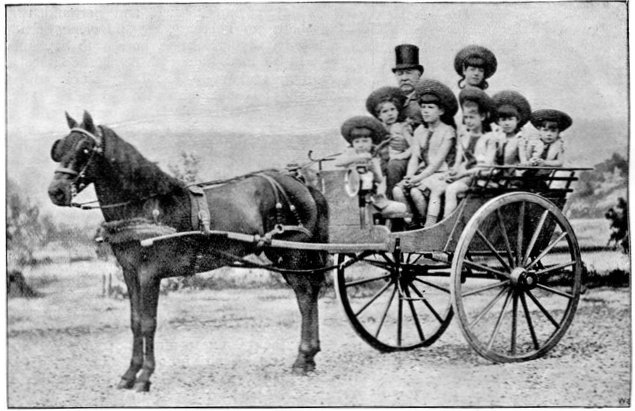
COUNT DE LESSEPS AND GROUP OF SEVEN CHILDREN.
From a Photograph.
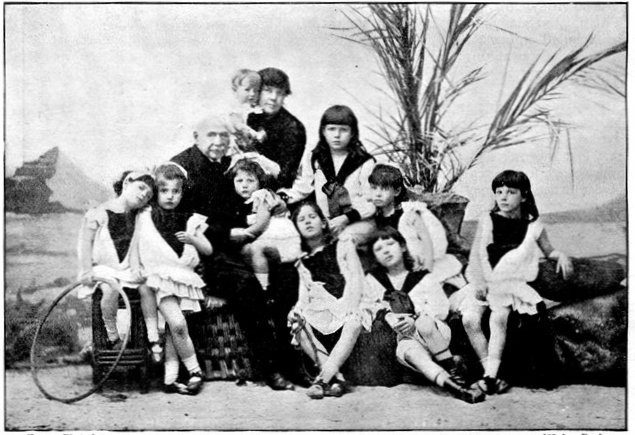
COUNT AND COUNTESS DE LESSEPS AND GROUP OF NINE CHILDREN.
From a Photo by Nadar, Paris.
He formed his Company in 1881 with a capital of £24,000,000, which did not last[Pg 639] long. Between 1883 and 1887 further moneys were obtained by means of several loans and lotteries, and these funds were supplied to the fatal abyss, until the amount reached the enormous sum of £60,000,000. This sum was also spent and squandered. His staff showed a want of foresight, and a want of something which is better left unexplained. The Panama scandals in Paris revealed enough to the world to allow everyone to judge for himself. But Count Ferdinand de Lesseps was ignorant of all the vicious stratagems employed, and was in no way responsible. He, however, with his son Charles, had to bear the brunt of the catastrophe and atone for others.
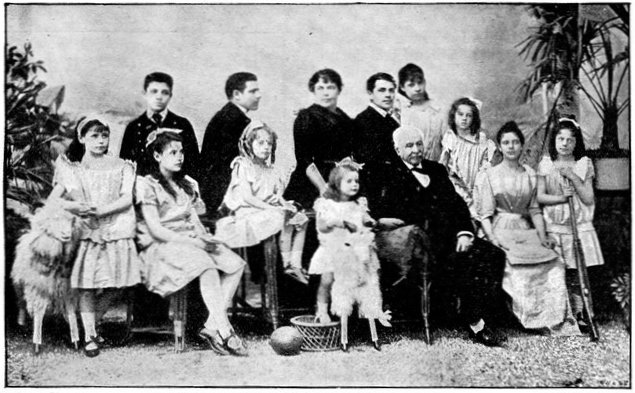
COUNT AND COUNTESS DE LESSEPS AND GROUP OF ELEVEN CHILDREN.
From a Photo by Nadar, Paris.
The works were stopped in 1887 for want of funds. The Canal at that time was only partly cut. The machinery, houses, barracks, huts, sheds, were all deserted. From being once the scene of active life and the centre of 20,000 living beings, the Isthmus of Panama is now forsaken, and the sepulchre of the hard-earned savings of many a French peasant. The weight of such a grave responsibility as the loss of over £60,000,000, subscribed principally from the purses of the French thrifty, together with the prosecution of his son, has increased his age tenfold. He was strong and hopeful at eighty; he is senile and weak at eighty-nine.
The accompanying photographs show Count de Lesseps at the commencement of his fatal task in Panama, and at the present day.

PRESENT DAY.
From a Photo by V. Daireaux, Paris.
Death would have been a consolation to his many troubles, and would have ended a life full of success and glory up to its zenith, and now fast ebbing amidst the smouldering ruins of a disastrous enterprise. The concession granted by the Republic of Colombia for the construction of the Panama Canal elapses in 1895. The Colombian Government may extend it, but will this avail? Some great engineer must answer this question.
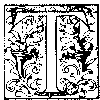
The modern processes of photographic reproduction for the illustration of books and periodicals have given us one great advantage at least, irrespective of their rapidity of execution and comparative inexpensiveness: the pictures as printed are absolute facsimiles of the originals. Thus it is possible to present a scientifically accurate reproduction of any especially interesting document, drawing, plan, or picture, unimpaired by the interference of any other hand than that of the original writer or draughtsman; and one may, for all practical purposes, examine an autograph which, in its actual self, is inaccessible. The facsimiles which are here produced are all of an extremely interesting, though entirely diverse, character.
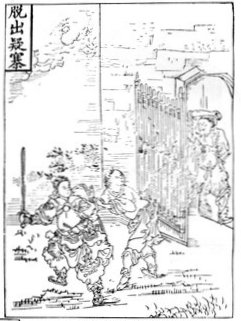
A CHINESE "PILGRIM'S PROGRESS."
THE PILGRIMS ESCAPING FROM DOUBTING CASTLE.
"The Pilgrim's Progress," illustrated by a Chinese artist, in drawings conveying the Chinese conception of Christian's adventures, cannot fail to be, at least, curious. Such a series of drawings was made and printed, not very long ago, in Canton. There is no text beyond the title printed at one of the top corners of each illustration. Three of these illustrations are here reproduced, representing respectively Christian's combat with Apollyon, Christian and Faithful escaping from Doubting Castle and Giant Despair, and the Shining One releasing Christian and Faithful from the Flatterer's Net. The absolute fidelity in detail of these pictures to the narrative is no less to be remarked than the very Chinese characteristics of those details.
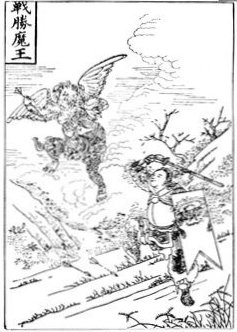
A CHINESE "PILGRIM'S PROGRESS."
THE FIGHT WITH APOLLYON.
Next we have a facsimile of a very different character from the last. This is a sketch, drawn by Nelson with his left hand, after he had lost his right, by way of explanation of his tactics at the battle of Aboukir (the Nile). The particulars of the occasion are inscribed by a witness in the left-hand bottom corner of the sketch. The sketch itself is naturally of the roughest description, as, indeed, would be the case with one drawn by the right hand if the sketcher were explaining his meaning by word of mouth as he went along. At the left, a very rough figure, intended to represent an arrow-head, indicates the direction of the wind. The horizontal line[Pg 641] of oval figures in the middle represents the French fleet as it lay at anchor in the bay. The line marked "track of the English fleet" shows the direction in which Nelson approached, and the broken scorings in the middle of the French line show where part of the English fleet broke that line. The dotted line between half of the French fleet and the shoals just off shore marks the position taken up by one half of the English fleet, while the other half attacked the same ships on the opposite side, thus annihilating half of the enemy to begin with, while the other half were helplessly to leeward and unable to give assistance; afterwards working down the line and finishing off the rest, with the exception of the few ships that escaped.
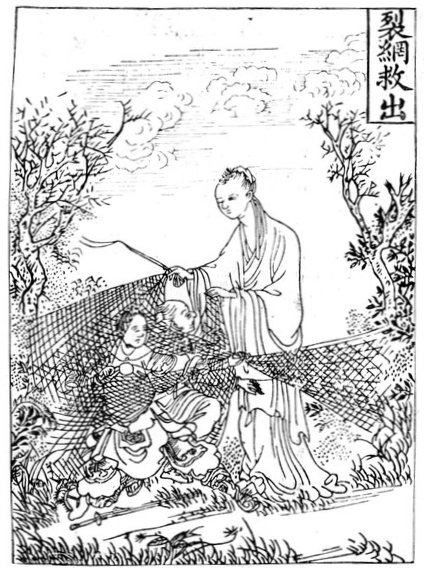
A CHINESE "PILGRIM'S PROGRESS."
THE SHINING ONE RELEASING THE PILGRIMS FROM THE FLATTERER'S NET.
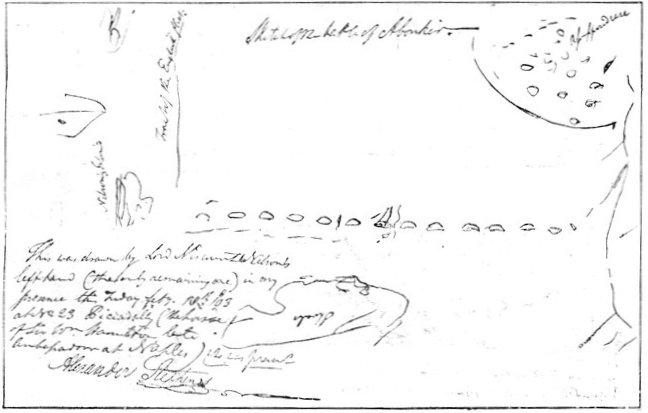
PLAN OF THE BATTLE OF ABOUKIR. DRAWN BY LORD NELSON WITH HIS LEFT HAND.
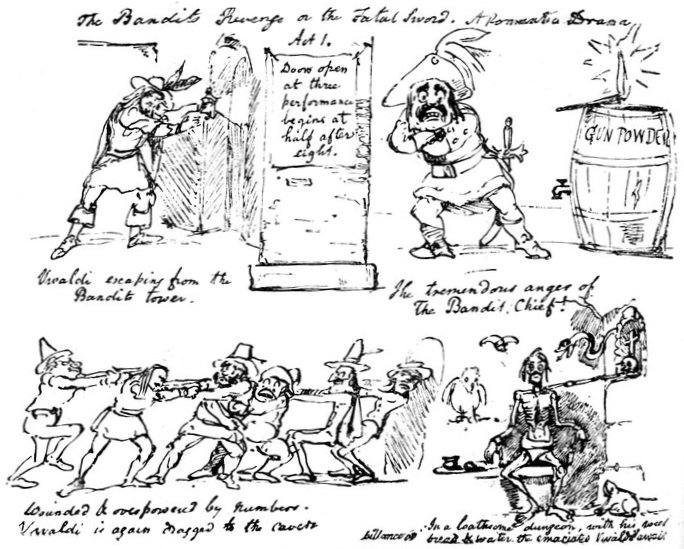
THE BANDIT'S REVENGE. BY W. M. THACKERAY.
Between this and our next pair of facsimiles there is every possible difference. Thackeray's fondness of and facility in sketching, and his ungratified ambition to excel as an artist, are well known. Great numbers of his earlier sketches have been unearthed and published, but we have here some that have never before been printed—and some by no means of the worst. They exist in a sketch-book, and appear to have been made in the year 1832, when Thackeray was just of age. There are five sheets of sketches (of which we here present two), embodying a burlesque melodrama, entitled "The Bandit's Revenge; or, the Fatal Sword."[Pg 642] In the beginning we see the hero, Vivaldi, escaping from the Bandit's castle. Next there is an exhibition of the consequent rage of the Bandit chief. The cask labelled "gunpowder" is provided with a suspicious-looking tap, and the carelessness with which the Bandit has placed his torch on the cask-head hints that perhaps he keeps something more internally grateful than gunpowder in that cask. But Vivaldi's escape is only temporary, for in the next sketch he is captured, and being dragged back to the robber's stronghold; and in the last sketch of the first sheet his pitiable and starved condition in the "deepest dungeon beneath the castle moat" is well set forth. This completes Act I. Act II. begins with contrition on the part of the gaoler, who assists his escape by the loan of a mule, mounted on which the emaciated hero is taken, by the country folk, for Death on his Pale Horse. The Bandit's anger at this second escape culminates in a pyramid of heads, with the traitorous gaoler's on top; while the liberated Vivaldi, forgetful of his changed appearance, essays to jump his mule in at his Bertha's window, sending that lady into a very excusable swoon. This concludes Act II. In the next sketch (for which, unfortunately, and for those succeeding it, we have not room) Vivaldi, under the benign influence of good living, has grown comparatively fat, and converses lovingly with his Bertha. But the Bandit chief is not done with yet, and he waits in ambush with his retainers, variously armed, to attack the marriage train, which is seen approaching in the distance, bishops, dancers, and all complete. Next we see the fatal effect of the Bandit's attack. Bridesmaids, croziers, and ecclesiastical functionaries lie in a heap on the ground, but Vivaldi stands unharmed and defies his foes, while Bertha swoons comfortably against his back. Then with a lunge of his mighty sword (which has suddenly lengthened out to about fifteen feet) Vivaldi transfixes the whole robber band of six as they stand in convenient single file, driving his point also through a stout tree standing behind. The drama finishes[Pg 643] with an "emblematic vision," wherein Vivaldi and Bertha, some years older, take hands in the centre under the shelter of that interminable sword, while on each side stand half-a-dozen children of various ages. The last sketch represents the manager addressing "the fullest house ever known in this theatre," consisting of four persons besides the orchestra, and thanking them for their approval. Finally follow two sheets of manuscript, purporting to be extracts from the rival local papers, taking opposite views of the performance and bullying each other. One comes out with some lines to the leading lady, lines with many of the characteristics of the local paper. The first verse runs as follows:—
These verses are, of course, abused violently by the opposition paper. Those who are curious to examine those of this set of drawings not here presented, together with facsimiles of the two pages of manuscript, are referred to The Picture Magazine of this month, in which the whole of the pictures here produced appear, with many others of equal interest. Among the rest there are nine more of the Chinese illustrations to "The Pilgrim's Progress."
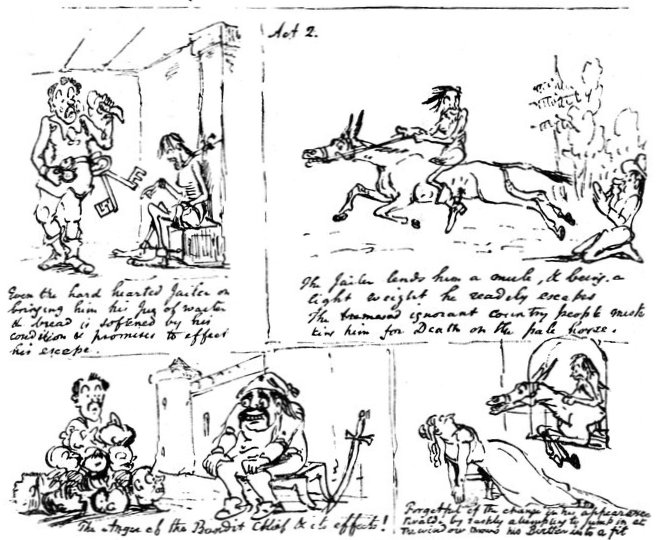
THE BANDIT'S REVENGE. BY W. M. THACKERAY.
"Variety is the spice of life," somebody once said, and here we have the facsimile of the horoscope cast for John Milton's birth, by Gadbury, the astrological contemporary of Lilly—a thing as little like what has gone before as may be. With the exception, perhaps, of the inscription in the centre, the whole affair is about as intelligible to the average person as any side of Cleopatra's Needle. An astrologer, however, reads it all as easily as if it were a bill of fare, and a modern practitioner (Mr. Alan Leo, of The Astrologer's Magazine) informs us that the indications set forth on this hieroglyphic tell a tale curiously in[Pg 644] keeping with the actual facts of Milton's life. His pleasures, it seems, were to take a serious turn; he was to have a versatile genius in literature, but with a chief bent to serious work. His first marriage was to be a failure in consequence of some vagary on the part of certain moons, but he was to marry again. Mars so interfered with the Sun that it was evident that he would be blind in his forty-fifth year; and there are other prophecies, almost equally exact, and all very wonderful.
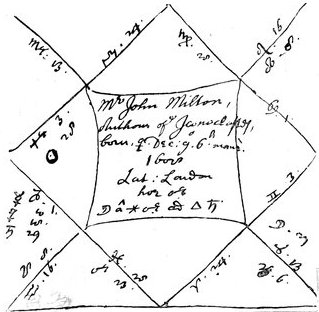
Facsimile of a Horoscope set on the Nativity
of MILTON the POET:
by John Gadbury the Astrologer
A facsimile of a photograph closes our present list. The photograph is that of an Indian fakir—one of the most celebrated in India at the present moment, if not actually the most celebrated. He is seventy years of age, and has worn the immense mass of iron chains shown in the photograph continuously, without a moment's cessation, for the past ten years. The weight of the iron is 670lb., and as may be seen, the "Jingling Fakir," as he is called, is by no means a man of muscular build—certainly not of the build best fitted to adopt such an amusement as the continual carriage of considerably more than a quarter of a ton of iron chain.
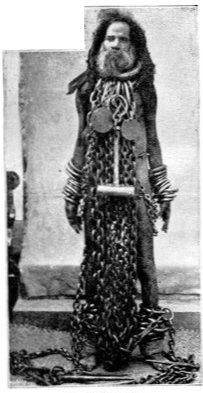
THE JINGLING FAKIR.
In addition to these, as has already been remarked, several other interesting pictures are to be seen in the present issue of The Picture Magazine, as, indeed, is usual every month. It needs but to see these to understand that a book of pictures alone may be something a great deal more important and interesting than a book for children merely.
(VIEWED BY HENRY W. LUCY.)
Fortuitously at a time when the re-establishment of an Irish Parliament at Dublin was within measurable distance, there has been brought to light a suit of clothes described as the Court garments of a member of the Irish Parliament who represented County Cavan in the year 1774. It has, of course, turned up in the United States, and is now on view in a shop in Chicago. The suit is described as being of a deep maroon broadcloth, embroidered with heavy solid gold bullion, with the figure of a harp surrounded by a wreath of shamrock, and a vine of the same extending around the skirt. The breeches are of a deep yellow plush, and the three-cornered cocked hat is of black beaver, covered with gold lace. From this it would appear that when Ireland had her own Parliament her sons spared neither money nor taste in the effort to live up to it in the matter of clothes. The suit, on the whole, seems almost to suggest the presence of a State coachman. Taken in the mass, it must have been very effective.
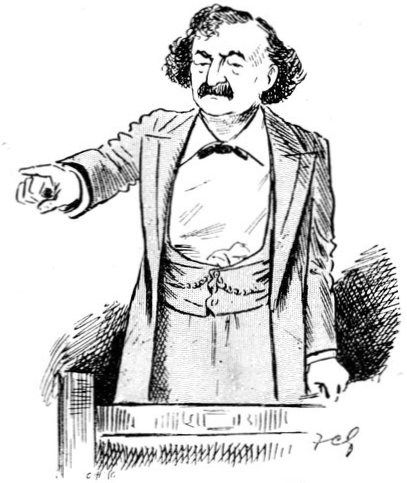
"EM I TO UNDERSTAND?"
One can imagine how naturally Mr. Field would take to a revival of this uniform. In the Saxon Parliament he represents the St. Patrick's Division of Dublin City. He sits below the gangway, and on summer afternoons distinctly endows that portion of the House with a haze of reflective light. It is from his shirt-front, which in the matter of displayed area is, at any time before the dinner-hour, remarkable, whilst its glossiness is almost dazzling. With this snowy expanse cunningly set-off by contrast with a black necktie reposing under a turned-down collar, and with his long hair haughtily brushed back behind his ears, Mr. Field might be anything in the high art line, from a poet to a harpist. Actually he is, apart from politics, something in the victualling business. He is great at question time, and is a terror to the Chief Secretary. Having put his question and received his answer, he invariably rises, and, expanding his chest and throwing out his right arm with impressive gesture, slowly says: "Em I to understand that the right honourable gentleman means——" Here follows a supplementary question of expanse proportionate to the shirt-front. As a rule, it turns out that he is not to understand anything of the kind. But he has had his fling, and let St. Patrick know that William Field, M.P., is on the look-out tower.
I have an engraving showing a view of the interior of the House of Commons during the Session of 1821-3. It is the old House of Commons, illumined by candles alight below the ventilator, a recess wherein ladies found their only opportunity of being present at a debate. It was, as I mentioned some time ago, out of a chink in this part of the roof that Mr. Gladstone once in the middle of an exciting debate saw a bracelet fall. It was not the habit of the House of Commons to assemble in anything like uniform, but the dress of the gentlemen of the day was much more picturesque than ours. On this night, in a Session more than seventy years dead, every member of the House wears a coat buttoned across his chest, with deep collar rising, in some cases, up to his ears. Some display shirt collars of the kind Mr. Gladstone sports to this day. They are in a few cases[Pg 646] sustained by a black stock, more frequently by a white scarf loosely tied, in which is set a pin. For the most part the coats are cut away at the hip, the trousers are preternaturally tight, and, where top-boots are not worn outside, are strapped under the instep.
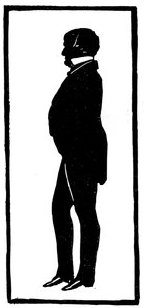
OLD STYLE.
This was the Long Parliament under the Premiership of Lord Liverpool. Summoned on the 9th June, 1812, it was dissolved on the 24th April, 1827, having lasted the almost unprecedented period of fourteen years 319 days. Eldon was Lord Chancellor for the fourth and last time. F. J. Robinson and Vansittart succeeded each other at the Exchequer. Sir Robert Peel was sometime Home Secretary, sometime Irish Secretary. Castlereagh and Canning shared between them, in succession, the office of Foreign Secretary. All their portraits, with the exception of Lord Eldon's, are shown in this engraving, being the careful work of one Robert Bowyer. In pictures of the House of Commons done in these later times, a majority of members are shown wearing their hats, as is the custom in the House. Whether for artistic purposes, or because seventy years ago it was not the thing to wear the hat in the presence of the Speaker, no hats are shown in this old engraving. This circumstance brings into fuller notice the greater average age of members of Parliament in those days. On all the closely packed seats one finds only here and there a face that looks as young as thirty.
Up to recent times, the unwritten law of the House of Commons with respect to dress was severe. There was a wholesome impression that a man setting out for Westminster should array himself very much as if he were going to church. Twenty years ago no member would have thought of entering the precincts of the House wearing anything other than the consecrated stove-pipe hat. It was the Irish members who broke down this ancient custom, as they are responsible for changing the manners of Parliament in more important respects. John Martin was, as far as I remember, the first member who crossed the Lobby of the House in a low-crowned hat. But he shrank from obtruding it on the notice of the Speaker. He carried it in his hand, stowing it away out of sight during a debate. Even this modest demeanour led to an interview with the Speaker. Mr. Brand was then in the Chair. He sent for Mr. Martin, courteously but firmly explained to him that he was breaking an unwritten law of Parliament, and asked him to provide himself with head-gear more usually seen at Westminster. Mr. Martin at once obeyed the injunction, a conclusion of the story which shows how far we have marched in the last eighteen years.
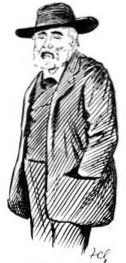
MR. JOSEPH COWEN.
Mr. Martin belonged to the Irish party, parliamentary sapeurs to whom nothing is sacred. Of English members, the first to break the traditions of the House in this matter was Mr. Joseph Cowen. In the course of an already distinguished career, he had never possessed a top-hat, and even the honour of representing Newcastle in Parliament could not drive him to alter the fashion of his head-gear. But like John Martin, he, whilst pleasing his own fancy, was careful not to offend the prejudices of others. He always entered the House bareheaded, and so sat throughout a debate, his broad-brimmed, soft felt hat not being donned till he had passed the doors. At this day the Speaker looking round a moderately full House will see half-a-dozen top-hats of various ages and shades of colour fearlessly worn. Mr. Keir Hardie, desiring to go one better in the effort to flout "the classes," was obliged to come down in a greasy tweed cap.
The exceptionally hot summer of last year gave opportunity for fresh lapse from the decent gravity of dress in the House of Commons. It was Lord Wolmer who first flashed a kamarband within sight of the astonished[Pg 647] Mace, a circumstance that made resistance hopeless. Had the fashion been adventured by some frisky but inconsiderable new member, it might have been frowned down before it had time to spread. But when the thing was seen round the moderately slim waist of the son, not only of an ex-Lord Chancellor, but of the gravest-mannered peer in the House of Lords, all was lost. Mr. Austen Chamberlain promptly followed suit; Mr. McArthur seized the opportunity to display an arrangement in silk of the Maori colours. The Irish members, determined that ordinarily slighted Ireland should not lag behind, met in Committee Room No. 15, and subscribed a shilling each to purchase a brilliant green kamarband for their Whip, Sir Thomas Esmonde. The fashion spread till, looked upon at question time of a summer afternoon, the House in the aggregate presented something of the appearance of a crazy quilt. The Front Opposition Bench had already succumbed to the epidemic. Every day when the House met members turned instinctively towards the Treasury Bench to see if Sir William Harcourt and the Solicitor-General had yielded to the prevailing influence. Happily before that befell the weather changed, the thermometer fell, and waistcoats were worn again.
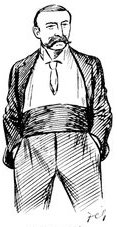
LORD WOLMER'S KAMARBAND.
Whilst members of the House of Commons have no special dress even for gala days, the House of Lords cherishes the immemorial custom of wearing robes on State occasions. Whenever a new peer takes his seat, not only is he robed himself, but is the cause of robing in others. The peers who introduce him are clad in raiment of scarlet cloth, slashed with ermine in varying fashion, indicating their rank in the Peerage. With them comes Garter King-at-Arms, the Royal Arms of England embroidered on his back.
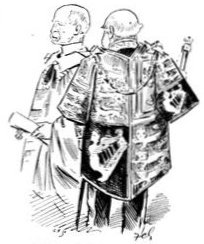
GARTER KING-AT-ARMS AND NEW PEER.
The only time the Lords sit robed en masse is on the occasions, now rare, when the Queen opens Parliament in person. That is one of the stateliest scenes in the pageantry of English public life. In modern times its most effective rendering was seen on the day when Mr. Disraeli, just made Earl of Beaconsfield, escorted his Sovereign to the throne, holding before him the sword of State. When "Dizzy" was yet a young man pushing his way to the front, he used to write almost daily to his sister, giving her a piquant account of scenes in which he had taken part. Of all his published works this, perhaps the least known, is the most charming. On the day when Vivian Grey, having realized the dream of his youth and become Lord Beaconsfield, marched into the House of Lords escorting his Sovereign, the sister was dead, and for "Dizzy" the opportunity and habit of writing familiar letters had passed away. A pity this, for an account of the scene and of the impressions made on his mind, written in the sprightly style of Disraeli the Younger, would be invaluable.
Years have passed since the event, but I can see, as if it had stridden past this morning, the familiar figure, looking taller by reason of the flowing robe that encircled it, the wrinkled face with eyes reverently bent down, and over all an air of supernatural solemnity.
There is no one like Sir Patrick O'Brien left to the present House of Commons, neither is there anyone who resembles Mr. Biggar or Mr. Dawson, sometime Lord Mayor of Dublin, a patriot with fuller allowance of spirit than of inches. It was he who, during debate on a provision of the Peace Preservation Bill, sternly regarding[Pg 648] the bulky form of Mr. Forster, then Chief Secretary, warned him that if, armed with the powers of this infamous Act, he were to approach the bedside of Mrs. Dawson in the dead of the night it should be over his (the Lord Mayor's) body. "Baker Pasha," as he was called in recognition of his commercial pursuits before drawn into the vortex of politics, went back to his shop, his early rolls, and his household bread, and soon after flitted to still another scene.
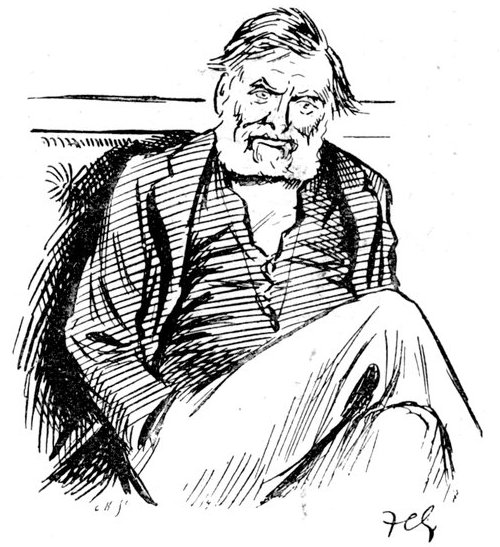
MR. FORSTER.
Captain Stacpoole was not much known to the reader of Parliamentary reports, but was long a familiar figure in the House. He had sat in it whilst Palmerston was leader, and his intimate friends had reason to believe that he had more to do with the direction of that statesman's policy and the destinies of the world than met the eye in contemporary records. It was Captain Stacpoole's custom of an afternoon to stand in the Lobby with his hat pressed on the back of his head, his legs apart, his hands thrust in his trousers pockets—with the exception of his little fingers, for occult State reasons always left outside. In this attitude, swinging backwards and forwards on heel and toe, he told at length what he had said to "Pam" on occasion, and what "Pam" had said to him.
He did not often interpose in debate, his best remembered appearance on the scene not being altogether successful. It happened, I think, in the year 1877, in debate on the Irish Sunday Closing Bill. The Captain joined a minority of some dozen of the Irish Nationalist members in opposing the measure. Mr. Macartney, father of the member for South Antrim, who at this day worthily maintains the Parliamentary prestige of the family, observed that of this group of members there was not one who was not connected with the liquor trade. Hereupon Captain Stacpoole jumped up, and, falling into his favourite position, shouted out, "I deny that. I have no connection with the trade."
"I beg the hon. member's pardon," said Mr. Macartney, "he is the one exception to the rule. He is not a producer, he is only a consumer," a hit at the Captain's convivial habits much appreciated by the Committee.
Captain Stacpoole has gone to rejoin his old friend and pupil, "Pam." Gone, too, are the O'Gorman Mahon, Mr. Delahunty, Mr. Ronayne, and Major O'Gorman, noblest Roman of them all. The Major had physical advantages which placed him head and shoulders above all contemporary humorists, conscious or unconscious. Whether he sailed up the House like an overladen East Indiaman; whether he sat on the bench with the tips of his fingers meeting across his corpulence, whilst his mouth twitched sideways as if he were trying to catch a fly; or whether he stood on his feet addressing the House apparently through a speaking trumpet, the Major irresistibly moved to laughter.
I suppose no man was so genuinely surprised as he when his maiden speech was received with shouts of laughter, members literally rolling about in their seats, holding with both hands their pained sides. The occasion was Mr. Newdegate's annual motion for the inspection of convents. The Major, not only a chivalrous gentleman but a good Catholic, was shocked at the threat of desecration of the privacy of Irish ladies by Commissioners armed with the authority of the law. He had devoted much care and research to the preparation of a speech opposing Mr. Newdegate's motion. The choicest part of it, to which everything led up, was the picture of some historic nun, boldly facing the Commissioners, with a verbatim report of her remarks on the occasion. It was understood that the nun in question was of Royal birth, who, either wearied of pomp and vanity, or driven from her high estate by cruel man, had betaken herself to a nunnery.
The House had with difficulty kept merriment within bounds up to the moment when the Royal recluse faced the wicked Commissioners. Thereupon the Major, having[Pg 649] to speak the nun's part, with dramatic instinct assumed a plaintive, almost a piping, voice. The nun was supposed to give a summary of her personal history to the Commissioners. But the Major never got beyond the detail, "I had a sister, her name was Sophia——." Even Disraeli, accustomed to sit sphinx-like on the Treasury Bench, joined in the shout of laughter that greeted this effort, and brought the Major's address to incoherent conclusion. This speech lifted the Major into a favoured position occupied by him till, cut off by the relentless command of Mr. Parnell, who had no sympathy with this kind of thing, he exchanged the Senate for the Board Room of the Waterford Poor Law Guardians.
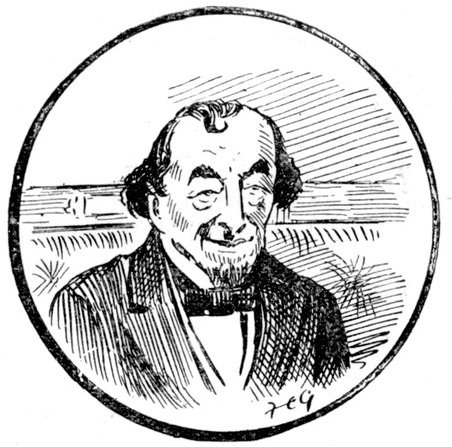
THE SPHINX SMILES.
Possibly there is no place in the present Parliament for a Major O'Gorman. Certainly there was no one returned at the last General Election who could fill it.
Among the not least substantial reforms effected in the present Session is that whereby, on the opening day, the process of balloting for places for private motions was relegated to an upper chamber. When, last year, the House of Commons, fresh from the polls, met on the eve of a memorable Session, two full hours of its precious time were wasted by a process that would not be tolerated in any other business assembly of the world. Out of a total of 670 members, 400 came down inflamed with desire to set somebody or something right. This they proposed to do either by moving a resolution or introducing a Bill. The House of Commons, whose order of procedure dates back to the Commonwealth, has ever been accustomed to this human weakness. It provided for it by the regulation that private members so possessed should ballot for precedence. Ministers, who also have a Bill or two to bring in, being masters of the situation, forthwith fix the day upon which they will take action. Private members must take the chances of the ballot.
That was all very well in former times, when at the opening of a new Session ten, twenty, or at most thirty members struggled for "an early day." On Tuesday, the 1st of February, 1893, the day which marked the doom of an ancient practice, over four hundred members desired to give notice of motion. Whilst preliminary business was going forward, the stranger in the Gallery would see a long line of members slowly making their way between the table and the Front Opposition Bench, to the great inconvenience of right hon. gentlemen seated thereon. Arrived by the clerk's desk, each man wrote his name on a sheet of foolscap, and passed gloomily on, making himself a fresh nuisance by returning to his seat along the crowded back benches. Each line of the foolscap on which a name was written was numbered. The clerk at the table prepared slips of paper carrying corresponding numbers, which he twisted up and threw into the box before him.
When the House presumably sat down to business, the Speaker took in hand the sheets of foolscap containing the list of members desiring to give notice. The clerk at the table tossed together the folded pieces of paper in the box, as if he were making a salad with his fingers. Then he took one out and called aloud the figure printed on it. Say it was 380. The Speaker, turning over his sheaf of papers, found that on the line 380 was written the name of Mr. Weir or Dr. Macgregor, and in sonorous voice recited it. That meant that the member in question had secured first place for his motion, and was at liberty to select what with due regard to all circumstances he looked upon as the most favourable day.
Suppose Mr. Weir were the happy man. He would rise, glance slowly round the House, produce his pince-nez, place it on his nose with solemn gesture, and in thrilling voice observe: "Mr. Speaker, Sir—I beg to give notice that on such and such a day I shall ask leave to bring in a Bill authorizing the local authorities at Ardmurchan Point to remove the village pump three yards and a half to the west of the point at which it now stands." What French reporters call mouvement consequent upon this announcement having subsided, Mr. Milman, most patient and[Pg 650] long-suffering of men, dived once more into the lucky box and fished out, with ostentatious integrity, another chance missive. The Speaker consulted his list again; possession of the second place was determined—and so on to the melancholy end.
Regarded as a parlour game, this performance has recommendations at least equal to Consequences, or Cross Questions and Crooked Answers. There is the excitement amongst members whose names have been written down as to who may be concerned in the fateful figure just drawn. Then there is the sort of book-keeping by double entry that must needs go on throughout the process. When the chances of the ballot have given away the best day, the next best day must be ticked off, and members yet uncalled must be ready to spring up when their time comes and claim it. For the general body of members there is the joke, endeared by long acquaintance, of the member who has written his name first on the list, having his number turn up, as it usually does, at the end of the first hour and a half of the process.
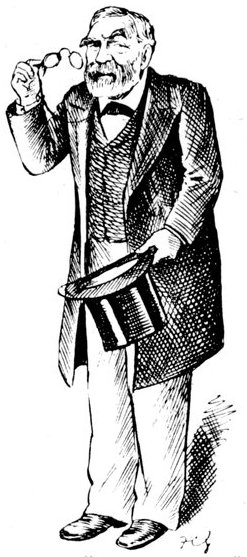
MR. WEIR: "MR. SPEAKER, SIR."
Even regarded as a parlour game, it palls upon one after the first hour and a half. Writing about it in the Daily News, of the 2nd of February in last year, I ventured to describe it as "a mechanical performance which might well be added to the useful labours of the Committee clerks, leaving the Speaker and the House of Commons opportunity for devoting their energies to more delicate duties." Twelve months later, Mr. Gladstone, incited by a question on the paper, privily brought the subject under the notice of the Speaker, who, with that courage which enables him from time to time to rise superior to effete traditions—and such courage when displayed in the Chair of the House of Commons is heroic—undertook to make an end of the absurdity. When the House of Commons met for the new Session in March last, the process of balloting for places was quietly and effectively carried on by private members in one of the Committee rooms, and two hours of time, with much vexation of spirit, was saved to the House of Commons.
Now this absurdity has been boldly grappled with there is hope that another anachronism may be relegated to its appropriate limbo. It is quite time the House of Commons, if it is to vindicate its claim to be a business assembly, should make an end of the whole machinery of the Address in reply to the Speech from the Throne. This, also, was well enough in the days of Old Sarum. It is now, for all practical purposes, as archaic as the hunt for traces of Guy Fawkes, which to this day precedes the opening of each Session, and it is not nearly so picturesque.
The object with which debate on the Address was originally devised was to provide convenient opportunity of challenging the existence of the Government, or at least of seriously debating some crucial line of their policy. It was a full-dress affair, chiefly confined to the giants of debate. If business were not meant, the conversation was usually brought to a conclusion before the dinner-hour on the opening night of the Session. It was confined to the mover and seconder of the Address, the Leader of the Opposition who criticised the Ministerial programme, and the Leader of the House who replied. There, as a rule, was an end of it. Even if fighting were meant and a division contemplated, it was only on rare occasions that the combat was carried over a single night. The House cheerfully sat till one or two in the morning to reach a conclusion of the matter.
The last time the House of Commons completed the debate on the Address at a single sitting was in the first Session of the Parliament elected in 1874. That same Parliament saw the birth of a party which, in a few years, changed many things in the ordinary procedure of the House of Commons. It was the Irish members, with Mr. Parnell and Mr. Biggar just coming to the front, who discovered the opportunities latent in the ceremony of debate on the Address for obstructing business and embarrassing the Ministry. The lesson was quickly assimilated by other factions, and of late years it has come to be a matter of course that debate on the Address shall be extended beyond a week. Last year ten of the freshest[Pg 651] days of the young Session were thus wasted. If the Address were the only opportunity presented for raising miscellaneous questions of public interest, the procedure would be defensible, even commendable. What happens is, that on the Address prolonged preliminary conversations take place round subjects which already stand upon the agenda of business, and will, in due course, be discussed again at further length, upon a notice of motion or the introduction of a Bill.
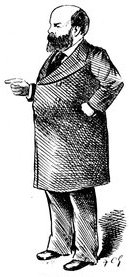
MR. FENWICK.
The House of Commons framing its Rules of Procedure, and anxious above all things to provide even overlapping opportunities for speech-making, supplies a final illimitable opportunity on the Appropriation Bill. This is brought in at the close of a Session, and upon its second reading members may discuss any subject under the sun. Any speech a member may have prepared at an earlier period of the Session, upon any subject whatsoever, may, failing the first legitimate opportunity, be worked off on the Appropriation Bill. This measure plays the part of the seven baskets in the parable. All the elocutionary or disputatious fragments that remain after the feast of the Session are picked up and crammed within its ample folds.
That is bad enough. But since discovery was made of potentialities of debate on the Address, that occasion has been utilized in analogous fashion. Now we have an Appropriation Bill debate at the beginning of the Session, with pleasing prospect of another at its close.
The present Session will be memorable in the long record, since it witnessed an innovation that is probably the beginning of the end of an absurd custom. From time immemorial it has been ordained that members moving and seconding the Address in reply to the Speech from the Throne shall array themselves in uniform if they have the right to wear it. Failing that, they must strut in the velvet and ruffles of Court dress. This Session Mr. Fenwick was selected to second the Address. The member for the Wansbeck Division of Northumberland is one of the most highly esteemed members of the House of Commons, a man of modest mien and great capacity, an excellent speaker, who has the priceless gift of conveying to an audience conviction that he knows what he is talking about and means what he says.

MOVER AND SECONDER.
Mr. Fenwick, as he has proudly recorded in the pages of "Dod," began his career as a working collier, and when, in 1885, elected to a seat in the House of Commons, he threw down his pick in the Bebside Colliery as a preliminary to having a good wash, changing his clothes, and going up to Westminster. Court dress is, of course, not common at Bebside, neither is the crimson and gold lace of the dauntless Colonel of Militia, or the epaulettes and tightly-buttoned frock-coat of the Rear-Admiral. If Mr. Fenwick had been inclined to act up to the spirit of the ordinance, he might have appeared in his old collier's garb. With pick and spade under his arm, and lantern in his hand, he would have made a picturesque figure. That, however, did not seem to occur to him, and he had the good sense to break through the tradition by appearing in his ordinary Sunday go-to-meeting clothes, leaving his colleague who moved the Address to dazzle the House with sight of the uniform of the 4th Oxfordshire Light Infantry.
A member of Parliament may at this day send from the House of Commons, post free, a certain number of copies of Parliamentary papers. This is a poor relic of the privilege of franking, long since abolished. Ministers still have the privilege of sending their letters post free. This is done by the medium of the stamp that marks an envelope "Official: Paid." Presumably this limits the privilege to official correspondence. But the line is, as a rule, not too closely drawn. When is added the fact, only recently established, and, I believe, not widely known in the House, that members may obtain from the post-office in the Lobby packets of excellent envelopes at the bare cost of the postage-stamps with which they are embossed, the list of special privileges pertaining to the estate of a member of the British Parliament corresponding with those enjoyed by foreign legislatures is completed.
There is one privilege much coveted by members domiciled in the neighbourhood of the House of Commons. It is the opportunity of approaching the West-end by driving through the Horse Guards' entrance by Whitehall. A supporter of the late Government who lived in Whitehall Gardens, and to whom this avenue would have been a particular convenience, used all his influence to obtain the coveted permission. In reply to his importunate demands, significantly addressed to the Chief Whip of his party, then in power, he received for answer: "My dear fellow, if you like I'll get you made an Irish Peer. But not being on the list, you may not ride or drive through the Horse Guards."
The thing has, nevertheless, been done. A popular Q.C. is accustomed to ride every morning along the Embankment to the Courts. One day, taking the upper ride skirting St. James's Park, he came out on the Horse Guards' Parade, and thought he would try the sentinelled passage into Whitehall. Walking his horse through, he was challenged by the sentry.
"Don't you know me?" he sternly said. "I am one of Her Majesty's Counsel."
The soldier saluted, and Mr. Frank Lockwood gravely rode on.

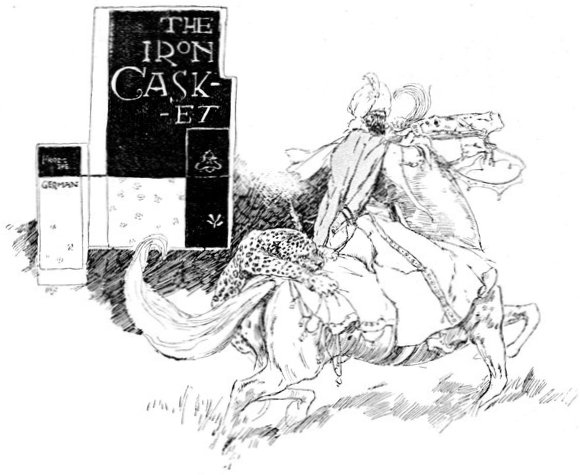
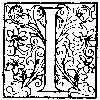
In Bagdad, in the little lane by the Golden Bridge, lived, ages ago, a merchant named Kalif. He was a quiet, retiring man, who sat early and late in his little shop, and went but once a year to Mosul or Shiraz, where he bought embroidered robes in exchange for otto of roses.
On one of these journeys, chancing to have fallen a little in the rear of his caravan, he heard roarings and trampling of horses' hoofs in the thicket close by the roadside. Drawing his sword, which he wore on account of thieves, he entered the thicket. On a little green, surrounded by trees, he saw a horseman in a light blue mantle and a turban, fastened by a flashing diamond. The horse, an Arab of purest blood, seemed to have lost its senses. Rearing upright with a piercing neigh, it struggled vainly to dislodge an enormous panther which had fixed its great claws in the horse's flanks. The rider had lost all control over it; blood and foam poured from its mouth and nostrils. Kalif sprang boldly out, and with a mighty stroke split the panther's skull, and flinging away his sword, ran to the horse's head, thereby enabling the rider to dismount. Having calmed the trembling animal, the horseman begged his rescuer to follow him.
"I had lost my way in the chase," he said, "and should have fallen a victim to the panther if Allah had not sent you to my aid. I will reward you well for your bravery. Come! let us seek my companions; there, behind that wood, my camp must be."
"I did what any other would have done in my place," answered Kalif, simply, "and expect no reward. But, if you so will it, I will accompany you to your tents."
The stranger took his horse by the rein and walked in silence at the merchant's side till they arrived at an opening in the trees. Here, surrounded by several smaller ones, stood one large tent of purple linen. A number of richly clad men threw themselves on their faces before the new comer. Then Kalif knew whom he had saved: it was the Shah himself! He was about to fall at his feet, but the Shah seized his hand and led him into the tent. Inside, standing on five stools, were five caskets, the first of gold set with jewels, the second of gold alone, the third silver, the fourth copper, and the fifth of iron.
"Choose one of these caskets," said the Shah.
Kalif hesitated. At length he said:—
"What I did is not worthy of any reward, but if you will it, oh! King of Kings, I will take one of these caskets to remind me of the day when my eyes were permitted to behold the Light of Asia."
He stooped and took the iron casket.
The Shah started. "Stranger," he said, "your modesty has met with its own reward. You have chosen the most valuable casket, for, look! the others are empty; but this one contains two jewels which possess the magic gift of bestowing undreamed-of power to their owner." He raised the lid and showed the wondering Kalif the two stones. "This one," he said, "is a lapis lazuli. Whosoever winds it in the folds of his turban, to him everything is known that has happened since the world began, and no secret can be hidden from him. But this stone," and he took a diamond the size of a dove's egg from the casket, "this stone brings all the riches he can think of to its owner. He has but to rub the stone and repeat his wish aloud." He replaced the stones in the casket, closed the lid, and handed it to the merchant, who thanked the Shah, hid the treasure in his robes, and hastened to rejoin his caravan.
Once more in his own house he often looked at the princely gift, and one day as he was rubbing the lid he noticed an inscription upon it that had hitherto been unseen. It ran:—
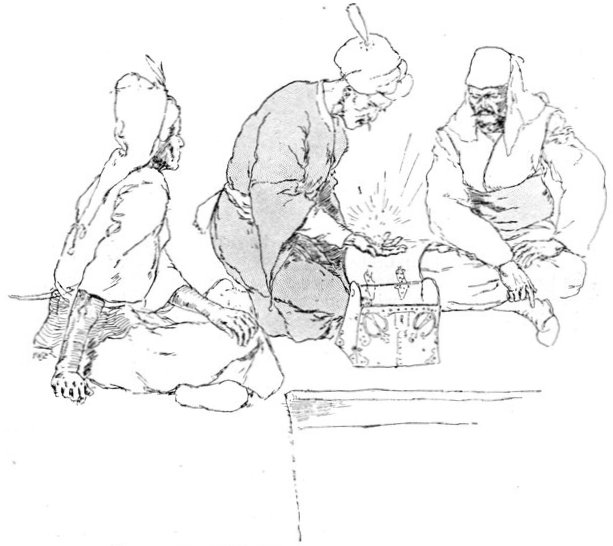
"THE ELDEST SON PROPOSED THAT THEY SHOULD DRAW LOTS."
He never spoke of his adventure in the Kalaat Mountains, neither could he ever make up his mind to test the virtue of the stones, being a frugal man on the one hand, and unwilling to surpass his neighbours in wisdom on the other. But at length the news of the Shah's rescue by the merchant reached even Bagdad, together with the account of the Royal reward, and people jostled one another to call on the merchant and see with their own eyes the wonderful casket. In consequence Kalif had more customers in one day than he generally had in ten years, and his daily receipts testified to the worth of the casket. For many years he enjoyed the reward of his bravery, and at his death Ali Haitam, the eldest son, proposed that they should draw lots for the magic stones. He had great ideas of his own cleverness, and hoped from the bottom of his heart to win the lapis lazuli. Ali Hassuf, the second son, whose sole failing was insatiable greed, was quite agreeable. (In secret he was revolving in his own mind how to obtain the diamond in case it fell into the hands of the youngest son.) But just as they were about to draw, Abdul Kassim, the youngest son, said: "Dear brothers, we are three, and there[Pg 655] are but two stones. It would be better, therefore, for one to renounce his claim in order that no dispute may arise in our hitherto peace-loving family. I am the youngest, and therefore can have least claim on the stones. Throw to decide which stone shall fall to each. I resign!"
The other two were delighted, and as it happened each got the stone he desired.
"But in order that I may have a keepsake of my dear father," continued Abdul Kassim, "permit me to take home the casket. It will be of no use to you since you have divided the contents."
Ali Hassuf hesitated at first, but finally agreed to Kassim's wish.
The three brothers left the empty house, and went each to seek his fortune in his own way.
Ali Haitam bought a piece of muslin, folded it into a turban, sewed the lapis lazuli inside, and fixed it firmly on his head. Then he went to the bazaar and waited for an influx of wisdom. And see! The power of the stone set to work and his mind was filled with knowledge! He knew the origin of all things, and his eyes could see through walls five feet thick! He passed the Caliph's palace, and he could see that in the recesses of the cellars were hidden 9,000 sacks of gold, and that Fatma, the daughter of the Caliph, was the most lovely maiden in the East; and an idea occurred to him that dazzled him. "How would it be," he thought, "if I placed my wisdom at the Caliph's disposal, became his first adviser, and finally married the lovely Fatma?" But together with this dream came the longing to display to an admiring crowd some proofs of his wisdom.
He hurried back to the bazaar, mounted the highest steps at the gates, and cried: "You people of Bagdad, who believe that the sun moves round the earth, you are ignorant fools and sons of fools! Hear now what I preach to you. The sun stands still, but the earth moves!"
He intended to continue, but the cries of the bystanders interrupted him.
"Ali Haitam has gone mad," they cried; "listen to the nonsense he is talking. Come, let us hold him head first under the lion's mouth at the spring; that will restore him to reason!"
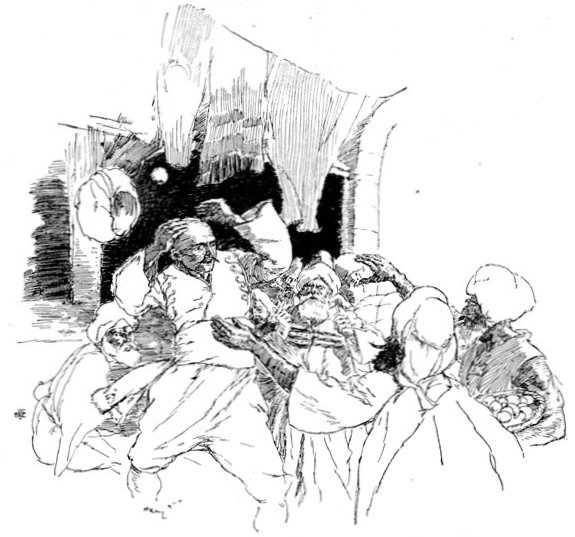
"THE JUICY FRUIT KNOCKED THE TURBAN FROM ALI'S HEAD."
And one, a fruit dealer, took an orange, and crying, "Ali Haitam is right, the sun moves just as little as this orange!" flung the orange at the philosopher on the steps. The juicy fruit knocked the turban from Ali's head. He stooped to regain it, but in vain. The fruit dealer's throw was the signal for a general onslaught, so that he was obliged to take to his heels and fly for home. Dirty and panting he reached his hut, deeply grieved at the loss of his precious stone, and furious at the stupidity of the people who showed so little understanding of the first principles of science.
The second brother started more cautiously. Since he had but seldom been further than the end of the narrow street, by the Golden Bridge, he was not in a position to think of anything very precious to wish for; he therefore first visited the bazaar and asked the price of everything he saw. At last he found something that, on account of its high price, made a great impression on him. It was a Turkish sword that a cunning jeweller had studded thickly with diamonds on handle and sheath. The dealer asked 1,500 golden coins for it, and the bystanders stared with open eyes at the man who dared to bargain for such costly possessions. Just as Ali Hassuf was weighing the precious sword in his hand, a palanquin was borne through the crowd. He turned, and through the drawn curtains caught sight of a maiden of wondrous beauty. When he heard that she was the Caliph's daughter, the desire awoke in his soul to marry this lovely creature, and it seemed to him not unlikely that the Caliph would give his daughter to a man of such note as he would become as the possessor of the magic diamond. He decided to buy the sword, and, armed with the same, to visit the Caliph the very next day.
"I shall come again the very first thing to-morrow morning," he said to the dealer. "I have not quite enough money with me now, but I shall procure it this evening. I had quite expected," he added, boastingly, "that the sword would be expensive."

"HE OPENED ONE, AND FELT INSIDE."
He turned and went home, where he saddled the thin ass and hung across its back two large panniers. When it grew dark he softly drove the beast through the yard and led it out into the desert. For about an hour he walked, and in imagination saw himself in possession of all the glories the talisman would bring him. He never noticed that he was followed by three dark forms, who had never lost sight of him since his visit to the bazaar. He halted by a group of stunted palms, spread out a large cloth, and with trembling fingers began to rub the diamond, crying at the same time: "Spirit of the Stone! send me at once twenty shekels of golden coins!" He waited a moment, and listened into the darkness, thinking he heard whispering voices. But as all was silent he repeated his wish for the second and third time. He heard a noise as of the falling of soft, heavy weights, and, on stooping, found twenty well-filled sacks. He opened one, and felt inside. And, truly! it was really gold in bright new coins! With feverish haste he slung the sacks on the ass's back, and turned its head homewards. Suddenly he heard once more the same mysterious whisperings, this time in his immediate neighbourhood. He stood still and listened with bated breath. He felt himself seized by heavy hands and thrown to the ground, and saw another form seize the ass. Two men with blackened faces tore off his turban and robe and left him lying half naked by the roadside, after having warned him to keep quiet as to this attack unless he wished to lose his life. Trembling with fright and rage, he saw the robbers disappear with his ass in the direction of the mountains. What pained him most was the loss of his diamond, which he had concealed in his robe. He reached home, where he lay hidden for weeks, too ashamed to show himself in the streets or at the bazaar. But once as he sat[Pg 657] on the Golden Bridge fishing, to try and provide himself with a frugal meal, the weapon dealer passed him by, and said: "Well, Ali Hassuf, when are you coming for your sword?"
But sword and Princess were for ever lost to Ali Hassuf.
In the meantime, as the two elder brothers sat mourning their losses, Abdul Kassim, the youngest, sat at home in his little house by the gardens, thinking with regret of his father, and wondering what he should do to earn himself his daily bread. Before him, on a little stool, stood the iron casket. There came a knock at the door, and Micha ben Jahzeel, the Jew, who had lent him money a month or two ago, walked in. Micha looked grave and said: "Abdul Kassim, times are bad, and ready money gets scarcer and scarcer. You know I lent you ten golden coins, and I have come to ask"—his eyes fell on the casket and he started, but collecting himself, went on: "I have come to tell you that I am not in an immediate hurry for the return of the loan. If you like you can keep it, or as it is hardly worth mentioning, keep it for some months, or even years if you like. I only wanted to tell you you needn't trouble about it, there is no hurry at all." He bowed low to his debtor and withdrew.
Abdul Kassim marvelled at the change in the Jew's manner, but as he thought of the looks he had cast at the casket he couldn't help smiling.
On the same evening came his neighbour, the clothes dealer, who had not visited him for years. "Dear friend," he said, and placed a bundle on the floor before Kassim, "I have come to entreat your pardon that my horse should have splashed your robe with mud the other day; he is a young thing, and is not yet properly broken. I have brought you a new robe to replace it, which I hope will please you." Then he withdrew. The young man could not recollect having been splashed by his neighbour's horse, still less could he account for the generosity of one who was celebrated for his meanness in presenting him with such an elaborately embroidered robe.
Next morning, just as he had put on his new robe, a distant relation arrived, bringing a magnificently caparisoned horse.
"Dear cousin," he said—formerly he had not even noticed him—"your appearance grieves me. I feared you were giving way too much to grief at the loss of your father, and it would give me great pleasure to cheer you a little. I have ventured to bring you this horse, which is overcrowding my stable; do me the favour to accept this little gift!"
Abdul Kassim would have refused, but the cousin had hurried away. There he stood holding the beautiful animal by the bridle. He could not resist the temptation to mount him. He swung himself into the saddle and rode into the town. Everyone bowed to him, and many stood still, saying: "There, I told you so! Abdul Kassim was always the favourite son, and he has inherited the casket!"
Next morning, as the barber sharpened his razor and began to shave the Caliph, the latter asked him: "Well, Harmos, what are my subjects talking about just now?"
The barber bowed to the ground and said: "What should they speak of, oh, King of the Faithful, if not of your goodness and wisdom?"
"Of your idiotcy, son of a she ass," shouted the Caliph, bored by the eternal flatteries of the barber. "Tell me, what are the people talking about?"
"They talk," began Harmos, hesitatingly; "they talk of the luck of your servant, Abdul Kassim, whom they call the wisest and richest of your subjects."
"Abdul Kassim? I don't even know his name," said the Caliph.
"He is the son and heir of Kalif," continued the barber, more courageously, "the same Kalif whom the Shah once rewarded with a magic casket."
He related at length all about the magic stones. The Caliph listened attentively, dismissed the barber, and sent a message to the Grand Vizier to come at once. The Vizier came and confirmed the barber's tale. "Abdul Kassim," he said, "knows everything that goes on in the world, and whenever he has a wish, all he has to do to fulfil it is to rub the diamond and say what he wants."
The Caliph grew serious. "Do you think, Vizier, that this man could usurp my throne? How would it be if I gave him a palace and raised him to be the husband of my daughter?"
The Grand Vizier agreed to the proposal of his ruler, and undertook himself to convey to the astounded Abdul Kassim the tidings that the Commander of the Faithful had given him a palace and awaited his visit.
The same evening the new favourite of the Caliph packed all his few belongings on the horse's back, took the iron casket under his arm and, amid the cheers of the crowd, entered the palace.
A troop of negroes received him and threw[Pg 658] themselves at his feet. An especially gorgeously arrayed slave led him into a room, where a banquet awaited him. Abdul Kassim had never fared so well in his life. But he did not forget to praise Allah for his goodness. Next morning he put on his gorgeous robe, bound on the magnificent sword he found in the great hall, and rode, accompanied by the negroes, to visit the Caliph.

"'SON OF A SHE ASS', SHOUTED THE CALIPH."
The Commander of the Faithful sat on the throne and awaited his subject, who, when he appeared, was about to throw himself in the dust at the ruler's feet, but the Caliph descended the three steps of the throne, and took the young man's hand.
"Are you Abdul Kassim," he said, "son of Kalif, the merchant who lived by the Golden Bridge?"
"I am he, Caliph," answered Abdul; "permit me to express my thanks for the palace with which you have endowed your most humble servant."
"I have heard much good of you," said the Caliph, when he had ordered his suite to retire; "and pray you to show me the magic jewels that help you to such power and wisdom."
"Of which jewels are you speaking?" asked Abdul Kassim, amazed.
"Well," smiled the Caliph, "which jewels should I mean but those you have inherited from your father?"
The young man stared. So the Caliph, too, took him for the possessor of the magic stones? Without reserve he confessed that, to avoid disputes, he had voluntarily retired and left the stones to his brothers.
"But," said the Caliph, "Micha ben Jahzeel, the Jew, saw the casket in your house!"
"The casket he may have seen," answered Abdul Kassim; "I begged it of my brothers in memory of my father."
The Caliph seemed still in doubt. He sent a slave to Abdul Kassim's palace to bring the casket. The messenger brought it, gave it to the Caliph, and retired. The Caliph opened the lid and looked inside. It was in truth empty! His gaze fell on the inscription:—
He read the verse and looked at the youth. "Abdul Kassim," he said, "you have jewels in your heart more precious than all the treasures of the earth. For love of your brothers you gave up the stones, and for love of your father you have preserved this seemingly worthless casket. But Allah has blessed you for your virtues and has, by means of this humble iron casket, raised you to power and wealth. I dare not refuse[Pg 659] to assist you. I will give you the most priceless gift at my disposal—the hand of my only daughter."
He called the chief overseer of the harem and bade him lead Fatma to the throne-room. The maiden had passed the night in weeping, for she had heard that she was to be given in marriage to a strange man. She shuddered at the thought, for as only child of the Caliph she had been thoroughly spoilt, and hated the idea of leaving her father's roof.
Abdul Kassim, who until now had been struck utterly dumb with astonishment, could not refrain from a cry of admiration at the sight of the lovely Fatma. She seemed to him a hundred times more beautiful than any description he had heard of her in Bagdad.
In the midst of her grief Fatma retained her woman's curiosity, and on hearing the youth's voice, cast one glance at him over her father's shoulder. The first impression seemed not unfavourable. She eyed his slender form as he stood leaning on his sword, and gradually ceased her sobbing. She even raised herself and took hold of the Caliph's arm. "Father," she said, "do with me what you will; not without cause do the people call you 'The Wise One.'"

"'FATHER,' SHE SAID, 'DO WITH ME WHAT YOU WILL.'"
So Fatma was married to Abdul. But neither she nor any other ever knew that the iron casket connected with her young lord's rise and power was empty. The Caliph advised his son-in-law to maintain the deepest silence as to the absence of the magic jewels.
In the fifth year of their wedded life the Caliph, feeling the weight of advancing years, abdicated in Abdul Kassim's favour, so the verse on the casket lid was fulfilled, and Abdul Kassim reigned many, many years over Bagdad, the best and wisest ruler who had ever ascended the throne. Allah's name be praised!
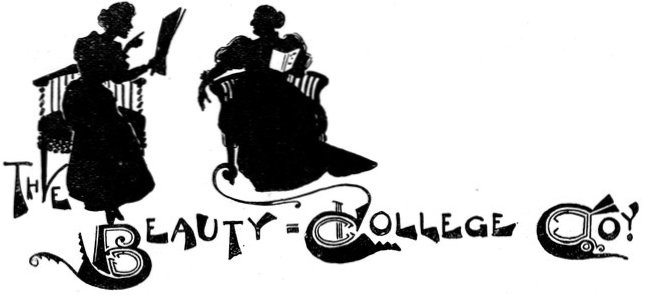

"Mother! Have you seen this?" exclaimed Genevieve. "Do listen what the paper says:—
"'The latest American notion is the recently instituted College of Beauty in New York. The College course knows nothing of dyes, or cosmetics, or powders.... One branch of study deals with the features of the face. The most enchanting beauty of expression will result from the methods adopted in the College. The effect of music on the features receives great attention; the eyes are to be enlarged by Verdi's music; the air of intelligence heightened by Chopin's; and various other ameliorations brought about by other composers, and poets, and so forth.' Just fancy, mother!"
Genevieve was wrapped in silent musing for some minutes; then she arose and crossed over to the mirror and gazed critically into it.
"Of course, it's all nonsense, mother, eh?" she said.
"Most absurd nonsense, my love—most absurd!" replied Mother.
Then Genevieve opened the piano abstractedly and began passing her fingers mechanically over the keys, which, strange to say, gave forth an air by Verdi. The mirror was right opposite Genevieve as she sat at the piano, and she looked casually at it many times.
When tea-time came, two hours and a half later, she was still strumming—strumming a little thing by Verdi, as it happened. Mother sat and smiled upon her indulgently.
That night, when Genevieve had retired to rest, she heard the faint sounds of the piano from the drawing-room; it was playing an air from Verdi. Mother was the only person downstairs who could play the piano.
"Mother," said Genevieve, next day, "of course that must be all nonsense about the College of Beauty, eh? Of course, it would be quite impossible to make oneself more beautiful by——"
"Of course, Jenny, of course—sheer nonsense!" said Mother.
"Ye-es, of course," said Jenny. "But I've often thought I should so love to see New York—haven't you?"
"New York is—no doubt—a—a very interesting place," said Mother.
"Do let's go—just to see New York!" said Genevieve.
"Er—well; I'll speak to papa about it. You do want a change," said Mother.
There was a ring.
"Oh, mother, here's Miss Cloot just getting out of her victoria," said Genevieve. "Now, the College of Beauty would be a godsend to her! You must really tell her about it—it would be a charity!"
Miss Cloot was the ugliest old maid in London and its environs within a radius of twenty miles; she was really dreadful—that's the only word for it. She was comfortably off, yet she was still a spinster at forty. She was a remarkable woman, was Miss Cloot—you'll see.
During a lull in the conversation, Mother introduced the subject of the College of Beauty—as a charity. At first Miss Cloot listened with somewhat feeble interest; but after a few moments there suddenly appeared[Pg 661] in her eye a remarkable light; beyond that, there was little perceptible change in her manner; but anyone who knew her well would have known that that light in her eye meant something.
"Dear me, yes, very interesting—an excellent notion," said Miss Cloot, blandly.

"'AN EXCELLENT NOTION,' SAID MISS CLOOT."
"But you can't think for an instant that there's anything in it?" said Mother.
"Dear me, why not?" said Miss Cloot. "I have no doubt there's a great deal in it. Why shouldn't there be?—'Too wonderful to be true!'—well, but, are Edison's inventions too wonderful to be true? Oh, dear me, no! Not a bit too wonderful. You may be sure there's something in it."
"Do—er—do you propose to——?" began Mother: and then it suddenly occurred to her that she had better not ask that question; so she turned it off to—"get any new things this spring?"
Miss Cloot went straight home with that remarkable light in her eye all the time; and when she got in she straightway sat down and wrote a dozen letters. Miss Cloot numbered among her extensive acquaintance twelve old maids, all comfortably off, and all plain—though falling short of her own attainments in the latter respect.
On the evening of the following day there was a tea party at Miss Cloot's—it consisted of those twelve other old maids of her acquaintance. It was more of a board meeting than an ordinary tea party, for they took their seats round a table at the head of which sat their hostess.
"Ladies!" said Miss Cloot (who really was a remarkable woman—the more I reflect upon her, the more I am impressed by this fact), "I have asked you here to-day to discuss a very important matter—very important to us. Possibly you may have seen this paragraph in the newspaper?" and she handed round the cutting which she had taken from Genevieve's paper.
The twelve old maids read it, and did not seem to see much in it. Miss Cloot's keen intuition perceived this.
"I did not expect you to. We can't all be of brilliant intellect, of course," she said. "Pray don't think I blame you for any deficiencies in that respect; we none of us can radically alter the intelligence—or want of it—which has been vouchsafed to us."
"But this is a hoax, of course, Celina?" said Miss Wheevyl. "Quite absurd and impossible!"

"THERE WAS A TEA PARTY AT MISS CLOOT'S."
"Not in the least!" replied Miss Cloot, emphatically. "Neither absurd nor impossible. That's where you show your ignorance, Jane. Pray understand, my friends, that I am not proposing that you should all rush out to that College in New York (although Heaven knows you all need its assistance); no, you will do better by remaining where you are. Now, concerning this College. I know what you are going to say—'It doesn't exist!' Very well; what I have to say is, if it doesn't exist, why——"
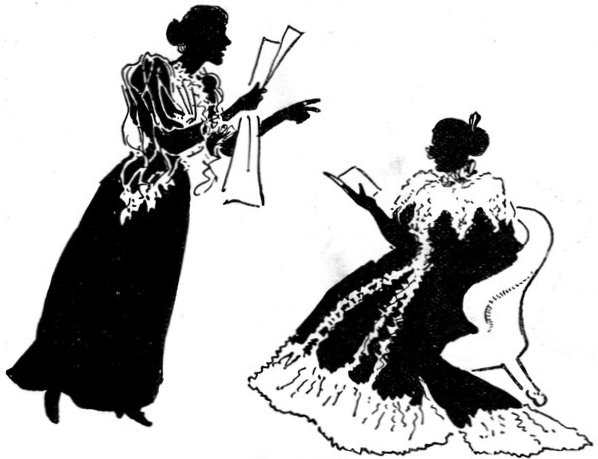
"DO LISTEN!"
At this moment, unfortunately, the door of the council-chamber was suddenly shut, and we heard no more.
"Mother!" said Genevieve, a week or so after, "there's a whole page of advertisement of that College of Beauty in New York! Do listen: 'Ladies desirous of enrolling themselves as students at the College of Beauty are requested to send in their names at once to the secretaress, Madame Brown. The first hundred ladies will be received at the following reduced fees: Facial-Beauty Curriculum (including Eye-Enlarging, Gaze-Softening, Dimple, Ethereal-Expression, Piquancy, and other classes), 100dols. per term of twelve months.... The system having now been perfected and exhaustively tested, testimonials from Ladies Well Known in Society, who have been rescued from VARIOUS DEGREES OF HOMELINESS and developed into Beauties of the First Water, will be sent to all applicants. The leading transatlantic steamship companies have made special arrangements for the conveyance of parties of ladies proceeding to the College of Beauty, New York.'
"Of course, it can't be true, can it, mother?" said Genevieve.
"Oh, dear, no, my love," said Mother.
"But we will go and have a look at New York; won't we?"
"Yes, I think we may as well."
The booming of the College of Beauty re-echoed deafeningly from end to end of the London Press. The subject was dragged into every paragraph about everything. It was the universal topic.
Some weeks after this Jenkinson looked up Wiffler in the evening, and threw himself down in a chair with an exclamation of disgust.
"Hanged if they haven't gone!" he grunted.
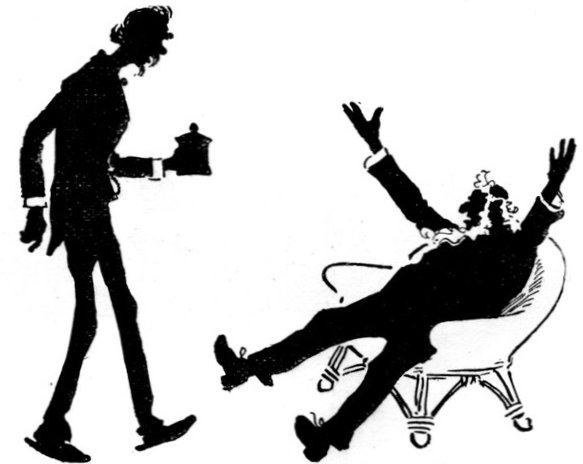
"HANGED IF THEY HAVEN'T GONE!"
"Gone? Who?" said Wiffler, passing the tobacco-jar.
"Why, Mrs. Jenkinson and Genevieve have gone to New York—for a change, they said; but they can't hoodwink me. They've gone to that College of Beauty—that's where they've gone! Nice state of things for me! Left all alone, as if I didn't happen to have such articles as a wife and daughter.... Where's your wife? Theatre—opera?"
"Not a bit of it!" replied Wiffler, gloomily. "Gone to New York, my friend; and now I see why they were so mad to go that way, although Matilda hates the sea and always gets frightfully ill. Now I see!"
At that moment Gradbury burst in melodramatically, the image of despair.
"Hullo, Gradbury!" said the other two, "what's wrong with you?"
"Ugh! Everything!" growled Gradbury. "Nice game for a man's wife and three daughters and niece to go off all at once to——"
"New York?" cried Wiffler and Jenkinson, in a breath.
"Ah!—that's the very place!" shrieked Gradbury. "And I'll tell you what—I've my suspicions that——"
"Your suspicions are well founded," said Jenkinson, in a hollow voice. "That was their object."
Then those three miserable men went off to the club; and the hubbub as they entered the smoke-room told them that something was amiss. Frodwell was standing on the hearthrug declaiming about the right place for a wife being by her husband's side instead of frivolling off to crack-brained colleges holding out all manner of insane and impracticable ——.
About twenty other clubbites stood round and grunted approval.
Anger and gloom were the dominant principles of that smoke-room.
"Your wife gone over? Oh, no, of course, you haven't got a wife," said Jenkinson to young Flabtree.
"No; and what's more, I'm not likely to have one now. My best girl's gone over to New York—for three years she thinks. Hanged if I know how she can be improved by that fool of a college—for that's where she's off to, you bet! Her fringe keeps frizzy in wet weather, and she has a little dimple each side of her nose; so what more can she want?"
"All my best girls have gone!" said poor young Grownder, sinking into a settee and covering his face with his hands.
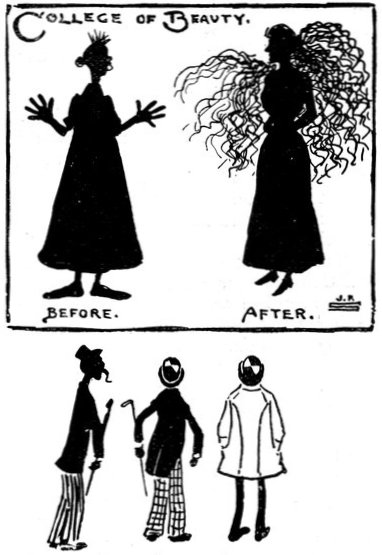
"POSTERS."
It was the same sad story at every club you entered; bereaved married men and deserted bachelors stood mopingly on the hearthrugs or flopped in limp despair on the big chairs. Every day the papers had been filled with advertisements and "pars" and articles about the College of Beauty; flaring posters, with pictures of a lady, before and after a course of the College, covered London: the before lady had wild red hair, a pug-nose, a heavy squint, one immense front tooth, lips like a negro's, and the figure of a sack of potatoes; the after lady—supposed to be the same person—had a Grecian nose, great blue eyes, wavy brown hair, and an ideal figure. Every day the crisis became more grave; the great transatlantic lines had hired extra ships to fill with ladies proceeding to New York: it had been made "worth the while" of several eminent London physicians to prescribe a course of "New York." The sight of a lady in the London streets was becoming more and more rare. Men in a hopeless state of dejection, even of melancholy insanity, roved aimlessly about the pavements. The club-houses had to hire extra accommodation for men whose homes, bereft of the feminine element, had become loathsome and abhorrent to them.
Beautiful suburban villas were left deserted, the dust growing visibly upon the furniture; domestic life among the upper and middle classes had ceased to exist. The milliners' shops were closed; suburban tradesmen were becoming bankrupt; feminine parts at the theatres were played by youths as in old times, while the stalls and dress-circle presented an unbroken line of wretched men, clad in tweed suits, dressing-gowns—anything; so demoralized does man become the instant the refining influence of woman is withdrawn.
There was another board-meeting of the spinsters at Miss Cloot's. Their number was reduced by two recalcitrants, who had been unable to resist the New York fever and had deserted the ranks.
"Idiots!" said Miss Cloot.
Miss Cloot rose at the head of the table and said:—
"Ladies, I need hardly tell you that the operations of our society have been, and are, a complete success. In the course of another week there will not be a woman of any position, except ourselves, in the Metropolitan area. Our secretary, Miss McSwinger, will read to you the numbers of embarcations for New York for the week ending yesterday; and Miss Gorgonia V. Nickerbocker, our New York factotum, is now present among us, and will set before you the statistics of the hiring and fitting up of new annexes of the College of Beauty, which at present accommodates four million seven hundred thousand and odd ladies.
"You will recall to mind how, at our first and preliminary meeting, I said to you: 'What I have to say is, that if this College of Beauty, set forth in this newspaper cutting, does not exist, why, it shall exist; and we will create it.' Whether the original College ever did exist I do not know, but ours does. Ladies, it was an idea such as has seldom occurred to woman since the beginning of time. You came wisely forward and threw in your money with mine to set this great work on foot; our money has now gone; but, by reason of the term-fees paid by the pupils, the College is now entirely self-supporting.
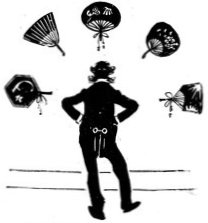
"THE LAYING-IN OF JAPANESE FANS."
"Now, ladies, is your time! All the pretty women have gone to New York; every month a certain number of men in this vast Metropolis suddenly decide to marry; for the last five months the deciders have lacked the item indispensable to the carrying out of their object—a woman to marry. The domestic arrangement which they calculated upon, and had prepared for, in many cases even to the laying-in of Japanese fans, scent-cases, hanging wardrobes, and other articles of furniture, has been hopelessly postponed.
"The aggregate of outstanding matrimonial decisions has, owing to the absence of a helpmate to join the board after allotment, become enormous.
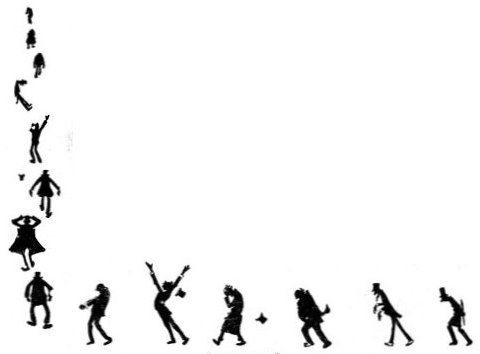
"WRETCHED MEN."
"Ladies, those men must marry someone, or the scent-cases and wardrobes will lose[Pg 665] their freshness: and they must marry US, or none. It may surprise you when I say that they will prefer even you to none: but you will find it is so!
"Ladies!" she continued, "we have triumphed! Do you hear the murmur without—the murmur of multitudes like the ocean? It is the men! They know that eleven eligible spinsters—not to speak of our excellent factotum, Miss McSwinger—are assembled in this room. Look!"
In two strides she had reached the window-curtains. She threw them back. Without, the whole square and adjacent streets were packed with a surging mass of stove-pipe hats.
As the curtains separated there arose a vast and deafening shout, while ten thousand hands simultaneously held aloft ten thousand wedding rings.
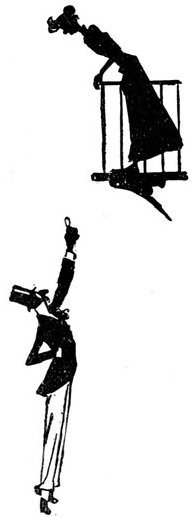
"MISS CLOOT STEPPED OUT UPON THE BALCONY."
Miss Cloot opened the window, and stepped out upon the balcony.
"Gentlemen!" she said, "I must entreat you to be patient and maintain order. It is impossible for us to accept all of you: I regret to inform you that twelve only amid your vast and imposing throng can be made happy. If you will disperse in an orderly way, you can obtain Offer of Marriage forms, which I will ask you to fill up with particulars of your stations in life, incomes, characters, and other details. I have made arrangements so that the forms can be obtained of any respectable chemist, bookseller, tobacconist, or house agent, or at the Army and Navy or Civil Service Stores.
"All applications will be considered, and the acceptations printed in the Times, Pink 'Un, Matrimonial News, and Exchange and Mart.
"I will now entreat you to disperse quietly, without any demonstration. Good-day."
Three weeks from that time the twelve spinsters were married at St. George's. Miss Cloot had accepted a duke, seven other ladies earls, one a wealthy brewer, two pill millionaires, and the remaining one a poet-laureate. Some time after, the ladies began to return from New York; whether they are any lovelier, I cannot say. Can woman be lovelier than she is? Never mind, I don't want a series of letters about it.
At any rate, those twelve ladies married at St. George's are all very, very happy; which shows that, although beauty and goodness are inestimable gifts, wits are worth having.
J. F. Sullivan.
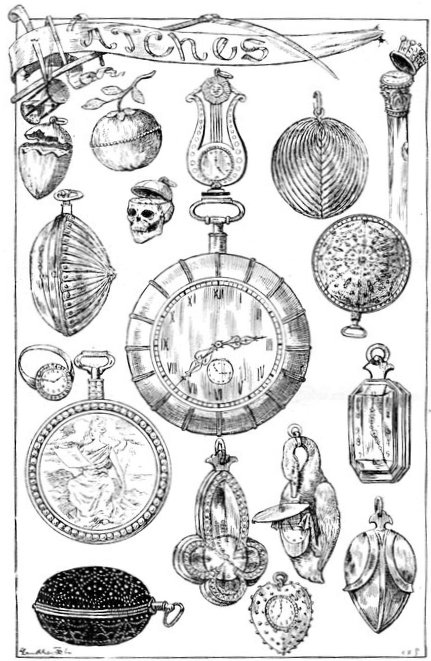
Watches
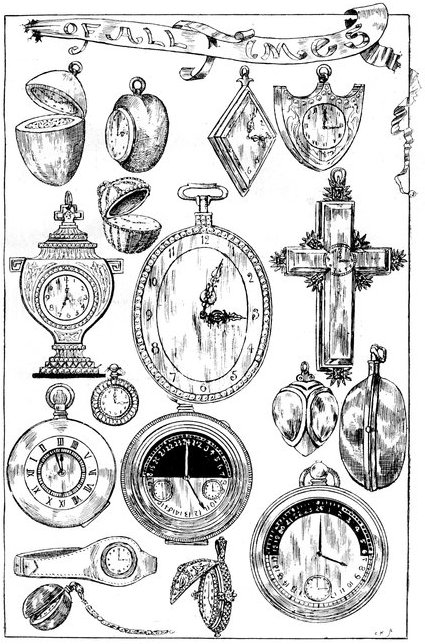
of All Times
| PAGE. | |
|---|---|
| ACTORS' MAKE-UP | 149 |
| (Illustrations by Horace Moreham.) | |
| ANARCHIST, AN. From the French of Eugéne Moret | 339 |
| (Illustrations by Paul Hardy.) | |
| ANTONIO'S ENGLISHMAN. By W. L. Alden | 451 |
| (Illustrations by Paul Hardy.) | |
| ARTISTS' CLUB, A BOHEMIAN. By Alfred T. Story | 488 |
| (Illustrations by G. G. Kilburne, W. H. Pike, Robt. Sauber, J. Finnemore, W. A. Breakspear, C. Cattermole, Carl Haag, and W. D. Almond, and from Photographs by Scott & Sons, Exeter, and Russell & Sons.) | |
| BEAUTIES:— | |
| XIII.—Children: Miss Edith Marguerite Dickinson, Miss Dorothy Birch Done, Miss Evelyn Mary Dowdell, Miss Madge Erskine, Miss Winnifred Emma Heale, Miss Kathleen Keyse, Miss Nelly M. Morris, Miss Aligander Smith, Miss Myrta Vivienne Stubbs | 77 |
| XIV.—Ladies: Miss Christine Beauclerc, Mrs. W. H. Cook, Miss Croker, Mrs. Gardner, Miss Maud Gonne, Miss Hamilton, Miss Jameson, Miss Evelyn Millard, Lady Helen Vincent | 186 |
| XV.—Children: Miss May Barnes, Miss Doris Mamie Butler, Miss Doris G. Clegg, Masters Cuthbert, Eustace, Michael, and Cyril Cox, Miss Gracie Dodds, Miss Gladys Huddart, Miss Gladys Lilian Tansley, Miss Muriel Glanville Taylor | 270 |
| XVI.—Ladies: Miss Barnett, Miss Annie O'Deane, Miss Nancy Noel, Miss Agnes C. Stevenson, Miss Nora Williamson | 426 |
| XVII.—Children: Misses Dorothy and Marjorie Holmes, Miss Phyllis Lott, Miss Katie Martindale, Miss Margot Amy Cecil Russell, Miss Winifred Mary Winter | 538 |
| XVIII.—Ladies: Miss Daisy Baldry, Mrs. Glyndeur Foulkes, Miss Franks, Miss Mabel Morphett, Miss Louie Spencer, Miss Irene Vanbrugh | 634 |
| BETWEEN THE ACTS. From the French of M. Blowitz | 115 |
| (Illustrations by Paul Hardy.) | |
| BLIZZARD, LOST IN A. By G. H. Lees | 285 |
| (Illustrations by W. Christian Symons.) | |
| BRITISH EMBASSY AT PARIS, THE. By Mary Spencer-Warren | 289 |
| (Illustrations from Photographs by Messrs. Gunn & Stuart, Richmond.) | |
| BURDETT-COUTTS, THE BARONESS. (See "Illustrated Interviews") | 348 |
| CAMBRIDGE UNION SOCIETIES, OXFORD AND | 502 |
| CLARK, PERSONAL REMINISCENCES OF SIR ANDREW. By E. H. Pitcairn | 65 |
| (Illustrations from Photographs by Messrs. Mayor & Meredith, Bassano, and Wyrall; and from a Painting by G. F. Watts, R.A.) | |
| COMPOSERS WORK, HOW. By F. A. Jones. | |
| Part I.—With facsimiles of the MSS. of Sir Joseph Barnby, John F. Barnett, Jacques Blumenthal, F. H. Cowen, Alfred R. Gaul, Charles Gounod, Edward Grieg, and Chas. H. Lloyd | 206 |
| Part II.—With facsimiles of the MSS. of Meyer Lutz, A. C. Mackenzie, Tito Mattel, Hubert Parry, Ebenezer Prout, Rubinstein, Saint-Saëns, Stanford, Strauss, Berthold Tours, and P. Tschaïkowsky | 428 |
| COOPER, R.A., THOMAS SIDNEY. (See "Illustrated Interviews") | 227[Pg 670] |
| CRIMES AND CRIMINALS:— | |
| I.—Dynamite and Dynamiters | 119 |
| II.—Burglars and Burgling | 273 |
| III.—Coiners and Coining | 416 |
| IV.—Forgers and Begging-Letter Writers | 627 |
| (Illustrations from Photographs and Drawings.) | |
| DIARY OF A DOCTOR, STORIES FROM THE. By the Authors of "The Medicine Lady." | |
| VII.—The Horror of Studley Grange | 3 |
| VIII.—Ten Years' Oblivion | 159 |
| IX.—An Oak Coffin | 255 |
| X.—Without Witnesses | 394 |
| XI.—Trapped | 465 |
| XII.—The Ponsonby Diamonds | 606 |
| (Illustrations by A. Pearse.) | |
| DICKENS, THE SIGNATURES OF CHARLES. By J. Holt Schooling | 80 |
| (Illustrations from facsimiles.) | |
| DIVING-DRESS, MY. By One Who Has Done With It | 383 |
| (Illustrations by Harold Piffard.) | |
| FAMILY NAME, THE. From the French of Henri Malin | 99 |
| (Illustrations by H. R. Millar.) | |
| FULLER, LÖIE. The Inventor of the Serpentine Dance. By Mrs. M. Griffith | 540 |
| (Illustrations by Sarony, New York; Mora, New York; Elder, Iowa; Reutlinger, Paris; and Riders, Chicago.) | |
| GIOVANNI. By J. D. Symon | 133 |
| (Illustrations by J. Finnemore.) | |
| HANDCUFFS | 94 |
| (Written and Illustrated by Inspector Moser.) | |
| HELMET, THE. From the French of Ferdinand Beissier | 41 |
| (Illustrations by Jean de Paleologue.) | |
| HOLLAND, THE QUEEN OF. By Mary Spencer-Warren | 17 |
| (Illustrations from Photographs by Messrs. Gunn & Stuart, Richmond, and W. G. Kuijer, Amsterdam.) | |
| ILLUSTRATED INTERVIEWS. | |
| XXX.—Mr. Edward Lloyd. By Harry How | 175 |
| (Illustrations from Photographs by Messrs. Elliott & Fry.) | |
| XXXI.—Mr. Thomas Sidney Cooper, R.A. By Harry How | 227 |
| (Illustrations from Drawings and a Painting by Mr. T. S. Cooper, R.A., and from Photographs by Messrs. Elliott & Fry.) | |
| XXXII.—The Baroness Burdett-Coutts. By Mary Spencer-Warren | 348 |
| (Illustrations by Warne Browne, Sir Edmund Henderson, Edmund Caldwell, and from Photographs by Messrs. Elliott & Fry.) | |
| XXXIII.—Mr. Charles Wyndham. By Harry How | 513 |
| (Illustrations from a Painting by John Pettie, R.A.; and from Photographs by Messrs. Elliott & Fry; London Stereoscopic Co.; Falk, New York; Barraud; and Mr. John F. Roberts.) | |
| XXXIV.—Sir Francis and Lady Jeune. By Harry How | 575 |
| (Illustrations from a Drawing by Mr. Harry Furniss, and from Photographs by Messrs. Elliott & Fry.) | |
| IRON CASKET, THE. From the German | 653 |
| (Illustrations by H. R. Millar.) | |
| JEUNE, SIR FRANCIS AND LADY. (See "Illustrated Interviews") | 575 |
| LAND OF YOUTH, THE. A Story for Children. A Scandinavian Popular Tale | 212 |
| (Illustrations by H. R. Millar.) | |
| LESSEPS, COUNT FERDINAND DE. By His God-daughter | 636 |
| (Illustrations from Photographs by Nadar, Reutlinger, Liébert, and Daireaux, Paris.)[Pg 671] | |
| LIGHT: A London Idyll. by E. M. Hewitt | 591 |
| (Illustrations by Paul Hardy.) | |
| LLOYD, MR. EDWARD. (See "Illustrated Interviews") | 175 |
| MARTIN HEWITT, INVESTIGATOR. By A. G. Morrison. | |
| I.—The Lenton Croft Robberies | 305 |
| II.—The Loss of Sammy Crockett | 361 |
| III.—The Case of Mr. Foggatt | 526 |
| IV.—The Case of the Dixon Torpedo | 563 |
| (Illustrations by Sidney Paget.) | |
| MIRROR, THE. From the French of George Japy | 90 |
| (Illustrations by Alan Wright.) | |
| MUSIC OF NATURE, THE. By T. Camden Pratt. Part II. | 46 |
| (Illustrations by Adolph G. Döring.) | |
| OXFORD AND CAMBRIDGE UNION SOCIETIES, THE. | |
| I.—Oxford. By J. B. Harris-Burland | 502 |
| (Illustrations from Photographs by C. Court Cole & Gillman, Oxford.) | |
| II.—Cambridge. By St. J. Basil Wynne Willson, M.A. | 507 |
| (Illustrations from Photographs by Stearn, Cambridge; London Stereoscopic Company; and Beaufort, Birmingham.) | |
| PALACE OF VANITY, A. From the French of Mme. Emile de Girardin | 322 |
| (Illustrations by H. R. Millar.) | |
| PICTURES, SOME INTERESTING | 640 |
| (Illustrations by a Chinese Artist, Lord Nelson, W. M. Thackeray, John Gadbury, and from a Photograph.) | |
| PORTRAITS OF CELEBRITIES AT DIFFERENT TIMES OF THEIR LIVES:— | |
| Astley, Sir John, Bart | 626 |
| Bannerman, Mr. Campbell, M.P. | 415 |
| Burton, Lady | 157 |
| Canziani, Madame (Miss Louisa Starr) | 624 |
| Cole, Madame Belle | 51 |
| Dilke, Sir Charles, M.P. | 500 |
| Dilke, Lady | 501 |
| Dumas, Alexandre, Fils | 158 |
| Godfrey, Dan | 305 |
| Hesse, The Grand Duke of | 412 |
| Ibsen, Henrik | 156 |
| Kennedy, Mr. Justice | 304 |
| Leitner, Dr. G. W. | 623 |
| Lichfield, The Bishop of | 155 |
| Loch, Sir Henry | 50 |
| Lopes, Lord Justice | 411 |
| Mackenzie, Dr. | 154 |
| Peterborough, the Bishop of | 52 |
| Rosebury, Lord | 498 |
| Russia, Czar of | 302 |
| Saxe-Coburg, Princess Victoria Melita of | 413 |
| Scott-Holland, Rev. Canon | 497 |
| Stoddart, A. E. | 625 |
| Temple, Sir Richard, M.P. | 54 |
| Tupper, Sir Charles | 622 |
| Wantage, Lord | 53 |
| Wellington, Duke of | 303 |
| Wills, Mr. Justice | 499 |
| Winchester, Bishop of | 301 |
| Worcester, Bishop of | 414 |
| QUEEN'S YACHT, THE | 587 |
| (Illustrations from Photographs by G. West & Son, Southsea; and Symonds & Co., Portsmouth.) | |
| QUEER SIDE OF THINGS, THE:— | |
| Beauty College Company, The | 660 |
| Lamps of All Kinds and Times | 110 |
| Master of Grange, The | 330 |
| Major Microbe | 104 |
| Mr. Hay | 553 |
| Off to the Station | 560 |
| Pal's Puzzles | 224, 448, 668 |
| Thinner-Out, The | 218 |
| Two Styles, The | 112 |
| Unbelievers' Club, The | 440 |
| SINGING BOB. By Alice Maud Meadows | 197 |
| (Illustrations by W. C. Symons.)[Pg 672] | |
| SMILE, THE BIRTH OF A | 306 |
| (Illustrations from Photographs by Messrs. Elliott & Fry.) | |
| SPEAKER'S CHAIR, FROM BEHIND THE. By Henry W. Lucy | 189, 388, 481, 645 |
| (Illustrations by F. C. Gould.) | |
| TERRIBLE NEW YEAR'S EVE, A. By Kathleen Huddleston | 55 |
| (Illustrations by W. Christian Symons.) | |
| THAT STOUT GERMAN. By F. Bayford Harrison | 242 |
| (Illustrations by Paul Hardy.) | |
| THREE GOLD HAIRS OF OLD VSEVEDE, THE. A Story for Children | 546 |
| (Illustrations by H. R. Millar.) | |
| WATCHES OF ALL TIMES | 666 |
| WYNDHAM, Mr. CHARLES. (See "Illustrated Interviews") | 513 |
| ZEALOUS SENTINEL, A. An Incident of the Siege of Paris | 435 |
| (Illustrations by H. R. Millar.) | |
| ZIG-ZAGS AT THE ZOO. By A. G. Morrison. | |
| XIX.—Zig-Zag Batrachian | 33 |
| XX.—Zig-Zag Dasypidian | 141 |
| XXI.—Zig-Zag Scansorial | 246 |
| XXII.—Zig-Zag Saurian | 374 |
| XXIII.—Zig-Zag Simian | 457 |
| XXIV.—Zig-Zag Rodoporcine | 590 |
| (Illustrations by J. A. Shepherd.) |
GEORGE NEWNES, LIMITED, 8, 9, 10, AND 11, SOUTHAMPTON STREET, AND EXETER STREET, STRAND, W.C.
Simple spelling, grammar, and typographical errors were silently corrected.
Anachronistic and non-standard spellings retained as printed.
Title page and table of contents added by transcriber.